- Link to facebook
- Link to linkedin
- Link to twitter
- Link to youtube
- Writing Tips

How to Choose the Best Keywords for Your Research Paper

- 6-minute read
- 29th July 2023
After writing a research paper, you will want others to find your research online. But how? Through social media? By telling your friends? You could. The only thing is that scholars and researchers typically find research through academic databases and search engines. To get your research noticed, you need to include keywords in your paper. But why do keywords matter? How can you choose the right keywords?
We’ll answer these questions in this post. You’ll learn how to choose the best keywords for a research paper . Additionally, you’ll learn:
- The importance of keywords.
- Strategies for choosing quality keywords.
- Where to include keywords in a paper.
While keywords may seem insignificant, failing to include them is a mistake when writing research papers . Quality keywords accurately represent the content of your research, allowing scholars in your field to find it in an online search quickly.
Why Are Keywords Important?
Keywords make it easy for others to find your research in search engines and academic databases. Finding relevant research papers can be arduous, so readers circumvent this by using specific phrases and terms to find research that aligns with their interests. Therefore, you need to include keywords to match those phrases and terms. Without quality keywords, your research will end up in the academic abyss.
In short, keywords:
● Produce precise search results.
● Save researchers time and effort as they search for material.
● Enhance discoverability (i.e., help others find your research fast).
● Ensure that your paper is properly categorized in databases.
As a rule, you should choose five keywords maximum for research papers.
Strategies for Choosing Robust Keywords
1. avoid long phrases and ambiguity.
For keywords in research papers, most journals request phrases that are one to four words in length, meaning no complete sentences. Try using nouns whenever possible, and avoid using conjunctions such as and . It’s also worth mentioning that you should avoid using terms that are in your paper’s title.
Use distinct keywords that are directly related to your research. Generic terms don’t reflect specific terms that potential readers use during their search.
2. Consider Your Audience
Who is your targeted audience? Educators? Engineers? Consider potential terms or phrases your audience would use to search for your research, then modify chosen keywords to match your audience’s terminology. Understanding your audience is vital for creating quality keywords.
3. Identify Core Concepts
What are the core concepts, topics, and themes of your research? These are the main ideas that the paper addresses, which can be found in the abstract section. Make a list of these items.
Let’s say your paper is about cyberbullying in high schools. Examples of core concepts/terms related to the research include:
● Digital harassment
● Exclusion
● Trolling
● Anonymity (the state of being nameless)
● Impact on student mental health
● Prevention and education
Core concepts, topics, and themes can be a few words or phrases. Once you’ve identified them, consider how to turn them into specific keywords.
4. Consult Similar Research
Consulting research papers on your topic is a great way to find keywords. As you research them, examine the keywords they use to describe their content. This can provide insight into commonly accepted terms and terminology within your field. We suggest researching at least three related papers.
5. Use Synonyms and Variations
Readers interested in your field will use different terminology in their online search. Therefore, you need to use synonyms and variations of your chosen keywords. Synonyms are words that have the same meaning as another word.
To illustrate this, let’s take the previous example of the paper about cyberbullying in high schools. You could use the following keywords for this research:
● Cyberbullying awareness
Find this useful?
Subscribe to our newsletter and get writing tips from our editors straight to your inbox.
● Online safety
● Cyberbullying education
● Student online behavior
What synonyms could you use for these keywords? Let’s try this:
● Cyberbullying perception
● Virtual security
● Online harassment education
● Student online conduct
You can play around with synonyms until you find ones that resonate with you. Using an online thesaurus, such as Word Hippo , can make finding synonyms a breeze.
6. Include Acronyms and Abbreviations
Does your paper contain commonly used acronyms and abbreviations , such as DNA and AI? If so, consider including them as keywords, as readers often use acronyms and abbreviations to find relevant research. This will significantly increase the chances of readers finding your work.
However, we don’t recommend using acronyms or abbreviations that are only known within your field. A general audience will likely be unfamiliar with them. We suggest spelling them out in full if you think they would be strong keywords. You should also spell the definition as a keyword if the abbreviation or acronym appears in the paper’s title.
7. Test Your Keywords for Optimal Results
Once you’ve compiled your best keywords, test them in search engines and academic databases to see if they produce the right results. Think of it as testing a tent in your backyard before going out into the woods for an overnight camping trip. If there are problems with the tent during the backyard test, you can at least retreat into your house. Likewise, if the chosen keywords don’t generate positive results in a test, you can refine them before submitting the paper.
Where Are Keywords Included in a Paper?
Some sources insist that you include keywords in the title, while others say subheadings are better. Most academic journals require paying a subscription to access full articles. However, one can easily access a paper’s abstract in academic search engines like Google Scholar.
Therefore, we recommend including keywords in the abstract section. Additionally, it provides an overall summary of your paper, making it the ideal spot for keywords.
Let’s summarize what we’ve learned:
● Keywords help readers find your research in search engines.
● Aim for five keywords.
● Keywords should be one to four words in length.
● Identify a potential audience before selecting keywords.
● Consult similar research for samples of appropriate keywords.
● Use word variations (synonyms).
● Include abbreviations and acronyms.
● Test keywords before submitting the paper.
Finally, for our visual readers, we recommend this video on choosing the best keywords for a paper.
As with any writing, we strongly recommend proofreading your research paper before submission. It needs to be checked for common errors such as typos and extra spacing. We understand the challenges of proofreading, which is why we recommend asking us to proofread and review your writing . We can check that the paper is clear and concise. Additionally, we will ensure perfect grammar, spelling, and punctuation. Consider submitting a 500-word document for free!
Share this article:
Post A New Comment
Got content that needs a quick turnaround? Let us polish your work. Explore our editorial business services.
9-minute read
How to Use Infographics to Boost Your Presentation
Is your content getting noticed? Capturing and maintaining an audience’s attention is a challenge when...
8-minute read
Why Interactive PDFs Are Better for Engagement
Are you looking to enhance engagement and captivate your audience through your professional documents? Interactive...
7-minute read
Seven Key Strategies for Voice Search Optimization
Voice search optimization is rapidly shaping the digital landscape, requiring content professionals to adapt their...
4-minute read
Five Creative Ways to Showcase Your Digital Portfolio
Are you a creative freelancer looking to make a lasting impression on potential clients or...
How to Ace Slack Messaging for Contractors and Freelancers
Effective professional communication is an important skill for contractors and freelancers navigating remote work environments....
3-minute read
How to Insert a Text Box in a Google Doc
Google Docs is a powerful collaborative tool, and mastering its features can significantly enhance your...

Make sure your writing is the best it can be with our expert English proofreading and editing.
Research Paper Keyword Generator + Tips
- 🤩 Pros of Our Keyword Generator
- 🗝️ What Are Keywords?
- ️🔍 How to Choose Keywords
- 💡 4 Best Tips for Writing Keywords
🔗 References
🤩 pros of our free research paper keyword generator.
Our tool will present you with a list of keywords and phrases from any text you paste. There are several features that make it stand out from similar instruments:
🗝️ What Are Keywords in a Research Paper?
Keywords are phrases and words that reflect a research papers’ main ideas and topics . They help search engines and readers alike to quickly understand what the work is about. Such terms and phrases also allow researchers interested in your subject to promptly find your paper, share it, and cite it. Depending on the format of your work, keywords can be placed in its metadata or the abstract .
Why Are Keywords Important?
Oftentimes, students and professionals alike don’t take the time to choose the keywords for their research papers. They might be under the impression that if the work is good enough, others will find it anyway. In reality, that is not the case.
Choosing the most appropriate keywords has the following advantages:
- More precise search results . It ensures that your papers will be quickly found in search engines and academic registries. This way, researchers and other people interested in the topic have a better chance of coming across your work.
- Showing the paper’s relevance . Key words and phrases get across the main subject of the paper, summarize the main ideas , and make it easier for people to determine if they may be interested in the research.
- Quick communication with evaluators . Having keywords in your work lets your professors quickly comprehend the content and subject of your study.
🔍 How to Choose Keywords in Research Papers
This section will give you an understanding of the general rules about choosing keywords for academic works. There are several things we advise keeping in mind:
- Check the instructions . Before adding keywords, carefully read manuals provided by your professors or scientific journals. These materials should contain the volume of allowed keywords (3–5 on average, up to 10 in rare cases) and explain whether these should be picked from a pre-selected list.
- Choose specific words and phrases . When selecting your keywords, it is best not to use generic phrases. You should avoid abstract concepts or common words, since they can cause your paper to get lost in the search results. Instead, it is best to stay specific to the subject matter. For example, if you write about heart disease, use keys such as “ peripheral arterial disease ” or “acute coronary heart disease.”
- Search for optimized terms . Maximize the paper’s reach by optimizing terms. Google Scholar is a great way to discover the proper terminology for research in different fields.
- Include the methodology . Additionally, it’s essential to name the methodology used in the study. For example, regarding medicine, clinical trial types or experimental techniques are a perfect choice for papers on this subject.
Keywords Format: APA Style
APA is currently one of the most used formats for academic research papers. There are several things students should be aware of when writing works that follow its guidelines.
💡 4 Best Tips for Writing Keywords for Your Research
Finding and incorporating the right keywords in research studies takes time and effort to perfect. We’ve decided to give several tips that will help you hone your research and article-writing skills .
- Avoid keywords that are too narrow or too broad . This is one of the trickiest things to pull off while looking for the perfect keywords. Make them excessively precise, and you will narrow your audience significantly. Make them too broad, and the article will be lost in search results.
- Steer clear of obscure search terms . If you want the work to appear in academic directories, don’t use terms people rarely seek. For example, people rarely search for Latin animal or plant species names, so keep things closer to plain English.
- Don’t mislead readers . Don’t use keys unrelated to your topic to get into the search results. Such things remove credibility from your writing and add unnecessary difficulties for people trying to find it.
- Use the appropriate format . When choosing your keywords, it is best to remember several general rules. For example, you should try avoiding abbreviations where possible. Additionally, it is best to use short phrases rather than singular words.
Our research paper generator will become a valuable tool for your academic pursuits. Also, we recommend you try our effective plagiarism checker ! If you have any questions, check out our FAQ section.
❓ Research Paper Keyword Generator – FAQ
- Consider words and phrases that expand or narrow the paper’s scope.
- Use phrases instead of single words without context.
- Avoid abbreviations.
- Check the guidelines.
- Find short phrases.
- Use general terms.
- Stay specific.
- Mention the methodology.
Updated: Oct 30th, 2023
- How to Write a Research Paper. – Lebanon Valley College
- Keyword Searching: Finding Articles on Your Topic: Select Keywords. – Walden University
- Research Foundations: Choose Keywords. – Seminole State College Library
- Guidelines for Selecting Keywords. – Kansas State University
- A Guide to Writing an Effective Abstract / Selecting Keywords for Discovery. – Cambridge University Press & Assessment
- Free Essays
- Writing Tools
- Lit. Guides
- Donate a Paper
- Referencing Guides
- Free Textbooks
- Tongue Twisters
- Job Openings
- Expert Application
- Video Contest
- Writing Scholarship
- Discount Codes
- IvyPanda Shop
- Terms and Conditions
- Privacy Policy
- Cookies Policy
- Copyright Principles
- DMCA Request
- Service Notice
On this page, you will find an effective research paper keyword generator, which will make your task much more manageable. Additionally, you can use our valuable materials that will assist you in determining which words and phrases are perfect for your research.
- Library databases
- Library website
Keyword Searching: Finding Articles on Your Topic: Select Keywords
Introduction to keywords.
Keywords, also commonly called search terms, are the words that you enter into the database search boxes. They represent the main concepts of your research topic and are the words used in everyday life to describe the topic. Without the right keywords, you may have difficulty finding the articles that you need.
Selecting keywords is a multi-step process that involves:
- identifying the main concepts of your topic
- brainstorming synonyms and antonyms that could also be used to describe your topic
- spell out abbreviations
It is very rare that your first search will bring back perfect results. It takes trial and error to determine which keywords work best for your topic. Be prepared to run multiple searches in your quest for the keywords that will help you find the materials you need.
Turn your topic into keywords
When doing an internet search in Google or Bing, you can enter your complete research question in the search box and get a bunch of results. However, if you enter your entire research question in the Library databases, you probably won't get any results. This is because the library databases look for the exact words that you enter in the search box(es). If the database can't find all of the words that you entered in the search boxes in the information about an article, it won't bring back any results. That's why it's important to search only for the main parts of your topic.
Here is an example of a research question:
What is the relationship between test performance and the retention of ESL students?
The keywords for this topic are listed below:
- test performance
- ESL students
Avoid abstract or implied concepts
Because the databases search for the exact words that you enter, certain types of words can be unhelpful to include in your search. These include:
relationship words : words that get at the relationship between two topics
examples: compare, contrast, correlation, causation, relationship
judgment words : words that judge something to be better or worse than something else
examples: best, worst, pro, con, advantages, disadvantages
There are many ways these ideas can be expressed or even implied. Using these words in your searches may exclude relevant articles on your topic simply because they don't include the exact word that you entered. By leaving out these words, you allow the database to find all of the articles on your main topics, which you can then evaluate to see if they fit your needs.
Synonyms & antonyms
Synonyms are words that have the same or similar meaning. Antonyms are words that have the opposite meaning. Both can be helpful when trying to determine relevant keywords for your research topic.
Some topics have many different terms that can be used to describe them. For example, here are some additional keywords that could be used for test performance :
- Tests
- Exams
- Test-Taking Skill
- Test Anxiety
- Academic Achievement
- Test Preparation
Sometimes when you are researching a specific topic, it can also be helpful to search for the opposite of your topic. For example, if you are interested in student retention, you'll also want to look at student dropouts . Here are some possible synonyms and antonyms for student retention :
- Student Persistence
- Graduation
- School Holding Power
- Student Attrition
- Dropout Prevention
Abbreviations
Abbreviations are shortened forms of words or phrases. For example, PTSD is an abbreviation for post-traumatic stress disorder. When searching the library databases, you'll always want to spell out abbreviations and search for the complete word or phrase.
Searching for both the abbreviation and the complete word or phrase will help ensure you are finding all of the relevant results. You can do this by connecting the terms with OR.
Do not include parenthesis when searching for both the abbreviation and the full name.
Example: If you are looking for information on Cognitive Behavior Therapy (CBT), you would search for: Cognitive Behavior Therapy OR CBT
- Previous Page: Identify Relevant Databases
- Next Page: Connect Keywords
- Office of Student Disability Services
Walden Resources
Departments.
- Academic Residencies
- Academic Skills
- Career Planning and Development
- Customer Care Team
- Field Experience
- Military Services
- Student Success Advising
- Writing Skills
Centers and Offices
- Center for Social Change
- Office of Academic Support and Instructional Services
- Office of Degree Acceleration
- Office of Research and Doctoral Services
- Office of Student Affairs
Student Resources
- Doctoral Writing Assessment
- Form & Style Review
- Quick Answers
- ScholarWorks
- SKIL Courses and Workshops
- Walden Bookstore
- Walden Catalog & Student Handbook
- Student Safety/Title IX
- Legal & Consumer Information
- Website Terms and Conditions
- Cookie Policy
- Accessibility
- Accreditation
- State Authorization
- Net Price Calculator
- Contact Walden
Walden University is a member of Adtalem Global Education, Inc. www.adtalem.com Walden University is certified to operate by SCHEV © 2024 Walden University LLC. All rights reserved.
- Affiliate Program

- UNITED STATES
- 台灣 (TAIWAN)
- TÜRKIYE (TURKEY)
- Academic Editing Services
- - Research Paper
- - Journal Manuscript
- - Dissertation
- - College & University Assignments
- Admissions Editing Services
- - Application Essay
- - Personal Statement
- - Recommendation Letter
- - Cover Letter
- - CV/Resume
- Business Editing Services
- - Business Documents
- - Report & Brochure
- - Website & Blog
- Writer Editing Services
- - Script & Screenplay
- Our Editors
- Client Reviews
- Editing & Proofreading Prices
- Wordvice Points
- Partner Discount
- Plagiarism Checker
- APA Citation Generator
- MLA Citation Generator
- Chicago Citation Generator
- Vancouver Citation Generator
- - APA Style
- - MLA Style
- - Chicago Style
- - Vancouver Style
- Writing & Editing Guide
- Academic Resources
- Admissions Resources
How to Choose Keywords for a Research Paper
With the ever-increasing volume of information available digitally, finding relevant sources has become quite the challenge! To hunt down the articles we want, we use search engines and type in keywords that narrow down results.
Keywords, therefore, are essential for filtering the overwhelming amount of resources available. When we use these parameters in a database or a search engine, we receive a list of results ranked according to relevancy. The more the content of an article reflects the keywords used, the higher it will appear on the results page.
So, what are the best research paper keywords?
How, then, can we make sure that our published articles and academic papers rank higher on search results and not drown in the sea of publications? The answer, of course, is choosing the best keywords! However, there are some pitfalls with using keywords, so the following is a quick guide on how to carefully choose keywords for a research paper and what mistakes to avoid.
Follow any instructions your target journal provides regarding keywords
The journal rules of the specific publication trump all others! For example, most clinical papers use terms from the US National Library of Medicine’s Medical Subject Headings (MeSH) . Many journals request five to eight terms. However, some restrict the nature of the words that can be used. For instance, some journals want single words instead of phrases. Again, double-check journal requirements!
Think about what terms you would use to search for papers related to your topic
Chances are the phrases you choose are going to be similar to what other researchers may use when searching for literature.
Note that in rule #2 we used the term “phrases” instead of “words.” In truth, “keywords” is a misnomer. These days, we search databases using phrases or complete sentences. This is because single-term searches yield a broader list of results than desired. For example, let’s imagine that I want to know the specifics of Jupiter’s air composition. If I type in “Jupiter,” I’ll receive a list containing any document related to Jupiter, but most of them might not be relevant. Therefore, choose keyword phrases that comprise two to four words .
Avoid using terms already present in your research paper’s title
This is particularly true if your journal says not to include them . Why? Your research paper title is searchable and will be weighted (marked to have greater weight by a programming code), so keywords should contain a list of words that supplement your title’s content. Even if your journal doesn’t restrict title word use in keywords, we recommend using this valuable real estate for alternate terms (see rule #7).
Keywords should indicate the general subject matter; however, they should not be too broad . For instance, if you are writing a paper on a newly-discovered epigenetic regulator, you might not want to use general keywords such as “cell biology” or “genetics.” These terms do little to reflect the specificity with which your potential readers search for source materials. Instead, focus on key concepts covered in your abstract.
If your research involves a key method or technique, put the term either in your title or your keywords
On that note, be careful with spelling/capitalization. While search engines, by default, ignore capitalization rules, hyphenation could be an issue. Make sure you are using the officially recognized written form of each key term . Failure to do so might result in less hits for your paper. Google Scholar can help with finding the official, correct, and/or mostly used versions of field-specific terms.
Think of generally used alternate terms to the ones found in your title
That is, include significant abbreviations, acronyms, and other short-form or substitute names for your topic. Be careful, however, of using acronyms that could have other meanings. For example, HIV would be a safe abbreviation since most hits would relate to the disease. The term, ARC, on the other hand, has significance in many fields: computer programming, engineering, math, and biology, just to name a few. Therefore, if we mean the ARC file format, then we should use the phrase, “ARC file format,” as a keyword.
Test your keywords before submitting your paper
When you enter your keywords into various journal and academic databases like Google Scholar, do the results include papers similar to your topic? If not, revise the terms until they do.
Use keyword generators with caution
Some sites such as the one offered by the University of Texas provide keyword generators or keyword planners to help you think of other terms you could include. However, make sure that those words actually relate to your paper’s topic. You can double-check relevancy by using the terms as explained in rule #8.
We hope these quick tips help you choose the best research paper and abstract keywords. Remember, the point of these terms is to help your paper gain visibility among your target audience. So, make sure that your search terms are ones that your desired readers would use!
Wordvice Resources
If you need more general advice on writing the abstract or the Introduction, Results, Methods, and Discussion sections of your manuscript, or if you want to know how to impress the editor of your target journal with a convincing cover letter, then head over to the Wordvice academic resources pages, where you’ll find hundreds of articles on how research paper writing tips and techniques.
And before submission, don’t forget to receive professional proofreading and English editing services , including manuscript editing services , from Wordvice academic experts.
- Corrections
Search Help
Get the most out of Google Scholar with some helpful tips on searches, email alerts, citation export, and more.
Finding recent papers
Your search results are normally sorted by relevance, not by date. To find newer articles, try the following options in the left sidebar:
- click "Since Year" to show only recently published papers, sorted by relevance;
- click "Sort by date" to show just the new additions, sorted by date;
- click the envelope icon to have new results periodically delivered by email.
Locating the full text of an article
Abstracts are freely available for most of the articles. Alas, reading the entire article may require a subscription. Here're a few things to try:
- click a library link, e.g., "FindIt@Harvard", to the right of the search result;
- click a link labeled [PDF] to the right of the search result;
- click "All versions" under the search result and check out the alternative sources;
- click "Related articles" or "Cited by" under the search result to explore similar articles.
If you're affiliated with a university, but don't see links such as "FindIt@Harvard", please check with your local library about the best way to access their online subscriptions. You may need to do search from a computer on campus, or to configure your browser to use a library proxy.
Getting better answers
If you're new to the subject, it may be helpful to pick up the terminology from secondary sources. E.g., a Wikipedia article for "overweight" might suggest a Scholar search for "pediatric hyperalimentation".
If the search results are too specific for your needs, check out what they're citing in their "References" sections. Referenced works are often more general in nature.
Similarly, if the search results are too basic for you, click "Cited by" to see newer papers that referenced them. These newer papers will often be more specific.
Explore! There's rarely a single answer to a research question. Click "Related articles" or "Cited by" to see closely related work, or search for author's name and see what else they have written.
Searching Google Scholar
Use the "author:" operator, e.g., author:"d knuth" or author:"donald e knuth".
Put the paper's title in quotations: "A History of the China Sea".
You'll often get better results if you search only recent articles, but still sort them by relevance, not by date. E.g., click "Since 2018" in the left sidebar of the search results page.
To see the absolutely newest articles first, click "Sort by date" in the sidebar. If you use this feature a lot, you may also find it useful to setup email alerts to have new results automatically sent to you.
Note: On smaller screens that don't show the sidebar, these options are available in the dropdown menu labelled "Year" right below the search button.
Select the "Case law" option on the homepage or in the side drawer on the search results page.
It finds documents similar to the given search result.
It's in the side drawer. The advanced search window lets you search in the author, title, and publication fields, as well as limit your search results by date.
Select the "Case law" option and do a keyword search over all jurisdictions. Then, click the "Select courts" link in the left sidebar on the search results page.
Tip: To quickly search a frequently used selection of courts, bookmark a search results page with the desired selection.
Access to articles
For each Scholar search result, we try to find a version of the article that you can read. These access links are labelled [PDF] or [HTML] and appear to the right of the search result. For example:
A paper that you need to read
Access links cover a wide variety of ways in which articles may be available to you - articles that your library subscribes to, open access articles, free-to-read articles from publishers, preprints, articles in repositories, etc.
When you are on a campus network, access links automatically include your library subscriptions and direct you to subscribed versions of articles. On-campus access links cover subscriptions from primary publishers as well as aggregators.
Off-campus access
Off-campus access links let you take your library subscriptions with you when you are at home or traveling. You can read subscribed articles when you are off-campus just as easily as when you are on-campus. Off-campus access links work by recording your subscriptions when you visit Scholar while on-campus, and looking up the recorded subscriptions later when you are off-campus.
We use the recorded subscriptions to provide you with the same subscribed access links as you see on campus. We also indicate your subscription access to participating publishers so that they can allow you to read the full-text of these articles without logging in or using a proxy. The recorded subscription information expires after 30 days and is automatically deleted.
In addition to Google Scholar search results, off-campus access links can also appear on articles from publishers participating in the off-campus subscription access program. Look for links labeled [PDF] or [HTML] on the right hand side of article pages.
Anne Author , John Doe , Jane Smith , Someone Else
In this fascinating paper, we investigate various topics that would be of interest to you. We also describe new methods relevant to your project, and attempt to address several questions which you would also like to know the answer to. Lastly, we analyze …
You can disable off-campus access links on the Scholar settings page . Disabling off-campus access links will turn off recording of your library subscriptions. It will also turn off indicating subscription access to participating publishers. Once off-campus access links are disabled, you may need to identify and configure an alternate mechanism (e.g., an institutional proxy or VPN) to access your library subscriptions while off-campus.
Email Alerts
Do a search for the topic of interest, e.g., "M Theory"; click the envelope icon in the sidebar of the search results page; enter your email address, and click "Create alert". We'll then periodically email you newly published papers that match your search criteria.
No, you can enter any email address of your choice. If the email address isn't a Google account or doesn't match your Google account, then we'll email you a verification link, which you'll need to click to start receiving alerts.
This works best if you create a public profile , which is free and quick to do. Once you get to the homepage with your photo, click "Follow" next to your name, select "New citations to my articles", and click "Done". We will then email you when we find new articles that cite yours.
Search for the title of your paper, e.g., "Anti de Sitter space and holography"; click on the "Cited by" link at the bottom of the search result; and then click on the envelope icon in the left sidebar of the search results page.
First, do a search for your colleague's name, and see if they have a Scholar profile. If they do, click on it, click the "Follow" button next to their name, select "New articles by this author", and click "Done".
If they don't have a profile, do a search by author, e.g., [author:s-hawking], and click on the mighty envelope in the left sidebar of the search results page. If you find that several different people share the same name, you may need to add co-author names or topical keywords to limit results to the author you wish to follow.
We send the alerts right after we add new papers to Google Scholar. This usually happens several times a week, except that our search robots meticulously observe holidays.
There's a link to cancel the alert at the bottom of every notification email.
If you created alerts using a Google account, you can manage them all here . If you're not using a Google account, you'll need to unsubscribe from the individual alerts and subscribe to the new ones.
Google Scholar library
Google Scholar library is your personal collection of articles. You can save articles right off the search page, organize them by adding labels, and use the power of Scholar search to quickly find just the one you want - at any time and from anywhere. You decide what goes into your library, and we’ll keep the links up to date.
You get all the goodies that come with Scholar search results - links to PDF and to your university's subscriptions, formatted citations, citing articles, and more!
Library help
Find the article you want to add in Google Scholar and click the “Save” button under the search result.
Click “My library” at the top of the page or in the side drawer to view all articles in your library. To search the full text of these articles, enter your query as usual in the search box.
Find the article you want to remove, and then click the “Delete” button under it.
- To add a label to an article, find the article in your library, click the “Label” button under it, select the label you want to apply, and click “Done”.
- To view all the articles with a specific label, click the label name in the left sidebar of your library page.
- To remove a label from an article, click the “Label” button under it, deselect the label you want to remove, and click “Done”.
- To add, edit, or delete labels, click “Manage labels” in the left column of your library page.
Only you can see the articles in your library. If you create a Scholar profile and make it public, then the articles in your public profile (and only those articles) will be visible to everyone.
Your profile contains all the articles you have written yourself. It’s a way to present your work to others, as well as to keep track of citations to it. Your library is a way to organize the articles that you’d like to read or cite, not necessarily the ones you’ve written.
Citation Export
Click the "Cite" button under the search result and then select your bibliography manager at the bottom of the popup. We currently support BibTeX, EndNote, RefMan, and RefWorks.
Err, no, please respect our robots.txt when you access Google Scholar using automated software. As the wearers of crawler's shoes and webmaster's hat, we cannot recommend adherence to web standards highly enough.
Sorry, we're unable to provide bulk access. You'll need to make an arrangement directly with the source of the data you're interested in. Keep in mind that a lot of the records in Google Scholar come from commercial subscription services.
Sorry, we can only show up to 1,000 results for any particular search query. Try a different query to get more results.
Content Coverage
Google Scholar includes journal and conference papers, theses and dissertations, academic books, pre-prints, abstracts, technical reports and other scholarly literature from all broad areas of research. You'll find works from a wide variety of academic publishers, professional societies and university repositories, as well as scholarly articles available anywhere across the web. Google Scholar also includes court opinions and patents.
We index research articles and abstracts from most major academic publishers and repositories worldwide, including both free and subscription sources. To check current coverage of a specific source in Google Scholar, search for a sample of their article titles in quotes.
While we try to be comprehensive, it isn't possible to guarantee uninterrupted coverage of any particular source. We index articles from sources all over the web and link to these websites in our search results. If one of these websites becomes unavailable to our search robots or to a large number of web users, we have to remove it from Google Scholar until it becomes available again.
Our meticulous search robots generally try to index every paper from every website they visit, including most major sources and also many lesser known ones.
That said, Google Scholar is primarily a search of academic papers. Shorter articles, such as book reviews, news sections, editorials, announcements and letters, may or may not be included. Untitled documents and documents without authors are usually not included. Website URLs that aren't available to our search robots or to the majority of web users are, obviously, not included either. Nor do we include websites that require you to sign up for an account, install a browser plugin, watch four colorful ads, and turn around three times and say coo-coo before you can read the listing of titles scanned at 10 DPI... You get the idea, we cover academic papers from sensible websites.
That's usually because we index many of these papers from other websites, such as the websites of their primary publishers. The "site:" operator currently only searches the primary version of each paper.
It could also be that the papers are located on examplejournals.gov, not on example.gov. Please make sure you're searching for the "right" website.
That said, the best way to check coverage of a specific source is to search for a sample of their papers using the title of the paper.
Ahem, we index papers, not journals. You should also ask about our coverage of universities, research groups, proteins, seminal breakthroughs, and other dimensions that are of interest to users. All such questions are best answered by searching for a statistical sample of papers that has the property of interest - journal, author, protein, etc. Many coverage comparisons are available if you search for [allintitle:"google scholar"], but some of them are more statistically valid than others.
Currently, Google Scholar allows you to search and read published opinions of US state appellate and supreme court cases since 1950, US federal district, appellate, tax and bankruptcy courts since 1923 and US Supreme Court cases since 1791. In addition, it includes citations for cases cited by indexed opinions or journal articles which allows you to find influential cases (usually older or international) which are not yet online or publicly available.
Legal opinions in Google Scholar are provided for informational purposes only and should not be relied on as a substitute for legal advice from a licensed lawyer. Google does not warrant that the information is complete or accurate.
We normally add new papers several times a week. However, updates to existing records take 6-9 months to a year or longer, because in order to update our records, we need to first recrawl them from the source website. For many larger websites, the speed at which we can update their records is limited by the crawl rate that they allow.
Inclusion and Corrections
We apologize, and we assure you the error was unintentional. Automated extraction of information from articles in diverse fields can be tricky, so an error sometimes sneaks through.
Please write to the owner of the website where the erroneous search result is coming from, and encourage them to provide correct bibliographic data to us, as described in the technical guidelines . Once the data is corrected on their website, it usually takes 6-9 months to a year or longer for it to be updated in Google Scholar. We appreciate your help and your patience.
If you can't find your papers when you search for them by title and by author, please refer your publisher to our technical guidelines .
You can also deposit your papers into your institutional repository or put their PDF versions on your personal website, but please follow your publisher's requirements when you do so. See our technical guidelines for more details on the inclusion process.
We normally add new papers several times a week; however, it might take us some time to crawl larger websites, and corrections to already included papers can take 6-9 months to a year or longer.
Google Scholar generally reflects the state of the web as it is currently visible to our search robots and to the majority of users. When you're searching for relevant papers to read, you wouldn't want it any other way!
If your citation counts have gone down, chances are that either your paper or papers that cite it have either disappeared from the web entirely, or have become unavailable to our search robots, or, perhaps, have been reformatted in a way that made it difficult for our automated software to identify their bibliographic data and references. If you wish to correct this, you'll need to identify the specific documents with indexing problems and ask your publisher to fix them. Please refer to the technical guidelines .
Please do let us know . Please include the URL for the opinion, the corrected information and a source where we can verify the correction.
We're only able to make corrections to court opinions that are hosted on our own website. For corrections to academic papers, books, dissertations and other third-party material, click on the search result in question and contact the owner of the website where the document came from. For corrections to books from Google Book Search, click on the book's title and locate the link to provide feedback at the bottom of the book's page.
General Questions
These are articles which other scholarly articles have referred to, but which we haven't found online. To exclude them from your search results, uncheck the "include citations" box on the left sidebar.
First, click on links labeled [PDF] or [HTML] to the right of the search result's title. Also, check out the "All versions" link at the bottom of the search result.
Second, if you're affiliated with a university, using a computer on campus will often let you access your library's online subscriptions. Look for links labeled with your library's name to the right of the search result's title. Also, see if there's a link to the full text on the publisher's page with the abstract.
Keep in mind that final published versions are often only available to subscribers, and that some articles are not available online at all. Good luck!
Technically, your web browser remembers your settings in a "cookie" on your computer's disk, and sends this cookie to our website along with every search. Check that your browser isn't configured to discard our cookies. Also, check if disabling various proxies or overly helpful privacy settings does the trick. Either way, your settings are stored on your computer, not on our servers, so a long hard look at your browser's preferences or internet options should help cure the machine's forgetfulness.
Not even close. That phrase is our acknowledgement that much of scholarly research involves building on what others have already discovered. It's taken from Sir Isaac Newton's famous quote, "If I have seen further, it is by standing on the shoulders of giants."
- Privacy & Terms

Research Tips and Tricks
- Getting Started
- Understanding the Assignment
- Topic Selection Tips
- Narrowing Your Topic Tips
Major Terms
Keywords example, tools to help, videos about keywords.
- Developing A Search Strategy
- Scholarly vs Popular Sources
- What Are Primary Sources?
- Finding Scholarly Articles
- Finding Scholarly Books
- Finding Primary Sources
- Citing My Sources This link opens in a new window
When searching for resources, DO NOT enter the whole research question.
Unlike a Google search, a journal article database cannot sort through all the words, and the results will be all over the place, or you will get no results.
The best method is to create a search strategy using keywords.
Begin by examining your research question to determine the major concepts or words with a specific meaning. These terms will form the basis of your search.
When picking keywords avoid all minor words ("a," "an," or "the"), and prepositions or verb phrases ("on," "in," or "going to").
Also, use verbs (action words) and adjectives (descriptive words) sparingly.
For example, if your research question is:
Does playing video games increase the chance that children will be violent?
Words such as (does, the, that, chance, will, and be) don't have a specific meaning, so we can cross them out.
Does playing video games increase the chance that children will be violent?
"Playing" is an action verb to describe what someone does with the game, and since there aren't other options, we can also cross this word off.
Does playing video games increase the chance that children will be violent?
While "increase" is getting at the relationship between violence and video games, if you include it, you will prejudice the results because you will be excluding results that talk about video games decreasing violence.
Does playing video games increase the chance that children will be violent?
In the end, we are left with three major concepts in the sentence are:
Video Games
Children
Now you can develop these concepts into search terms that you can use do develop your search strategy.
A variety of words may describe your keywords, so you should brainstorm possible synonyms for them. For example, children and youth are two different words used to describe a similar concept (human beings under the age of 18). If you only entered the term "children" into a search of a database, then you would miss all the articles that deal with "youth." To maximize the number of results you will get in a search, you need to include synonyms. Here is a list of possible synonyms of the keywords we identified:
If you need help generating synonyms for your keywords, try a few searches and look at the language the papers use or look at a thesaurus.
Source and Source
- Worksheet This worksheet will help you generate keywords.
- Choosing and Using Keywords
- Selecting & Using Keywords
- One Perfect Source?
- << Previous: Narrowing Your Topic Tips
- Next: Developing A Search Strategy >>
- Last Updated: Apr 9, 2024 10:45 AM
- URL: https://kingsu.libguides.com/research

Get science-backed answers as you write with Paperpal's Research feature
How to Choose and Use Keywords in Research Papers

Academic writing is vital for PhD student and researchers, and identifying appropriate keywords in research papers is a crucial part of the process. However, not many academics understand the importance of keywords in research papers and why you need to get this right. When used well, keywords in scientific papers ensure more accurate indexing and allow search engines to find your work from the large amounts of information available online.
With more research articles and journals available to researchers, it is important to choose and use keywords in research papers effectively to maximize the reach and impact of your research article by making it easier to discover, access, and reference by a diverse audience. In this article, we’ll discuss how to choose and effectively use keywords in research papers to improve your visibility and help you reach your intended audience.

How to choose keywords in research papers
Choosing the right keywords in research papers is critical because the quality of online search results is directly related to the quality of the keywords used. A well-chosen keyword can help your paper get discovered, while a poorly chosen keyword can lead to your paper being overlooked. Here are some simple steps to choose the right keywords for your research paper. 1
Understand the research question or topic
Know the central theme of your research paper and write down keywords that are most relevant and will capture the essence of your work. Examining your research question or topic closely can also help you identify keywords in research papers that are frequently used in your field of study.
Check standard author guidelines
Most reputed journals mention specific instructions regarding the number and length of keywords in research papers. Be sure to check the author guidelines carefully as some even suggest that authors choose from a set of predetermined keywords for scientific papers covering specific research topics.
Create a pool of relevant keywords
When shortlisting keywords in research papers, consider your target audience and keep in mind what they typically use to search for articles on topics like yours. A good idea would be to use phrases or word clusters that are used repeatedly in your manuscript as readers will also likely be using these to search online. Add synonyms and different phrases that describe your concept (avoid newly coined terms or unusual abbreviations) to increase the chances of your research being discovered. You can also ask your supervisor or consult experts in your field to identify the most relevant keywords in research paper.
Pick specific, 2-4-word phrases as keywords
Single words often lead to false matches or are misconstrued so it’s advised to choose keywords that are phrases with 2-4 words, and not longer. It’s important also to be specific when choosing keywords in research papers to ensure your work stands out. For example, if the paper is about leg pain, use alternative and more specific phrases like leg cramps, spasms in the leg, or muscular leg pain to help your work stand out from generalized online searches on pain.
Use optimized keywords in research papers
Maximize your potential visibility by using optimized keywords in research papers. For example, authors writing on medical and health-related topics can find help with keywords and terms by looking through the Medical Subject Headings (MeSH) thesaurus. The MeSH thesaurus also includes effective and popular keywords and terms that are used in PubMed and other databases. 2 Similarly, online search engines also index scholarly literature across an array of disciplines.
How to include keywords in research papers
Once you have identified the most relevant keywords for your scientific papers, the next step is to include them effectively. Optimizing your academic writing with keywords is a straightforward process that requires some attention to detail. Here are some tips on how to include keywords in research paper and what to avoid.
Include keywords in title and abstract
The title and abstract are the first sections people read when searching for scholarly articles and understanding the relevance of your work. Include keywords in research paper titles and add the most important keywords in abstract of your research paper. This will help search engines and academic databases quickly identify the central theme of your research paper and categorize your work correctly. However, note that some journals do not advise using keywords that overlap with words used in your research paper title. 2
Add keywords across all sections
Try to use keywords strategically in all sections of your research paper, including the introduction, methods, results, discussion, and conclusion. However, while adding keywords in research papers, ensure they read naturally and are in context to maintain the quality of your academic writing. Subheads are another good way to use keywords as they allow readers to quickly scan your paper. Creating descriptive subheadings that include the main keywords in research papers work well to guide readers smoothly through your article.
Use variations of main keywords
Apart from the list of shortlisted keywords for your topic, make sure you also use variations of your keywords in research papers to ensure it is easily found by readers. Using synonyms and related terms that describe the same concept can help increase the visibility of your paper in online searches while ensuring the main keywords in scientific papers don’t seem spammy and make your writing seem repetitive.
Refer to highly cited works on similar topics
Check relevant journal databases or conduct a quick online search to see how keywords have been used in previously published papers in your field. If you can find the right papers for the keywords you are searching for, you know that it has used keywords effectively. This may give you an idea not only on how and where to use keywords in research papers but may also help you formulate or add to your chosen keywords.
Avoid irrelevant keywords and overstuffing
Finally, it is important to use only relevant keywords in research papers as irrelevant keywords can mislead readers and result in your paper being excluded from relevant searches. Also make sure you are not using too many keywords in research papers. Force-fitting keywords could make your writing seem cluttered and confusing; your work may also be penalized for keyword stuffing by online search engines. It’s best to stick to a few specific, relevant keywords that accurately reflect your research and use them strategically to ensure your article is coherent and engaging for readers.

Identifying effective keywords for research papers must be a priority for researchers and not an afterthought in their manuscript writing and publishing journey. The use of right keywords not only offers readers easier access to your paper through online searches, but it also significantly increases the frequency of citations. Therefore, be sure to choose and use keywords in your research paper with care. All the best!
Keywords are specific terms or phrases that encapsulate the essence of a research paper’s content. They represent the main ideas, concepts, and themes addressed in the paper. These terms aid in categorization, indexing, and searching for relevant articles in academic databases. Typically located in the abstract or article header, keywords provide a quick overview of the paper’s focus, helping researchers and readers gauge its relevance to their interests.
Identifying keywords is vital for effective research because it enhances discoverability. Researchers use keywords to navigate vast databases efficiently, ensuring they find relevant papers on their topic. Precise keywords ensure that articles align closely with a researcher’s needs, saving time and effort. Well-chosen keywords improve a paper’s visibility, increasing its chances of being found and cited. Accurate keyword selection improves the dissemination of knowledge and facilitates collaboration among scholars by facilitating access to related works.
Keywords serve several key purposes in research papers. Firstly, they aid in information retrieval. By including relevant terms, researchers make their work easily discoverable by peers. Secondly, keywords enhance the paper’s visibility, increasing its chances of being cited and referenced. Thirdly, keywords establish a common language for researchers within a particular field, facilitating communication. Lastly, they offer a concise snapshot of the paper’s core themes, assisting readers in quickly determining the paper’s applicability to their own work or interests.
References:
- George, E. Identifying keywords for scientific papers: A simple 5-step guide. Researcher.Life Blog. Available online at https://researcher.life/blog/article/identifying-keywords-for-scientific-papers-a-simple-5-step-guide/
- Herron, C. How to Choose the Best Keywords for Your Research Manuscript. Redwood Ink. Available online at https://redwoodink.com/resources/how-to-choose-the-best-keywords-for-your-research-manuscript
Related Reads:
- 3 Easy Ways for Researchers to Improve Their Academic Vocabulary
- Scientific Writing Style Guides Explained
- Research Paper Writing: A 15-Point Academic Writing Checklist
- 5 Reasons for Rejection After Peer Review
Elder vs. Older: Are You Using Them Right?
Should you use and/or in academic writing , you may also like, how to write a high-quality conference paper, measuring academic success: definition & strategies for excellence, phd qualifying exam: tips for success , ai in education: it’s time to change the..., is it ethical to use ai-generated abstracts without..., what are journal guidelines on using generative ai..., should you use ai tools like chatgpt for..., 9 steps to publish a research paper, how to make translating academic papers less challenging, self-plagiarism in research: what it is and how....

Research Voyage
Research Tips and Infromation
Top 10 Rules to Identify Keywords for Your Research Paper
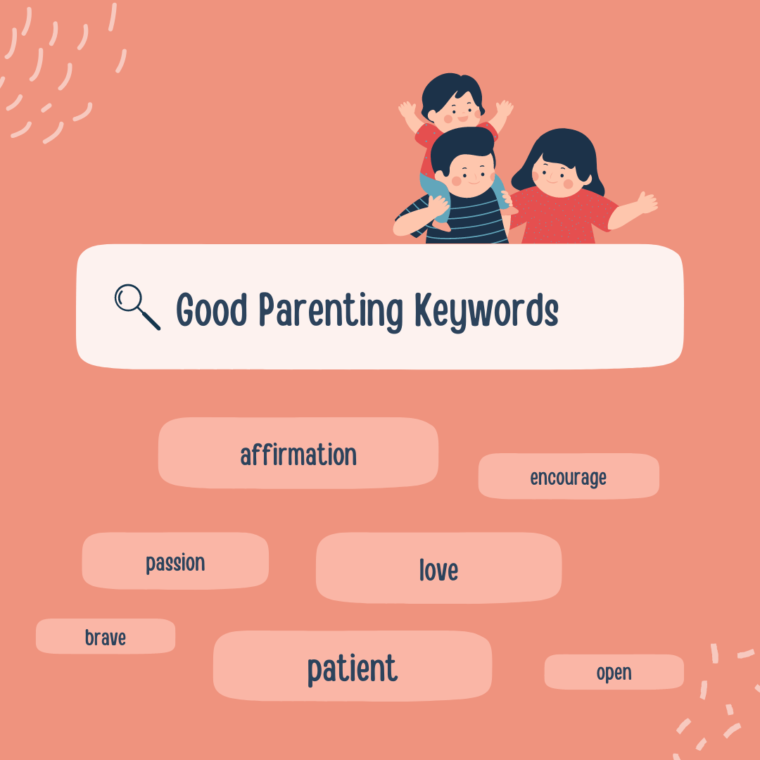
During one of my research endeavours, I found myself at a conference, engrossed in a conversation with a fellow researcher about strategies to enhance the visibility of our research papers. They shared an intriguing insight—they had collaborated with journal editors who emphasized the importance of Search Engine Optimization (SEO) in boosting research visibility.
Curiosity piqued, I delved into the world of SEO, eager to explore its potential impact on my own work. As I embarked on this journey, I discovered that SEO revolves around utilizing the right words and phrases in research papers to ensure they’re easily discoverable by search engines like Google.
Armed with newfound knowledge, I began implementing SEO techniques in my papers. The results were remarkable—my papers started appearing higher in Google searches, reaching a wider audience in the process. It became evident that increased visibility translated into more readership and potential citations for my research.
Moreover, my colleague shed light on the concept of long-tail keywords during our discussion. Long-tail keywords, consisting of longer, more specific phrases, are known to enhance search appearances by targeting niche audiences. By incorporating long-tail keywords into my papers, I further optimized their visibility and relevance in search engine results.
In essence, my journey into the realm of SEO underscored the transformative impact of digital know-how in academia. Through strategic keyword selection and SEO techniques, researchers can amplify the reach and influence of their work, paving the way for greater recognition and impact in the scholarly community.
Why Keyword Selection for a Research Paper is Crucial?
- Tips for Writing Keywords for a Research Paper
Which Words Can not be Keywords in My Research Paper?
The role of conference /journal selection in citations and scholarly impact, can i add a keyword synonym for the actual keyword, in what order i should arrange keywords alphabetically or in order of importance, can i add acronyms as keywords, where do you put keywords in a research paper, can i take insights from the keywords listed in research papers of my reference, when is the best stage in the research paper writing process to identify and finalize the keywords, introduction.
In today’s rapidly expanding digital age, researchers face the challenge of making their valuable contributions stand out amidst a vast sea of information. The visibility and discoverability of research papers play a crucial role in the dissemination of knowledge and the impact of scholarly work. To address this challenge, incorporating effective keywords becomes a vital strategy for researchers seeking to enhance their paper’s reach and influence.
Keywords serve as concise phrases or words that encapsulate the essence of a research paper, providing a quick snapshot of its content. When well-chosen and thoughtfully integrated into the paper, keywords can significantly increase citations, attract more readers, and elevate the visibility of the research in search engine results. By making a paper easily searchable, keywords enable fellow researchers to find and access relevant studies, fostering collaboration and further advancing scientific progress.
While researchers may not have direct control over the search ranking algorithms employed by platforms such as Google, they hold a powerful tool in their hands: the keyword listing section within their research papers. This section grants researchers the privilege to influence their paper’s ranking on search engines, giving them the opportunity to propel their work to the forefront of scholarly exploration.
Moreover, keywords function as invaluable filters in the vast ocean of available resources. In databases and search engines, keywords serve as crucial parameters that retrieve results based on their relevance to the search query. The more relevant keywords a paper contains, the higher its likelihood of appearing prominently in search results, enabling it to captivate the attention of readers seeking information on a specific topic.
The importance of selecting appropriate keywords cannot be overstated. These carefully chosen terms not only define the domain, subdomain, and research objective of the paper but also facilitate indexing, categorization, and targeted display of the article to researchers seeking related content. By including the right keywords, researchers can ensure their work is more easily searched, cited, and incorporated into the ongoing scholarly dialogue.
Keywords are phrases or words that sum up your research paper. They increase the number of citations you receive and make your paper searchable (and easily discoverable!). Therefore, it is crucial to incorporate domain and methodology related keywords of your research work to aid in the discovery of your paper.
For a researcher, making his/her research paper available to the research community, on the Google search engine within the first few search page results is a challenging task. The appearance of an article in search results will push the research scholars to download, refer and cite articles in their work. This will help the researcher to increase his citation counts and improve his research profile to a greater extent.
Though the researcher does not have direct control over the journal search ranking on the Google search engine in which he/she has published the paper, still he/she can make his article rank higher with one simple option. Keyword listing is one such section within a research paper, where the researcher has the privilege to push the ranking of the paper on the Google search engine.
Keywords, therefore, are vital for filtering the abundant amount of resources available. Keywords are one of the parameters used for searching an article in a database or a search engine, that in turn retrieves a bunch of results ranked according to relevancy.
The appearance of the document higher in the order is directly proportional to the number of relevant keywords used in that document. Then how to make our research paper rank higher in the search results and not be lost in the ocean of the documents stored on the net? The answer is of course choosing the right and relevant keywords.
The purpose of keywords in a research article is to help other researchers find your paper when they are conducting a search on the topic. Picking the apt keywords is crucial because these are used for indexing purposes. Well-picked keywords help your article to be more easily searched and cited.
In a research article, abstracts are usually followed by a list of keywords selected by the author. Keywords define the domain, subdomain, topic, research objective, etc. that are covered by the article. Most search engines, citation indexing databases, or journal websites refer keywords to decide where and when to display your article to the researchers who are searching for articles related to your article.
Keywords make your article easily searchable and ensure that your article gets more citations. Hence it is essential to include and select relevant keywords and filter out the large body of unwanted material.
Let us take an example to see why keywords are useful. A paper titled ” New approaches in Leaf Image processing using Machine Learning Techniques” describes, how some Machine Learning Algorithms will help in identifying the leaf spot diseases like Bacterial Blight at the earlier stage using Machine learning based Image Processing techniques.
Suitable keywords for such a paper can include the following
- Support Vector Machine, Reinforcement Learning ( From Machine Learning concepts)
- Image Segmentation, Image Clustering (From Image Processing concept)
- Leaf Spot disease names Bacterial Blight, Anthracnose etc. ( From Domain concept)
Search for any of these keywords will lead a research scholar to this paper.
Tips for Writing Keywords for a Research Paper
Here are a few tips that will help you create relevant and effective keywords for your research paper:
- Start thinking about the terms you use to search for research papers related to your topic. Possibly these are the terms used by other researchers for searching the topic of your interest. These terms can be ideal keywords for your research paper.
- Most of the time it is assumed that a keyword means a single word. However, as per the research, search engine users are becoming more specific and they have understood that a single keyword is probably going to be too broad of a search to return the articles they’re looking for. A good example is what happens when you do a search for the keyword “security”, you may be in need of articles written on network security for cloud computing but doing a quick search on Google with the keyword security gives you results as varied as articles on security article in Wikipedia, Security of nation, the Social Security number, security jobs in your local area or a recently released movie with title “security”. Using the keyword phrase “network security for cloud computing”, returns a couple of research articles about network security for cloud computing. Keywords should ideally be phrases of 2-3 words. Ideally can give single-word keywords but it may lead to many false matches. Note that actually, keywords are not simply a set of words instead they are phrases. Examples: Soft Computing for Leaf Image Analysis, Support Vector Machine for Fruit quality Identification, Neural Network for Leaf Image Extraction
- Identify the generally used alternate terms for the words written in your title. That is, include significant abbreviations, acronyms, and other short-form or substitute names for your paper. But care should be taken while using acronyms that may have other meanings. WWW would be an abbreviation since most hits would relate to the Internet. Similarly, other abbreviations like i) SVM for Support Vector Machine, ii) NN for Neural Network and iii) Soft Computing for Neural Network, Fuzzy Logic and Genetic Algorithm can be used
- Do not use words or phrases from the title as keywords. Keywords should contain a list of words that supplement your title’s content. This is because most of the search engines and journal databases use Research Title for indexing purposes. TITLE: “Leaf Image Analysis for Pathological Issues Using Soft Computing Techniques” KEYWORDS : Unsupervised Neural Networks, Leaf Spot disease Identification, Disease spot extraction using Image Processing.
- Keywords should contain words and phrases that suggest what the topic is about. Also include words and phrases that are closely related to your topic. (For example, if the paper is about Image Processing for Leaf Spot Identification and Disease Classification use words like Plant Pathology, Bacterial Blight in pomegranate, Leaf Disease spot Identification etc .
- If your research revolves around a key method or technique, make sure the term for it is located in your keyword. Example: If the method uses Multi-Spectral Camera for image capturing and processing then Keywords must contain terms like Multi-Spectral Image Analysis.
- If the paper focuses on a particular region use that as a keyword. If the paper is on Voice Analysis of Southern Indian Community for Age Identification then Keyword can be “ Southern Indian Community ” If the paper is P omegranate Leaf Spot Identification using a Support Vector Machine and if the pomegranate considered are from the Indian sub-continent then the keyword can be ” Pomegranate plant of the Indian subcontinent “.
- If your article is about developing applications, check whether potential applications, issues or phenomena can serve as keywords ( Smart City Construction, Plant Pathology, Medical Image Processing for Skin Cancer, Sensor for Tsunami ).
- The most important experimental techniques used in your article are worth considering as keywords. For example, Stereo Vision for Robot, X-ray analysis for pomegranate fruit etc .
- Some sites provide keyword generators or keyword planners to help you think of other terms you could include.
General Insights Regarding Keywords in Research Papers
- Number of keywords: Research papers typically include a list of 3-6 keywords, although some papers may have more or fewer. The specific number of keywords can vary based on the guidelines provided by the target journal or conference.
- Keyword density: There is no set rule for keyword density in research papers. The focus should be on selecting relevant and accurate keywords rather than trying to achieve a specific density. However, it’s important to include the main concepts and themes of your research in the keywords to enhance discoverability.
- Keyword variations: Including variations of keywords, such as synonyms or related terms, can improve the visibility and searchability of your research paper. This allows readers using different terminology to find your paper when searching for related topics.
- Keyword importance: While keywords are essential for search engine optimization and indexing purposes, their impact on the ranking and visibility of research papers can vary across different platforms and databases. Factors such as the relevance of the content, citation count, and journal reputation can also influence the visibility of a research paper.
- Keyword trends: Research fields and disciplines may have specific keywords or terms that gain prominence or decline over time due to emerging trends, advancements, or changes in terminology. Staying updated with the latest literature and research in your field can help you identify and incorporate relevant keywords.
- Common words: Avoid using generic and commonly used words that do not add specific value to your research topic. For example, if your research paper is about the effects of climate change on coral reefs, using words like “the,” “and,” “of,” “in,” etc., as keywords would not provide any meaningful information specific to your study.
- Very broad terms: Keywords should ideally be more specific and focused to represent the main ideas or concepts of your research. For instance, if your research paper is about the impact of social media on mental health in adolescents, using the keyword “media” would be too broad and may lead to a large number of unrelated search results. Instead, you could use keywords like “social media,” “mental health,” “adolescents,” etc., to make the search more targeted.
- Highly technical terms: While research papers often include technical terminology, using overly specialized or obscure terms as keywords may limit the discoverability of your paper. For example, if your research paper is about a new cancer treatment method, using a complex and specific scientific term that only experts in the field would understand might make it difficult for other researchers or readers to find your paper. It would be better to use more accessible keywords that convey the main concept, such as “cancer treatment,” “novel therapy,” or “medical innovation.”
- Personal pronouns: Avoid using personal pronouns like “I,” “we,” “you,” etc., as keywords. Keywords should reflect the general scope and content of your research rather than emphasizing the author’s perspective. For instance, if your research paper is about renewable energy sources, using a keyword like “my study” would be inappropriate. Instead, opt for keywords like “renewable energy,” “solar power,” “wind turbines,” etc.
- Single words without context: Selecting keywords that consist of a single word without any context or modifiers may not effectively convey the essence of your research. For example, if your research paper is about the impact of exercise on cardiovascular health, using a keyword like “exercise” on its own would be too vague. Instead, you could use keywords like “exercise benefits,” “cardiovascular health,” “physical activity effects,” etc., to provide more specific and meaningful information about your study.
Remember that the goal of choosing keywords is to accurately represent your research and increase its discoverability, so it’s important to be strategic in selecting terms that best capture the main themes and concepts of your paper.
Let me show you an example of a Research Paper with a Title, Abstract and set of possible Keywords
Title : Leaf Disease Feature Identification and Extraction Using Deep Neural Network Abstract Extraction of meaningful leaf disease features by applying image processing techniques is a problem that has been studied by the image processing community for decades. Image processing research for leaf spot disease identification has matured significantly throughout the years, and many advances in image processing techniques continue to be made, allowing new techniques to be applied to new and more demanding pathological problems. In this paper, a method for the detection and classification of leaf spot diseases affecting Pomegranate crops is developed using Deep learning Neural networks. Throughout, we have presented tables and charts to compare the performance of the proposed method with state-of-the-art techniques. Experimental results show that Deep Neural Networks handle uncertainty effectively and they can be trained with limited data sets. The paper has also made suggestions for future research directions. Keywords : Image Processing for plant pathology, diseased leaf spot extraction, leaf spot disease classification, segmentation of leaf spot disease, Machine learning for Leaf disease identification, Pomegranate leaf disease identification, Pomegranate leaf disease classification.
Please note that, sheer identification of keywords may not push your citation score. Selecting a reputable journal and avoiding predatory conferences and journals is crucial for maximizing the visibility and impact of your research article. By publishing in a respected journal, you increase the likelihood of attracting a broader and more qualified readership, thus increasing the chances of your article being cited by other researchers. Choosing the right journal involves considering factors such as the journal’s scope, target audience, impact factor, indexing in reputable databases, peer-review process, and overall reputation in the field. Additionally, it is important to stay vigilant and avoid predatory conferences and journals that may engage in unethical practices or lack rigorous peer-review processes.
These predatory outlets may hinder the credibility and recognition of your work. By carefully selecting a reputable journal, you position your research for greater exposure, credibility, and citation potential.
Visit my articles on ” How to identify and avoid predatory conferences and journals ” and “ Identifying Reputable journals for your research paper “. These articles will help you in getting your articles cited by many authors.
In the age of information overload, where research papers are easily lost in the vast sea of digital content, the strategic use of keywords emerges as a powerful tool for researchers. By carefully selecting and incorporating relevant keywords, researchers can enhance the visibility, discoverability, and impact of their scholarly work.
Frequently Asked Questions
You can certainly add keyword synonyms for the actual keywords in your research paper. Including synonyms can enhance the discoverability of your paper and improve its visibility in search engines and databases. When adding keyword synonyms, it’s advisable to place them within parentheses next to the corresponding actual keyword. Here’s an example: Keywords: apple (fruit), banana (fruit), cherry (fruit)
The order in which you arrange the keywords in your research paper depends on the specific guidelines provided by the journal or conference you are submitting to. Some publishers may require keywords to be listed in alphabetical order, while others may suggest organizing them based on their importance or relevance to the study. Therefore, it’s important to consult the submission guidelines or instructions provided by the target publication. If the guidelines don’t specify a preferred order, you have the flexibility to choose between alphabetical order and order of importance. Alphabetical order is a common and straightforward approach that allows for easy reference and searchability. However, if you believe that emphasizing the importance or relevance of certain keywords is more appropriate for your research, you can arrange them in order of importance. In such cases, you should provide a clear rationale for the chosen order of keywords, especially if it deviates from the standard alphabetical arrangement.
Yes, you can add acronyms as keywords in your research paper. Including acronyms as keywords can be useful, especially if they are commonly used or widely recognized in your field of study. However, it’s important to provide the full expansion or definition of the acronym when it is first mentioned in the paper or in the list of keywords. For example: Keywords: Artificial Intelligence (AI), Machine Learning (ML), Natural Language Processing (NLP) In this example, the acronyms “AI,” “ML,” and “NLP” are included as keywords. However, the full expansion of each acronym is provided within parentheses next to the respective acronym. This ensures that readers who may not be familiar with the acronyms can understand their meaning and context.
In a research paper, keywords are typically included after the abstract section. Abstract: Begin by including a section labelled “Keywords” or “Key Terms” immediately after the abstract. List the keywords in alphabetical order, separated by commas or semicolons.
Examining top-quality research papers in your area of work and analyzing the keywords they have listed can be a valuable approach to generate insights and identify relevant keywords for your own research paper. It can provide you with a better understanding of the terminology and keywords commonly used within your field. This method can help ensure that your paper aligns with established literature and facilitates discoverability among researchers in your domain. By reviewing keywords from well-regarded papers, you can gain insights into the specific terms and phrases that are currently prominent and influential in your field. This approach also allows you to observe how other researchers describe similar concepts, methodologies, or research areas. You can adapt and refine those keywords to suit your own study while maintaining relevance to the broader academic community. However, it’s important to note that while this method can be helpful, it should not be the sole approach for selecting keywords. It should be combined with other strategies, such as brainstorming related terms, considering your target audience, and evaluating keyword relevance. The goal is to create a comprehensive list of keywords that accurately represents your research and maximizes the chances of your paper being discovered by the intended audience.
The stage at which keywords are identified in the research paper writing process can vary. Ideally, you should start considering and identifying potential keywords during the early stages of your research project. Here’s a breakdown of the typical timeline for identifying keywords: Research planning and topic selection: When you are in the initial stages of planning your research and selecting a topic, start thinking about the main concepts and themes that define your study. These initial ideas can serve as a foundation for generating keywords later on. Literature review: As you conduct your literature review, pay attention to the keywords and terms used in existing research papers that are relevant to your topic. Note down any keywords that are commonly used and appear to be influential in your field. This process will help you gain insights into the terminology and vocabulary used by other researchers. Keyword brainstorming: Once you have a clear understanding of your research topic and have familiarized yourself with the existing literature, engage in a keyword brainstorming session. Generate a list of related terms, synonyms, phrases, and variations associated with your research area. This step will help you expand your keyword options. Refinement and finalization: After brainstorming, evaluate and refine your list of potential keywords. Consider the relevance, specificity, and popularity of each keyword. Narrow down your selection to a concise set of keywords (usually 3-6) that accurately represent your research. Incorporation into the paper: Include the finalized keywords in your research paper after the abstract and before the main body, as discussed earlier. Ensure that they are listed in a clear and easily readable format. By identifying keywords early in the research paper writing process, you can ensure that your research is appropriately categorized, discoverable, and aligned with the relevant literature in your field.
Upcoming Events
- Visit the Upcoming International Conferences at Exotic Travel Destinations with Travel Plan
- Visit for Research Internships Worldwide

Recent Posts
- These Institutes Offer Remote Research/Academic Internships
- How to Include Your Journal in the UGC-CARE List? A Guide for Publishers
- Understanding UGC CARE Journals: A Comprehensive Guide
- Top 10 AI-Based Research Paper Abstract Generators
- EditPad Research Title Generator: Is It Helpful to Create a Title for Your Research?
- All Blog Posts
- Research Career
- Research Conference
- Research Internship
- Research Journal
- Research Tools
- Uncategorized
- Research Conferences
- Research Journals
- Research Grants
- Internships
- Research Internships
- Email Templates
- Conferences
- Blog Partners
- Privacy Policy
Copyright © 2024 Research Voyage
Design by ThemesDNA.com

- SpringerLink shop
Title, Abstract and Keywords
The importance of titles.
The title of your manuscript is usually the first introduction readers (and reviewers) have to your work. Therefore, you must select a title that grabs attention, accurately describes the contents of your manuscript, and makes people want to read further.
An effective title should:
- Convey the main topics of the study
- Highlight the importance of the research
- Be concise
- Attract readers
Writing a good title for your manuscript can be challenging. First, list the topics covered by the manuscript. Try to put all of the topics together in the title using as few words as possible. A title that is too long will seem clumsy, annoy readers, and probably not meet journal requirements.
Does Vaccinating Children and Adolescents with Inactivated Influenza Virus Inhibit the Spread of Influenza in Unimmunized Residents of Rural Communities?
This title has too many unnecessary words.
Influenza Vaccination of Children: A Randomized Trial
This title doesn’t give enough information about what makes the manuscript interesting.
Effect of Child Influenza Vaccination on Infection Rates in Rural Communities: A Randomized Trial This is an effective title. It is short, easy to understand, and conveys the important aspects of the research.
Think about why your research will be of interest to other scientists. This should be related to the reason you decided to study the topic. If your title makes this clear, it will likely attract more readers to your manuscript. TIP: Write down a few possible titles, and then select the best to refine further. Ask your colleagues their opinion. Spending the time needed to do this will result in a better title.
Abstract and Keywords
The Abstract is:
- A summary of the content of the journal manuscript
- A time-saving shortcut for busy researchers
- A guide to the most important parts of your manuscript’s written content
Many readers will only read the Abstract of your manuscript. Therefore, it has to be able to stand alone . In most cases the abstract is the only part of your article that appears in indexing databases such as Web of Science or PubMed and so will be the most accessed part of your article; making a good impression will encourage researchers to read your full paper.
A well written abstract can also help speed up the peer-review process. During peer review, referees are usually only sent the abstract when invited to review the paper. Therefore, the abstract needs to contain enough information about the paper to allow referees to make a judgement as to whether they have enough expertise to review the paper and be engaging enough for them to want to review it.
Your Abstract should answer these questions about your manuscript:
- What was done?
- Why did you do it?
- What did you find?
- Why are these findings useful and important?
Answering these questions lets readers know the most important points about your study, and helps them decide whether they want to read the rest of the paper. Make sure you follow the proper journal manuscript formatting guidelines when preparing your abstract.
TIP: Journals often set a maximum word count for Abstracts, often 250 words, and no citations. This is to ensure that the full Abstract appears in indexing services.
Keywords are a tool to help indexers and search engines find relevant papers. If database search engines can find your journal manuscript, readers will be able to find it too. This will increase the number of people reading your manuscript, and likely lead to more citations.
However, to be effective, Keywords must be chosen carefully. They should:
- Represent the content of your manuscript
- Be specific to your field or sub-field
Manuscript title: Direct observation of nonlinear optics in an isolated carbon nanotube
Poor keywords: molecule, optics, lasers, energy lifetime
Better keywords: single-molecule interaction, Kerr effect, carbon nanotubes, energy level structure
Manuscript title: Region-specific neuronal degeneration after okadaic acid administration Poor keywords: neuron, brain, OA (an abbreviation), regional-specific neuronal degeneration, signaling
Better keywords: neurodegenerative diseases; CA1 region, hippocampal; okadaic acid; neurotoxins; MAP kinase signaling system; cell death
Manuscript title: Increases in levels of sediment transport at former glacial-interglacial transitions
Poor keywords: climate change, erosion, plant effects Better keywords: quaternary climate change, soil erosion, bioturbation
Back │ Next
How to Generate Search Terms
Create a research topic.
Enter your research topic below. Try to limit the topic to one sentence that fully describes your research. Here are a few examples:
- Effects of media on women's body image
- Trends in information technology in the workplace
- Fast food causes health risks for children
Keywords in a Research Paper: The Importance of the Right Choice
Unlock the potential of your research paper by using keywords! Learn how to effectively use keywords in a research paper and make an impact.
If you are writing a research paper, you are likely familiar with the importance of a well-written title and an engaging abstract. However, have you ever considered the impact that keywords can have on the visibility and discoverability of your research paper? In this blog post, we will discuss the importance of research paper keywords and provide you with some tips on how to choose the right ones for your paper.
What are Research Paper Keywords?
Keywords are words or phrases that represent the main topics or ideas presented in a research paper. They help readers and search engines quickly identify the content of the paper and assess its relevance to their interests.
In many cases, keywords are included in the paper’s abstract, but they can also be listed separately in the paper’s metadata. These metadata keywords are often used by search engines to index and rank research papers in search results.
Importance of Keywords in a Research Paper
The selection of appropriate keywords is crucial to ensuring the visibility and discoverability of your research paper. By using the right keywords, you can attract the attention of readers who are interested in your research topic and increase the likelihood that your paper will be cited and shared.
Keywords can also impact the ranking of your paper in search results. If you choose popular or commonly used keywords, your paper may be buried among a large number of other papers on the same topic. However, if you choose unique, specific, and accurate keywords, your paper will have a better chance of ranking higher in search results.
How to Choose the Right Keywords in a Research Paper
Choosing the right keywords for your research paper requires careful consideration and attention to detail. Here are some tips to help you choose the most effective keywords for your paper:
Follow any instructions your target journal provides regarding keywords
Different journals may have different requirements for the number and type of keywords. Be sure to check the author guidelines for your target journal and follow their instructions regarding keywords.
Think about what terms you would use to search for papers related to your topic
Put yourself in the shoes of someone who is searching for papers on your topic. What terms would they use? What are the main ideas or concepts in your paper? Use these terms as keywords.
Avoid using terms already present in your research paper’s title
Using the same terms in both the title and keywords can be redundant and waste valuable keyword space. Instead, try to use related terms that expand on the main ideas of your paper.
If your research involves a key method or technique, put the term either in your title or your keywords
Including the name of a key method or technique can make your paper more discoverable to researchers interested in that method or technique.
Think of generally used alternate terms to the ones found in your title
Different researchers may use different terms to describe the same concepts. Try to include commonly used alternate terms as keywords to make your paper more discoverable.
Test your keywords before submitting your paper
Before finalizing your keywords, test them by entering them into a search engine to see what results come up. Make sure the results are relevant to your paper and that your paper is visible among them.
Use keyword generators with caution
There are many online tools that generate keywords for research papers. While these tools can be helpful, they should be used with caution. Always evaluate the suggested keywords for relevance and accuracy before using them in your paper.
Best Practices for Using Keywords in a Research Paper
In the competitive world of academia, research papers are the currency of success. But with so many papers being published every day, how can you make sure yours stands out? One crucial aspect is choosing the right research paper keywords.
Keywords are words or phrases that summarize the main themes and topics of your paper. They help search engines and databases categorize and index your work, making it easier for others to find and cite. Do you know how to choose the right keywords for your research paper? In addition, what are the best practices for using them effectively?

Include relevant keywords throughout the paper
Keywords should not only be present in your paper’s title and abstract but throughout the body of the text. This helps to reinforce the main themes and concepts of your work and improves its visibility in search results.
Be specific and concise when choosing keywords
Choose keywords that accurately reflect the specific topics and themes of your research paper. Avoid broad or generic terms that could be applied to a variety of different topics.
Choose keywords that accurately reflect the content of the paper
Keywords should be a true representation of the content of your research paper. If you use misleading or inaccurate keywords, you risk misleading readers and damaging your credibility.
Include synonyms and related terms when possible
Including synonyms and related terms can broaden the scope of your paper and help it reach a wider audience. It can also improve its ranking in search results.
Tools for Generating Keywords for Research Papers
There are several tools available for generating keywords for your research paper. These include:
- Google Keyword Planner – a free tool from Google that helps you find relevant keywords and phrases for your research paper.
- Keyword Tool – another free tool that generates keywords based on search queries from various search engines.
- Mendeley – a research management tool that automatically extracts keywords from your research papers and suggests additional keywords based on the content.
Over 75,000 Accurate Scientific Figures to Boost Your Impact
Mind the Graph is a comprehensive scientific communication platform that offers a range of tools to help researchers create and share high-impact research papers. One of its key features is its extensive library of over 75,000 scientific figures, graphics, and illustrations.
These figures are designed to be easily customizable and can be used to enhance the visual appeal of your research paper. They cover a wide range of topics, including biology, chemistry, physics, and medicine, and are constantly updated to reflect the latest research findings.
In addition to its figures library, Mind the Graph also offers a range of other tools and resources for researchers, including customizable templates for research posters, social media graphics, and presentations. It also provides a range of tutorials and guides on scientific communication and data visualization.

Subscribe to our newsletter
Exclusive high quality content about effective visual communication in science.
Unlock Your Creativity
Create infographics, presentations and other scientifically-accurate designs without hassle — absolutely free for 7 days!
Content tags

How to Write a Research Paper
- Formulate Questions/Thesis
- Identify Keywords
- Find Background Info
- Search Strategies
- Dissertations
- Proceedings
- Statistics This link opens in a new window
- Primary | Secondary
- Scholarly | General This link opens in a new window
- Creative Commons
- Cite This link opens in a new window
- Quote, Paraphrase, Summarize
Generate Keywords
- Keyword Generator University of Texas. Tutorial that walks you through generating keywords.

Image source: Powernowllc. CC0 1.0. Wikimedia Commons.
What Are Keywords?
Keywords are important words/concepts found in your research question or thesis.
A quick and dirty way to pull keywords from a research question/thesis is to choose the most important nouns ; all other words are irrelevant.
Using keywords to search will always retrieve more results than phrases or sentences.
Image source: Producer. CC BY-SA 3.0. Wikimedia Commons
Find Keywords

- within your research question or thesis
- in encyclopedias used in background research
- in bibliographies found at the end of books and articles
- in a thesaurus (or in Word's thesaurus under the Review tab)
- by asking a librarian
Image source: Evan-Amos . Public Domain. Wikimedia Commons.
Chart Keywords
- Keyword Chart

Keywords have a profound impact on search results. Using the right words will speed up the research process, while the wrong ones can bring to it to a painfully screeching halt.
If the keywords you initially choose do not give good results, try others on your list, try search strategies , or ask a librarian for help.
Use the chart above to document keywords related to your topic. Keep it by your side when you start your research.
- << Previous: Formulate Questions/Thesis
- Next: Find Background Info >>
- Last Updated: Apr 11, 2024 11:23 AM
- URL: https://libguides.lvc.edu/researchpaper
The 4 best free keyword research tools in 2024

There's no shortage of tools purpose-built for keyword research (literally hundreds of them), and they run the gamut from beginner-focused to highly advanced. They also range from totally basic and unhelpful to super valuable.
When done right, the best keyword research tools simplify and streamline your workflow—they make it easier to find the right keywords to target and give you the data you need to actually rank for them. But they shouldn't require you to empty out your bank account and sell your first-born child in order to access that data.
After years of working with multiple clients who use all different tools for keyword research and SEO content optimization, I've seen the best (and the worst) of them—and I know how important it is to choose the right keyword planner tool. To help, I considered over 80 tools with a free option for keyword research. After in-depth testing, here are the four best free keyword research tools, including the all-around greats and apps built for more specific use cases.
The best free keyword research tools
What makes the best keyword research tool, how we evaluate and test apps.
The features that make for a great keyword research tool are pretty straightforward: you search for a given keyword, and the tool tells you about it. But there are so many different ways to use keyword data, so I wanted to find tools that could handle a variety of use cases, along with a few designed for some of the most popular uses for keyword research.
During testing, I looked primarily at the factors below to determine which apps made the initial list.
Keyword optimization guidance. You shouldn't have to be a 10-year SEO industry veteran to use keyword research tools—the best tools offer simple, straightforward suggestions to optimize for your keywords. There are tools (like Ahrefs, Semrush, and Moz) that do complete SEO analysis on your site, checking for everything from site speed and technical details to domain authority and topic clusters. That's not what we're looking for here. We're looking for tools that any business owner or marketer can use to quickly understand their target keyword and optimize their site to rank for it.
Free plan allowances and upgrades. Some tools include super limited results for free and call it a "free plan." Or they put time limits on the free plan, effectively making it more of a trial. I only included tools with evergreen free plans generous enough to actually be useful—and they won't break the bank when it's time to upgrade, either. One of my favorite tools from last year, Ahrefs, didn't make the cut this year because its keyword research tools are no longer free.
To find the best of the best, I put each tool that checked those boxes to the test by running through an in-depth protocol. Here's what my testing workflow looked like:
If needed, I created an account and went through any provided onboarding or guided tutorials (many of these free apps don't require account creation or provide any onboarding).
I checked which related keywords, metrics, and other data were offered. I also made note of the source, whether information was pulled from Google, included non-search engine websites (like social media or forums), or was drawn from the tool's own native data.
I verified allowances for the free plan—whether limited by time, number of results, metrics included, searches per day or month, or something else—and the cost to upgrade to a paid plan if needed.
Where available, I tested out additional keyword research tools like competitive gap analysis, content optimization features, and more.
After spending over a dozen hours with these apps this year, I landed on the four best keyword research tools—each with a manageable free version—below.
The best free keyword research tools at a glance
The best free keyword research tool overall, .css-yjptlz-link{all:unset;box-sizing:border-box;-webkit-text-decoration:underline;text-decoration:underline;cursor:pointer;-webkit-transition:all 300ms ease-in-out;transition:all 300ms ease-in-out;outline-offset:1px;-webkit-text-fill-color:currentcolor;outline:1px solid transparent;}.css-yjptlz-link[data-color='ocean']{color:#3d4592;}.css-yjptlz-link[data-color='ocean']:hover{color:#2b2358;}.css-yjptlz-link[data-color='ocean']:focus{color:#3d4592;outline-color:#3d4592;}.css-yjptlz-link[data-color='white']{color:#fffdf9;}.css-yjptlz-link[data-color='white']:hover{color:#a8a5a0;}.css-yjptlz-link[data-color='white']:focus{color:#fffdf9;outline-color:#fffdf9;}.css-yjptlz-link[data-color='primary']{color:#3d4592;}.css-yjptlz-link[data-color='primary']:hover{color:#2b2358;}.css-yjptlz-link[data-color='primary']:focus{color:#3d4592;outline-color:#3d4592;}.css-yjptlz-link[data-color='secondary']{color:#fffdf9;}.css-yjptlz-link[data-color='secondary']:hover{color:#a8a5a0;}.css-yjptlz-link[data-color='secondary']:focus{color:#fffdf9;outline-color:#fffdf9;}.css-yjptlz-link[data-weight='inherit']{font-weight:inherit;}.css-yjptlz-link[data-weight='normal']{font-weight:400;}.css-yjptlz-link[data-weight='bold']{font-weight:700;} moz keyword explorer (web).
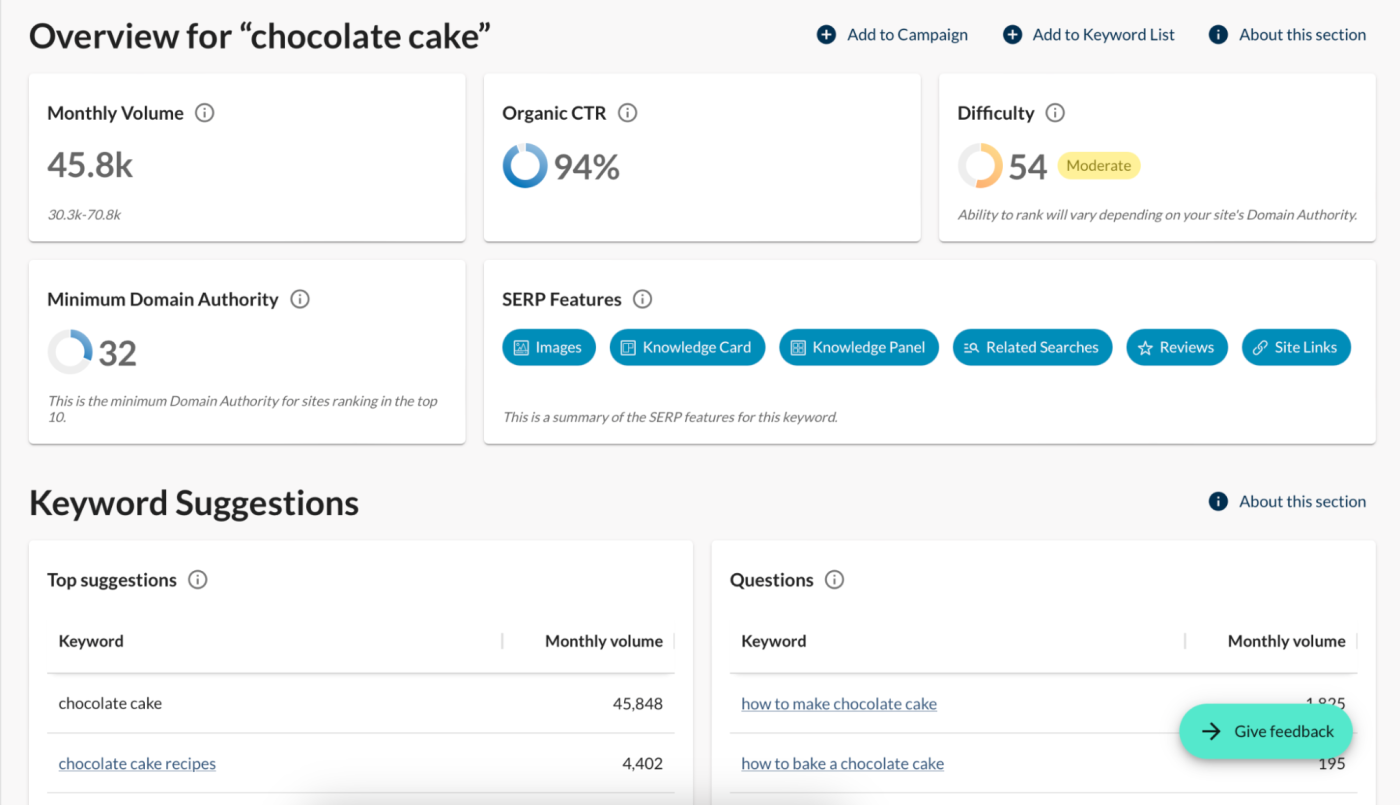
More approachable data presentation than many other tools
Straightforward prioritization metrics
Broad set of tools available for free
Less data than more robust tools
Free plan only includes 10 queries per tool per month
With the Keyword Explorer tool, you can search any keyword you choose and see its monthly volume, difficulty, and organic clickthrough rate (CTR). Scroll down from there to see an analysis of current results ranking for it and suggestions for similar keywords.
Metrics like straightforward keyword difficulty and minimum domain authority make it easy to prioritize the keywords you have the best chance to rank for—and avoid wasting your time on out-of-reach queries.
Plus, with the Keyword Gap feature (part of the Competitive Research tool), you can find all the keywords your competitors rank for that you don't.
The best free keyword research tool for paid keywords
.css-yjptlz-link{all:unset;box-sizing:border-box;-webkit-text-decoration:underline;text-decoration:underline;cursor:pointer;-webkit-transition:all 300ms ease-in-out;transition:all 300ms ease-in-out;outline-offset:1px;-webkit-text-fill-color:currentcolor;outline:1px solid transparent;}.css-yjptlz-link[data-color='ocean']{color:#3d4592;}.css-yjptlz-link[data-color='ocean']:hover{color:#2b2358;}.css-yjptlz-link[data-color='ocean']:focus{color:#3d4592;outline-color:#3d4592;}.css-yjptlz-link[data-color='white']{color:#fffdf9;}.css-yjptlz-link[data-color='white']:hover{color:#a8a5a0;}.css-yjptlz-link[data-color='white']:focus{color:#fffdf9;outline-color:#fffdf9;}.css-yjptlz-link[data-color='primary']{color:#3d4592;}.css-yjptlz-link[data-color='primary']:hover{color:#2b2358;}.css-yjptlz-link[data-color='primary']:focus{color:#3d4592;outline-color:#3d4592;}.css-yjptlz-link[data-color='secondary']{color:#fffdf9;}.css-yjptlz-link[data-color='secondary']:hover{color:#a8a5a0;}.css-yjptlz-link[data-color='secondary']:focus{color:#fffdf9;outline-color:#fffdf9;}.css-yjptlz-link[data-weight='inherit']{font-weight:inherit;}.css-yjptlz-link[data-weight='normal']{font-weight:400;}.css-yjptlz-link[data-weight='bold']{font-weight:700;} google keyword planner (web).
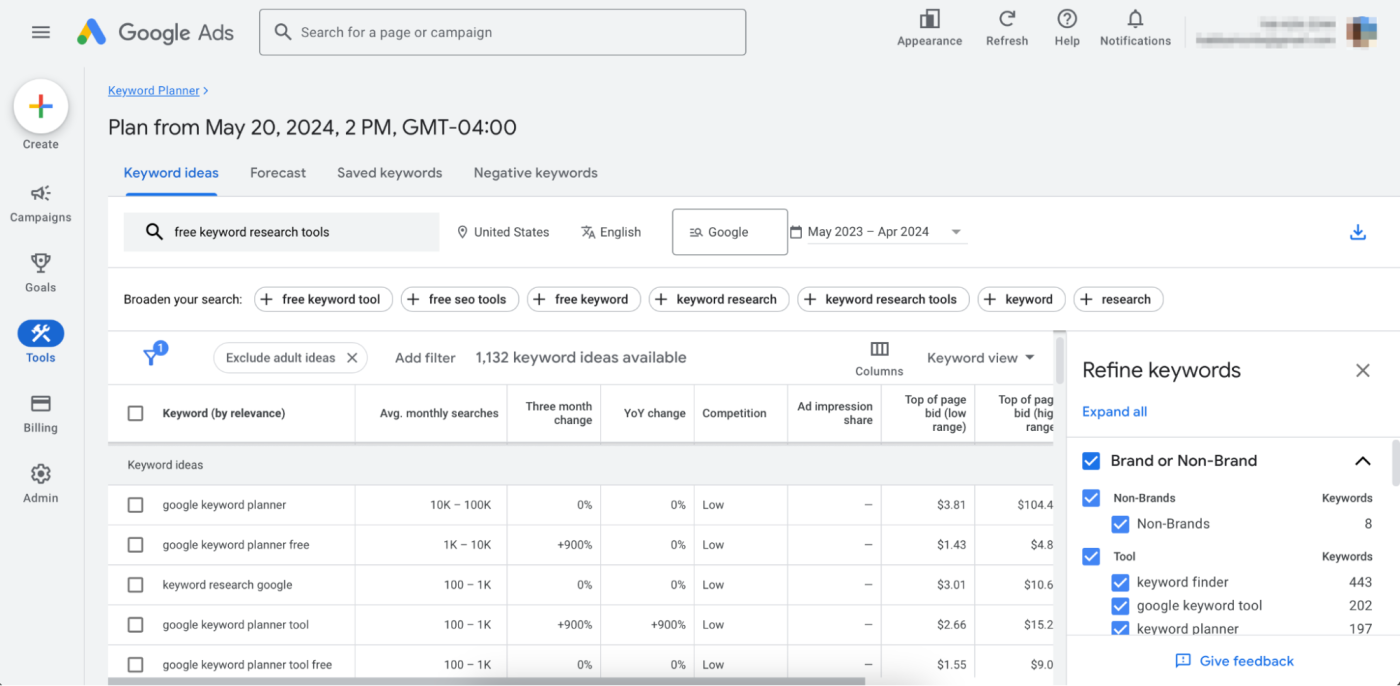
Google Keyword Planner pros:
Completely free forever, even if you don't use Google Ads
Helpful forecasting features for budgeting if you do use Google Ads
Can pull keyword suggestions from just your website
Google Keyword Planner cons:
Not helpful for organic keyword research
Google Keyword Planner includes two main features: one for exploratory keyword research and discovery and another for more in-depth research on search volume and forecasting.
The "Keyword ideas" feature is similar to many of the tools on this list: you search for a seed term, and it generates other keyword ideas, along with details on monthly search volume, change over time, competition, ad impression share, and bid ranges. You can refine your keyword list by brand or non-brand keywords, source website, and more. If you're also using Google Ads, the "Forecast" feature makes it easier to plan ahead for your paid ads and budget in advance.
Keyword Planner can inform your organic strategy, too, by showing you where ranking organically may help you save on PPC costs.
Google Keyword Planner pricing: Free
The best free keyword research tool for advanced SEO
.css-yjptlz-link{all:unset;box-sizing:border-box;-webkit-text-decoration:underline;text-decoration:underline;cursor:pointer;-webkit-transition:all 300ms ease-in-out;transition:all 300ms ease-in-out;outline-offset:1px;-webkit-text-fill-color:currentcolor;outline:1px solid transparent;}.css-yjptlz-link[data-color='ocean']{color:#3d4592;}.css-yjptlz-link[data-color='ocean']:hover{color:#2b2358;}.css-yjptlz-link[data-color='ocean']:focus{color:#3d4592;outline-color:#3d4592;}.css-yjptlz-link[data-color='white']{color:#fffdf9;}.css-yjptlz-link[data-color='white']:hover{color:#a8a5a0;}.css-yjptlz-link[data-color='white']:focus{color:#fffdf9;outline-color:#fffdf9;}.css-yjptlz-link[data-color='primary']{color:#3d4592;}.css-yjptlz-link[data-color='primary']:hover{color:#2b2358;}.css-yjptlz-link[data-color='primary']:focus{color:#3d4592;outline-color:#3d4592;}.css-yjptlz-link[data-color='secondary']{color:#fffdf9;}.css-yjptlz-link[data-color='secondary']:hover{color:#a8a5a0;}.css-yjptlz-link[data-color='secondary']:focus{color:#fffdf9;outline-color:#fffdf9;}.css-yjptlz-link[data-weight='inherit']{font-weight:inherit;}.css-yjptlz-link[data-weight='normal']{font-weight:400;}.css-yjptlz-link[data-weight='bold']{font-weight:700;} semrush (web).
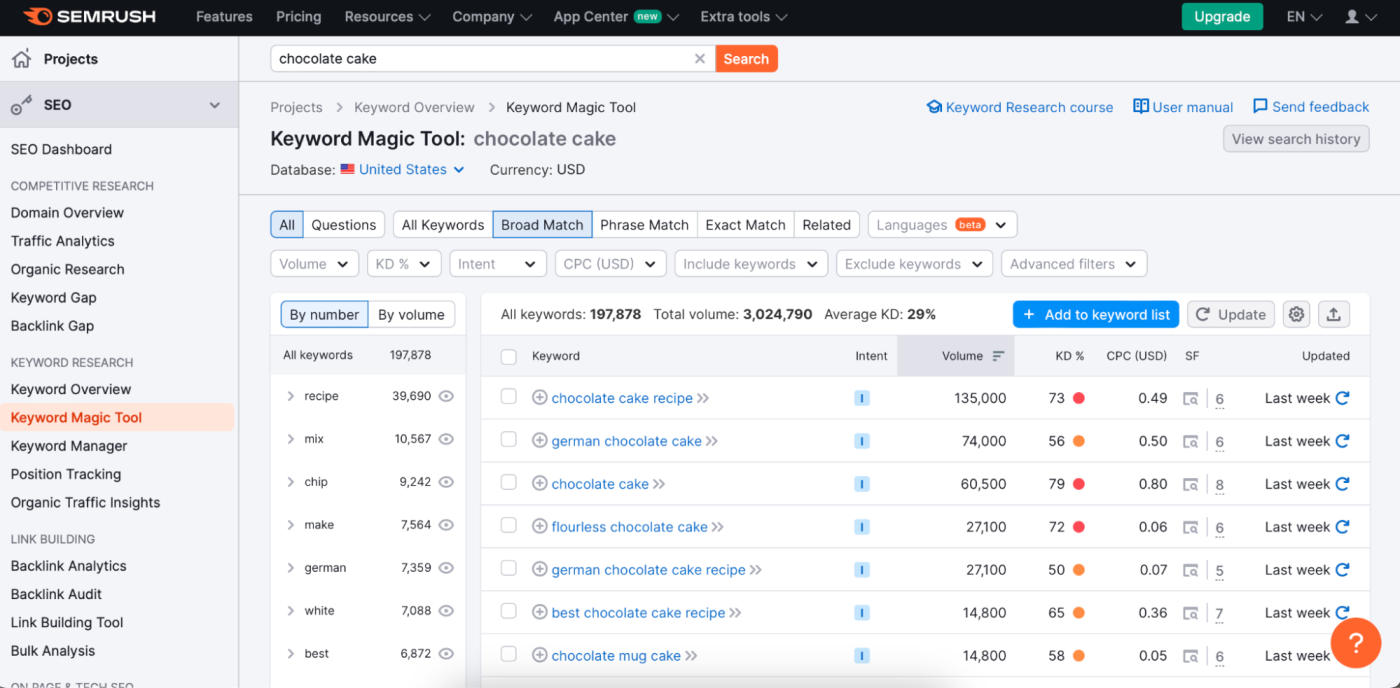
Semrush pros:
Tons of granular keyword data
Wide range of specialized keyword research tools
Pretty generous free plan
Semrush cons:
Can be overwhelming for those less experienced with keyword research
Most expensive upgrade
If you're looking for something more advanced, Semrush shares a ton of keyword data and makes it easy to dig into the details, like SERP features (featured snippet, reviews, site links, image pack, and so on) and granular analysis of current results. Semrush offers a broad range of keyword research tools, too, from the standard traffic and search volume data to content-driven keyword research and competitive keyword gap analysis.
That range is what really sets Semrush apart, including the standard Keyword Overview, the Keyword Magic Tool for exploratory keyword research, a Keyword Manager and position tracking, competitive Keyword Gap analysis, and Organic Traffic Insights, which—when connected with your Google Analytics or Search Console account—can uncover those famously tricky "not provided" keywords.
As an added bonus, the SEO Content Template tool lets you automatically create a content brief and optimize content as you write by grading your content in real-time for readability, originality, tone of voice, and SEO: it uses a handy bullseye graphic to help you strike the right balance. Plus, the tool visually checks off SEO recommendations (like using your target and related keywords and adding relevant links and images) as you go.
All of this means that upgrading will cost you a pretty penny—but you can use it for free at low volumes to start.
Create new Asana tasks from SEMrush's new site audit campaign tasks
Create Notion database items for new SEMrush Site Audit tasks.
Send Slack channel messages for completed SEMrush site audits
The best simple and free keyword research tool
.css-yjptlz-link{all:unset;box-sizing:border-box;-webkit-text-decoration:underline;text-decoration:underline;cursor:pointer;-webkit-transition:all 300ms ease-in-out;transition:all 300ms ease-in-out;outline-offset:1px;-webkit-text-fill-color:currentcolor;outline:1px solid transparent;}.css-yjptlz-link[data-color='ocean']{color:#3d4592;}.css-yjptlz-link[data-color='ocean']:hover{color:#2b2358;}.css-yjptlz-link[data-color='ocean']:focus{color:#3d4592;outline-color:#3d4592;}.css-yjptlz-link[data-color='white']{color:#fffdf9;}.css-yjptlz-link[data-color='white']:hover{color:#a8a5a0;}.css-yjptlz-link[data-color='white']:focus{color:#fffdf9;outline-color:#fffdf9;}.css-yjptlz-link[data-color='primary']{color:#3d4592;}.css-yjptlz-link[data-color='primary']:hover{color:#2b2358;}.css-yjptlz-link[data-color='primary']:focus{color:#3d4592;outline-color:#3d4592;}.css-yjptlz-link[data-color='secondary']{color:#fffdf9;}.css-yjptlz-link[data-color='secondary']:hover{color:#a8a5a0;}.css-yjptlz-link[data-color='secondary']:focus{color:#fffdf9;outline-color:#fffdf9;}.css-yjptlz-link[data-weight='inherit']{font-weight:inherit;}.css-yjptlz-link[data-weight='normal']{font-weight:400;}.css-yjptlz-link[data-weight='bold']{font-weight:700;} free keyword research tool (web).
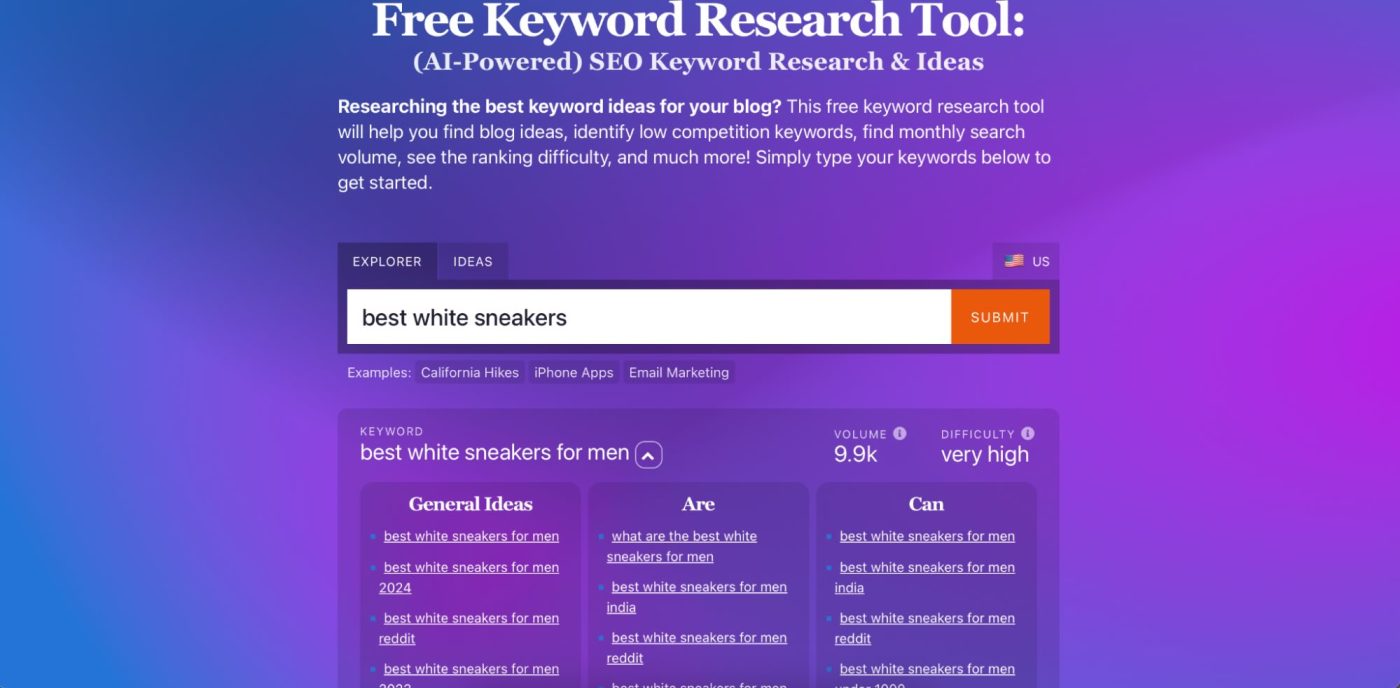
Free Keyword Research Tool pros:
Simple, straightforward report
Unique suggested content angles
Free Keyword Research Tool cons:
Very basic data
No built-in way to save your research
If you're looking for a straightforward tool to give you basic data on keywords, Ryan Robinson's Free Keyword Research Tool is a super simple option.
The Explorer tab pulls up related queries for any keyword you search, along with ballpark search volume numbers and a keyword difficulty characterization from "low" to "very high." My favorite feature here is the suggested angles you can use to build content. Tab over to the Ideas tab (or click the lightbulb icon on any of the related keywords) to see suggested long-form versions of the keyword that can help inform your content angle.
That's… pretty much all there is here. You can't get a ton of data from this tool—and there's no upgrade option for when you're ready to financially invest in your search strategy. But if basic keyword research is all you really need, it's worth a look.
Free Keyword Research Tool pricing: 100% free
Can you use AI chatbots for keyword research?
The main benefit of going the AI route is simplicity. You can ask for straightforward, simplified results and get a simple, streamlined answer.
Here's Gemini, for example.
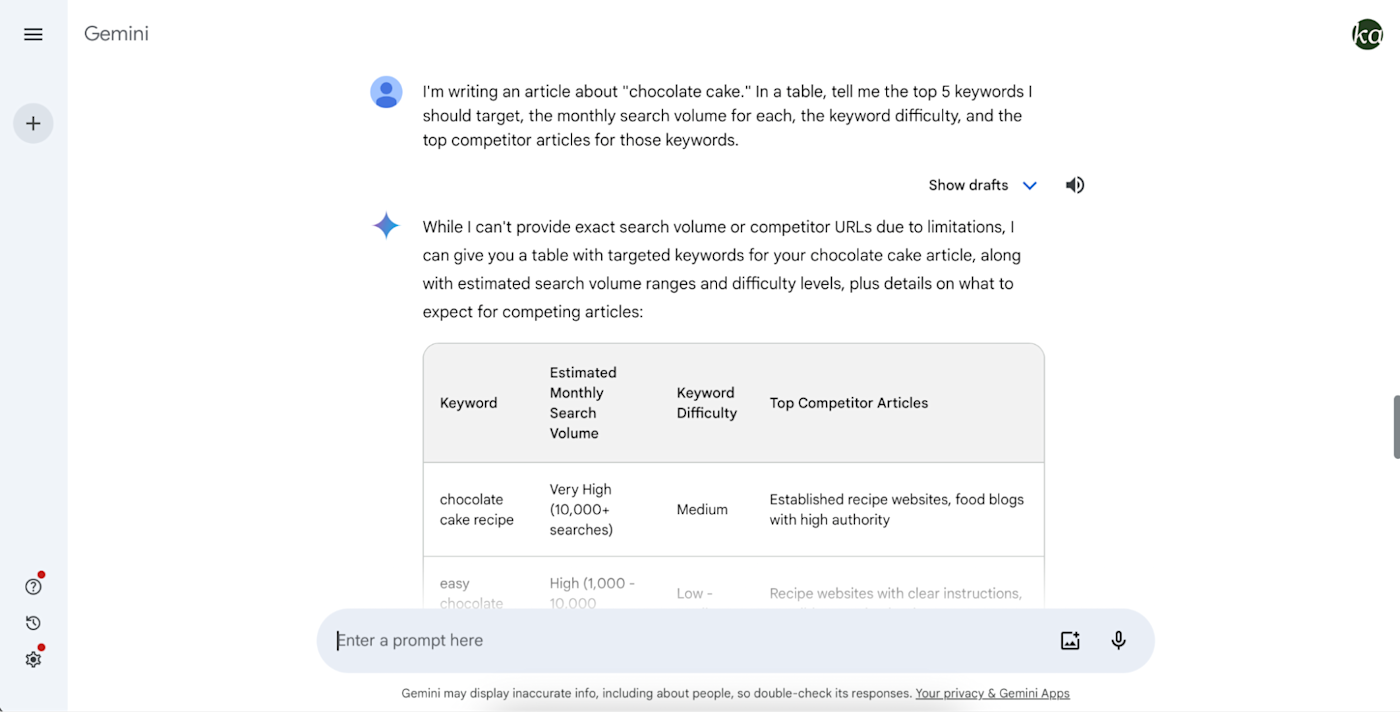
And here's ChatGPT.
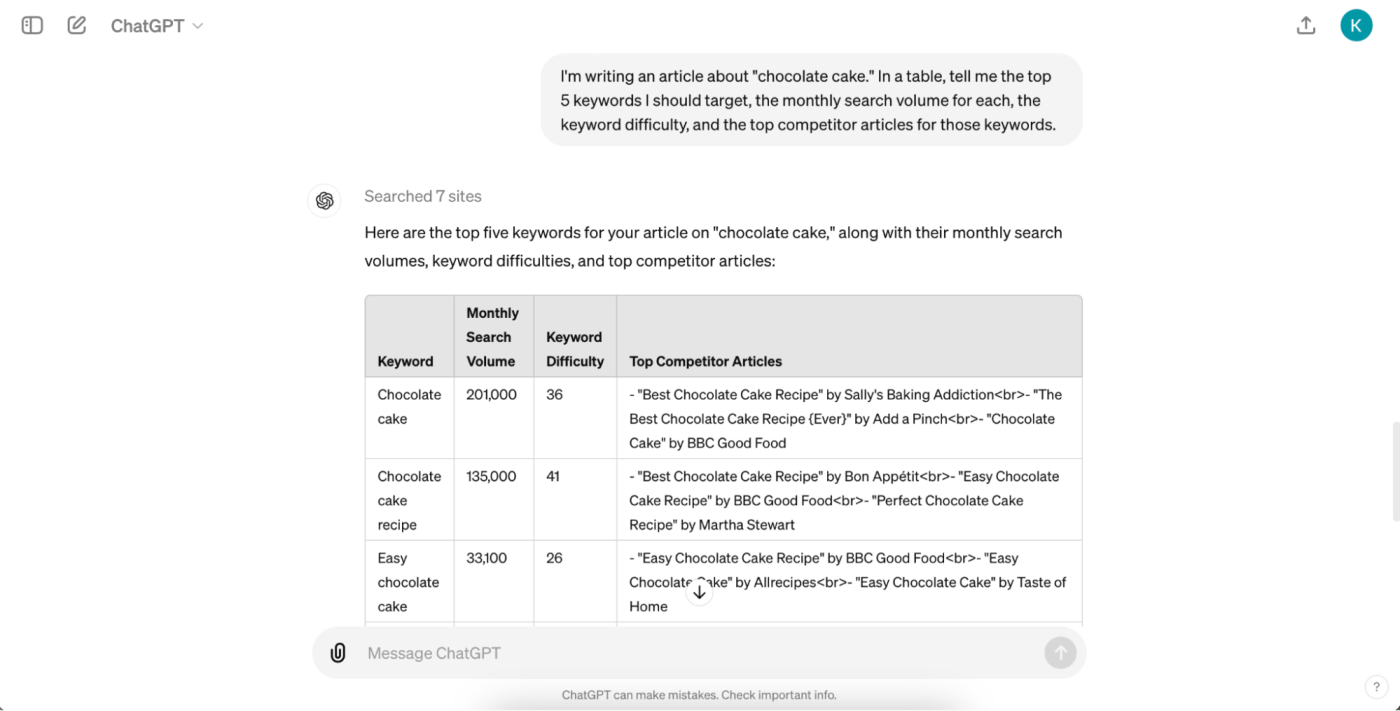
ChatGPT was more upfront about the sources it used (in the screenshot above, for example, you could click on "Searched 7 sites" to see the specific websites the chatbot referenced). But it also offered search volume numbers—which seems impressive, if it weren't for the fact that I know it's making it up. ChatGPT isn't able to read real-time data (it'll even admit this itself if you ask). Gemini was more transparent: it told me it couldn't pull precise monthly search volume numbers (it's not even connected to Google Keyword Planner), and it only told me the type of content it expects to rank for that keyword—not the actual content that's currently ranking.
I'll admit, both ChatGPT and Gemini have improved a lot since last year, especially when it comes to more complex prompts. That said, the information they provided still falls short of the utility you get from a tool that's actually designed for keyword research. For now, at least.
If you're in a bind and need simplified, bottom line-style information on a keyword quickly, an AI chatbot may be of some help. But as of today, I wouldn't recommend using AI chatbot as your primary keyword research tool—especially given the number of truly helpful dedicated free keyword research tools you can use instead.
Of course, lots of dedicated SEO tools (though usually not the free ones), will have AI built in—that's the best of both worlds.
When should you upgrade from a free keyword research tool?
The short answer is: only when you need to. If you can get all the data you need without going over the allowances of one of the free plans above, there's no reason to upgrade to a paid plan (or switch to a fully paid tool).
With that said, here are a few signs it may be time to consider upgrading:
You're regularly hitting the monthly or daily search limits of your current solution.
You're missing out on features you can't get for free, like content optimization guidance or the ability to track your site's keywords and rankings over time.
You need additional SEO features that an upgraded all-in-one tool can provide (like technical SEO, site auditing, etc).
When the time comes, some of the tools on this list can grow right along with you. Moz Pro is a super robust tool, for example, as is Semrush. There are also a number of popular tools with affordable starting plans, including GetKeywords, KWFinder, and Topic Ranker.
Here are Zapier's lists of helpful SEO tools to get you started:
Related reading:
This article was originally published in June 2021. The most recent update was in May 2024.
Get productivity tips delivered straight to your inbox
We’ll email you 1-3 times per week—and never share your information.
Kiera Abbamonte
Kiera’s a content writer who helps SaaS and eCommerce companies connect with customers and reach new audiences. Located in Boston, MA, she loves cinnamon coffee and a good baseball game. Catch up with her on Twitter @Kieraabbamonte.
Related articles

The 6 best news apps in 2024

The best free graphic design software to create social media posts in 2024
The best free graphic design software to...

The 9 best pay-per-click (PPC) tools to optimize your ad spend in 2024
The 9 best pay-per-click (PPC) tools to...

The 5 best team chat apps for business in 2024
The 5 best team chat apps for business in...
Improve your productivity automatically. Use Zapier to get your apps working together.

Find Keyword Ideas in Seconds
Boost SEO results with powerful keyword research
Keyword Research: The Definitive Guide
Written by Brian Dean
Today I’m going to show you exactly how to do keyword research in 2024.
In this comprehensive guide I’ll cover:
- How to find keywords
- How to choose the right keywords
- How to use popular keyword research tools
- Advanced keyword research tips
So if you want higher Google rankings and more traffic, you’ll love this guide.
Let’s get started.

1. Keyword Research Basics

2. How to Find Keyword Ideas + Template

3. Keyword Research Tools

4. Keyword Difficulty

5. How to Choose a Keyword

6. Advanced Tips and Strategies
Chapter 1: keyword research basics.

In this chapter, I’ll cover the fundamentals of keyword research.
First, you’ll practically learn what keyword research is (and why it’s important for SEO ).
I’ll also show you how keyword research helped grow my site’s search engine traffic to 360k+ unique visitors per month.
What is Keyword Research?
Keyword research is the process of identifying and analyzing the specific words and phrases that people use to search for information online. This valuable insight helps you create content, ads, and videos that directly address your target audience’s search queries, enhancing your website’s visibility and attracting more visitors.

Try the FREE Backlinko Keyword Research Tool . Discover new keywords and performance data to use in your site content, SEO campaigns, and more.
Why is Keyword Research Important for SEO?
Keyword research impacts every other SEO task that you perform, including finding content topics, on-page SEO , email outreach , and content promotion.

That’s why keyword research is usually the first step of any SEO campaign .
Put another way:
Keywords are like a compass for your SEO campaigns: they tell you where to go and whether or not you’re making progress.
As a bonus, researching keywords help you better understand your target audience. That’s because keyword research gives you insight into what customers are searching for… and the exact words and phrases that they use.
In other words: keyword research is market research for the 21st century.
How Keyword Research Helped My Site’s Traffic Grow
Today, my site generates 449,058 visitors every month:
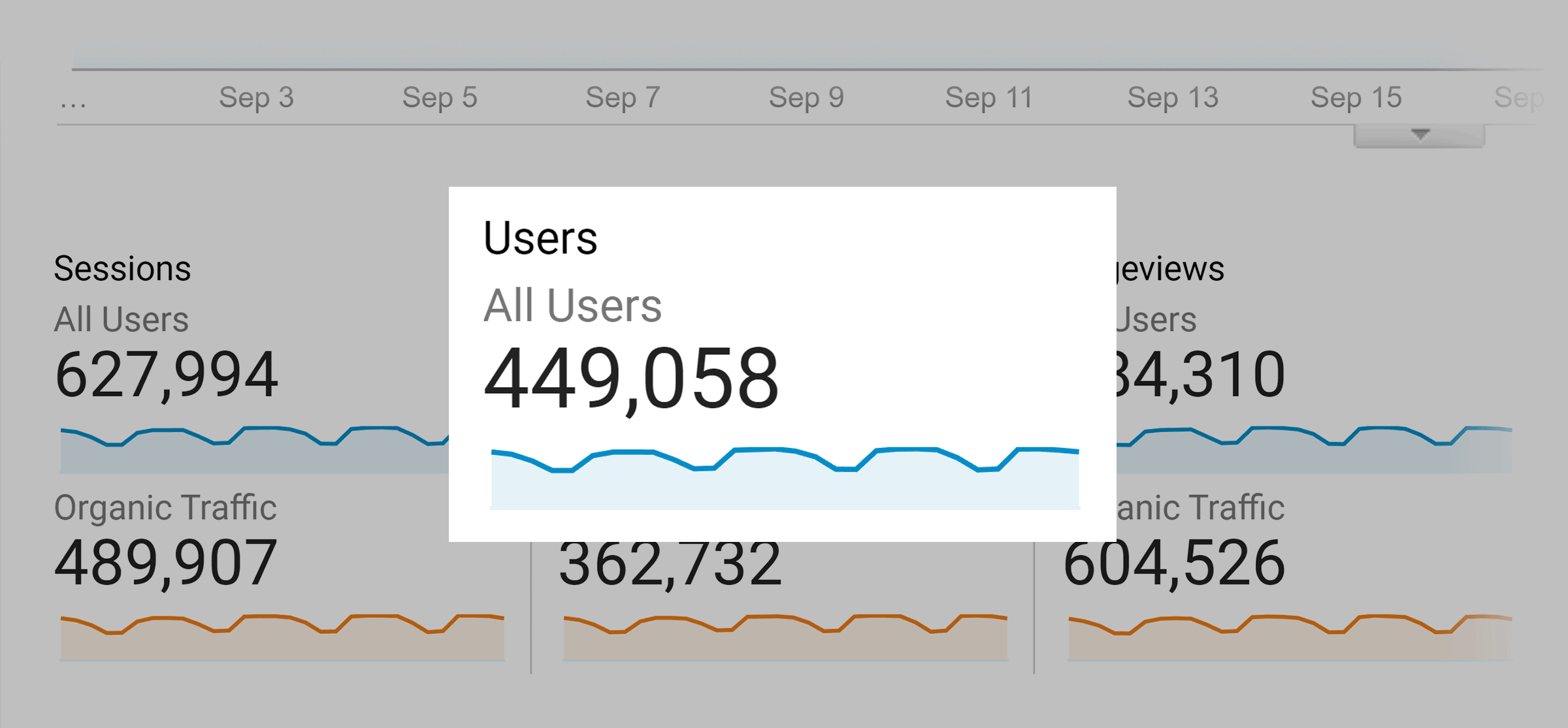
And 362,732 of those visitors (80.78%) come from Google:
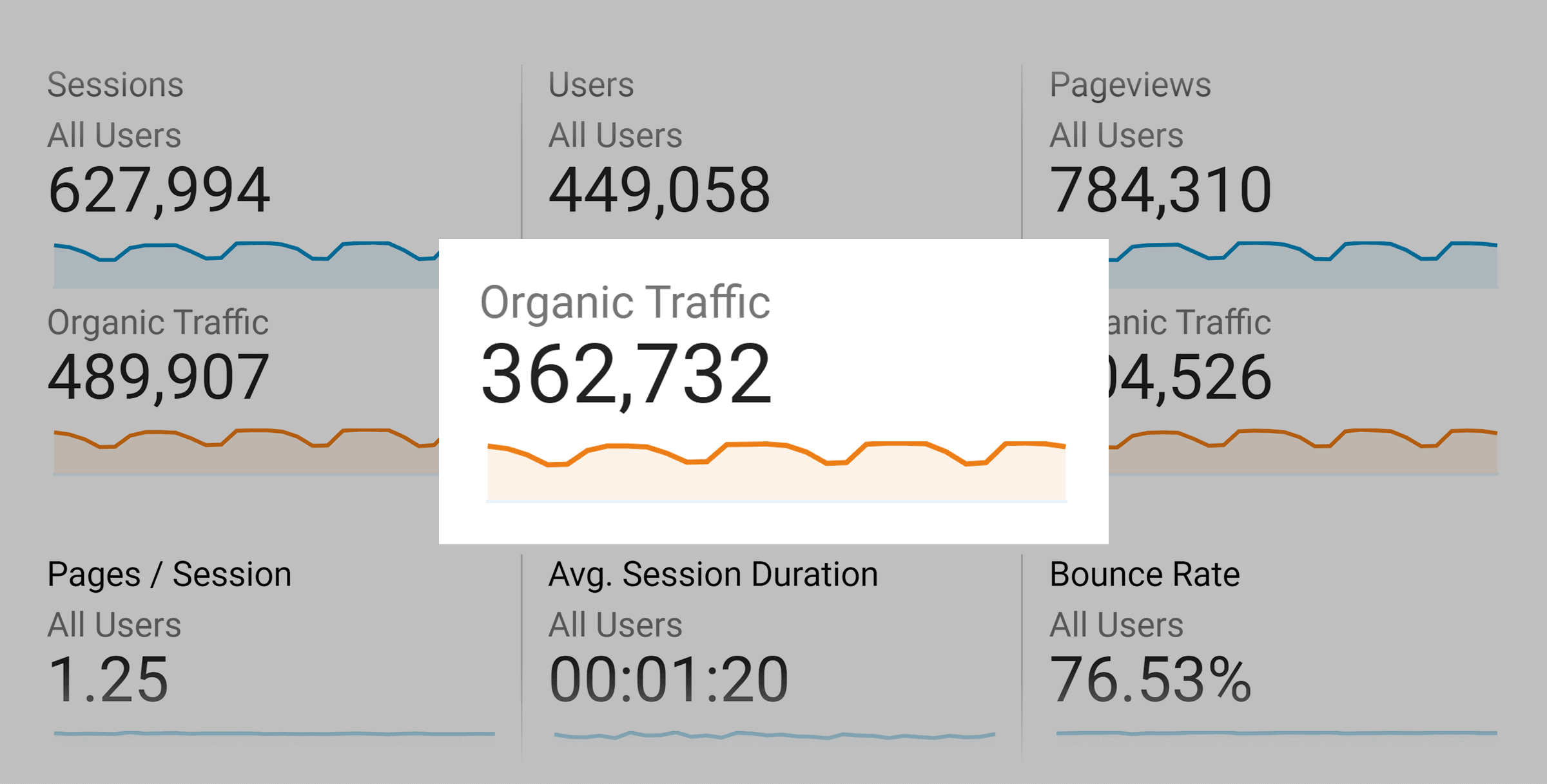
Obviously, there are a lot of factors that went into my site’s success with SEO, including content, on-site optimization, link building and technical SEO .
But the #1 factor that contributed to my site’s traffic growth was keyword research.
For example:
A while back I used the process in this guide to uncover a low-competition keyword: mobile SEO.
And I created a piece of SEO-optimized content around that term: The Definitive Guide to Mobile SEO .
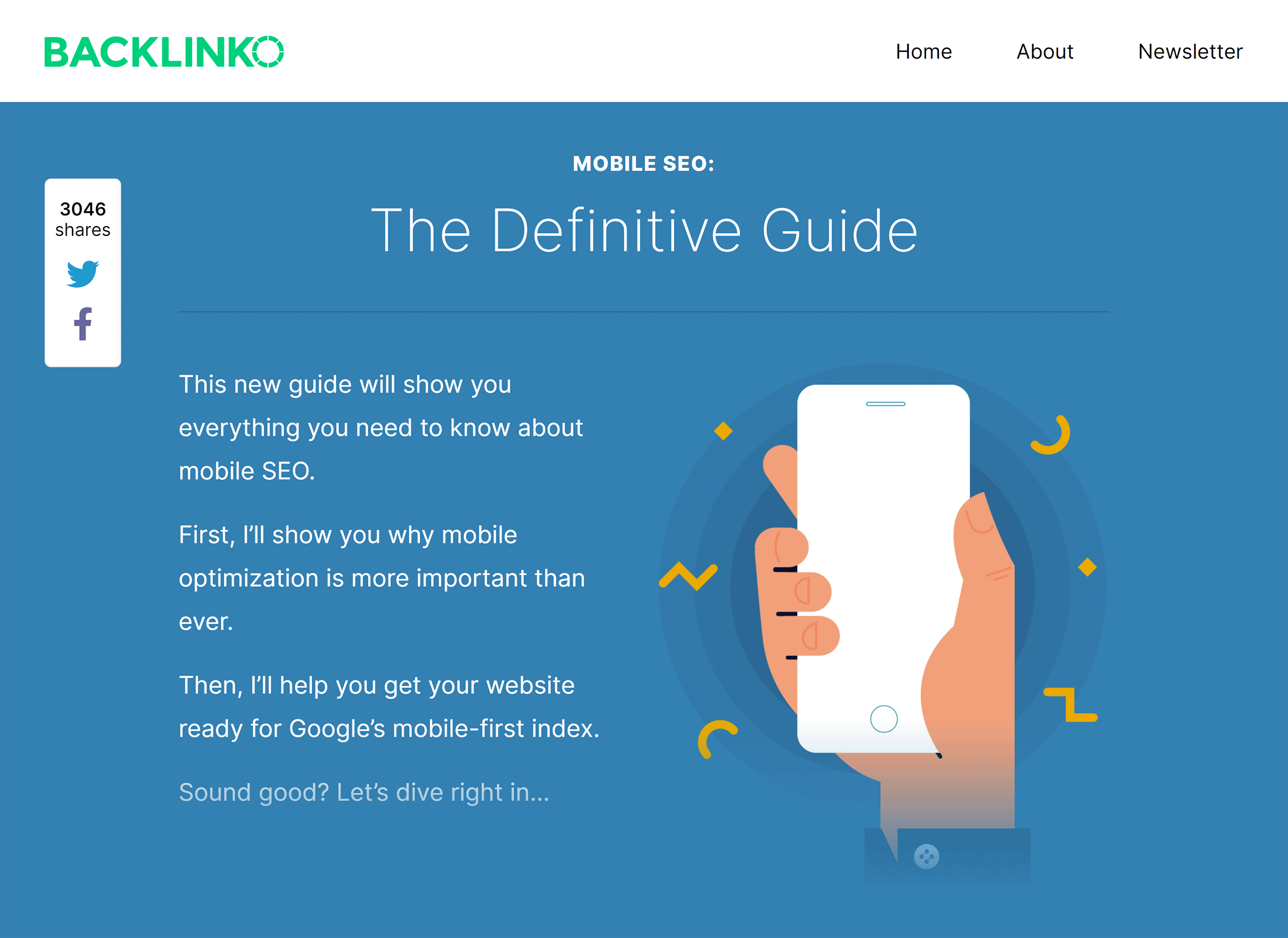
Because that keyword wasn’t super competitive, my site quickly ranked in the top 3:
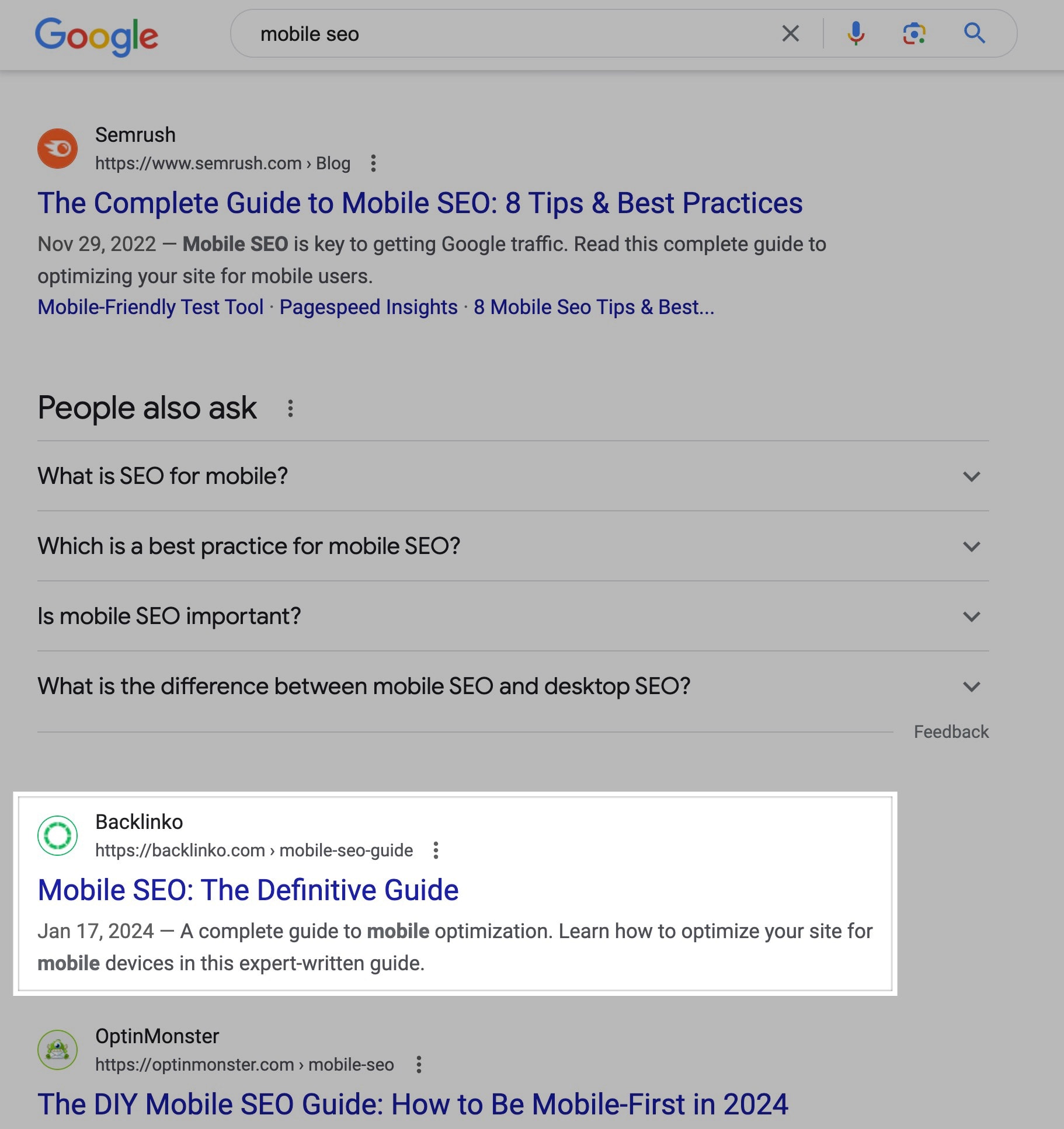
And thanks to that top 3 ranking, that single page brings in hundreds of visitors from Google every month:
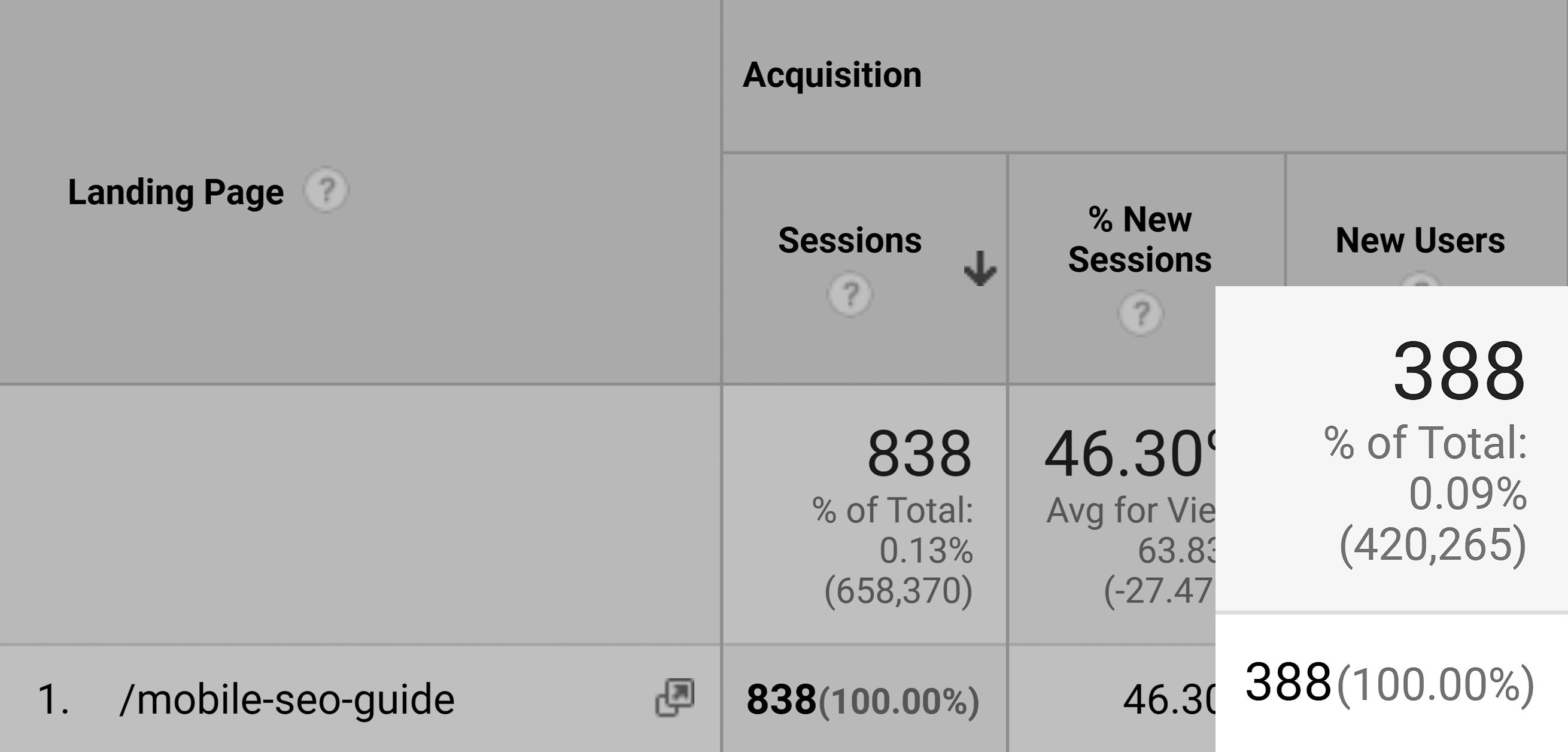
With that, it’s time for chapter 2.
Chapter 2: How to Find Keyword Ideas

Now it’s time to get into the nitty gritty of keyword research.
Specifically, it’s time to generate a list of keywords.
In this chapter I’m going to show you proven strategies that you can use to come up with LOTS of keyword ideas.
Let’s dive right in.
Keyword Research Template
Whether you’re starting a new SEO project, want to improve your site’s search traffic, or are looking for target keywords for a new piece of content, this template will help you do keyword research quickly and effectively.
Why Use a Keyword Research Template?
This template brings together all the different tool options and approaches into one place. So instead of bouncing around between a thousand tabs, losing track of where you are in the process…
You can just go through this template. Simple. Step-by-step.
When you’re done, you’ll have a BIG list of keywords. Plus all the metrics to help you pick which to target.
Download Now: Keyword Research Template
Brainstorm a List of Topics
Here’s where you come up with topics that your target customer is interested in.
For example, let’s say that you run a digital marketing agency.
Well, you’d want to ask yourself: ”What topics do people search for that are related to my business?”
Some topics that come to mind would be things like:
- Social media
- Email marketing
- Website traffic
- Content Marketing
Note: These topics aren’t keywords (yet).
Which is exactly what you’re going to learn how to do right now…
Wikipedia Table of Contents
Wikipedia is an overlooked keyword research goldmine.
Where else can you find articles curated by thousands of industry experts… all organized into neat little categories?
Here’s how to use Wikipedia to find keyword ideas.
First, head over to Wikipedia and type in a broad keyword:
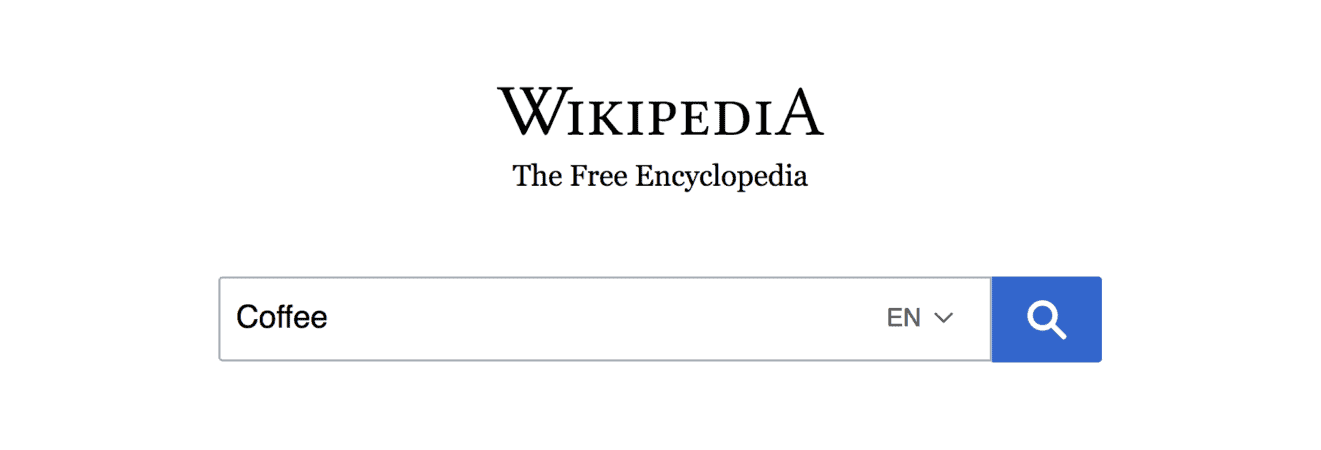
That will take you to the Wikipedia entry for that broad topic.
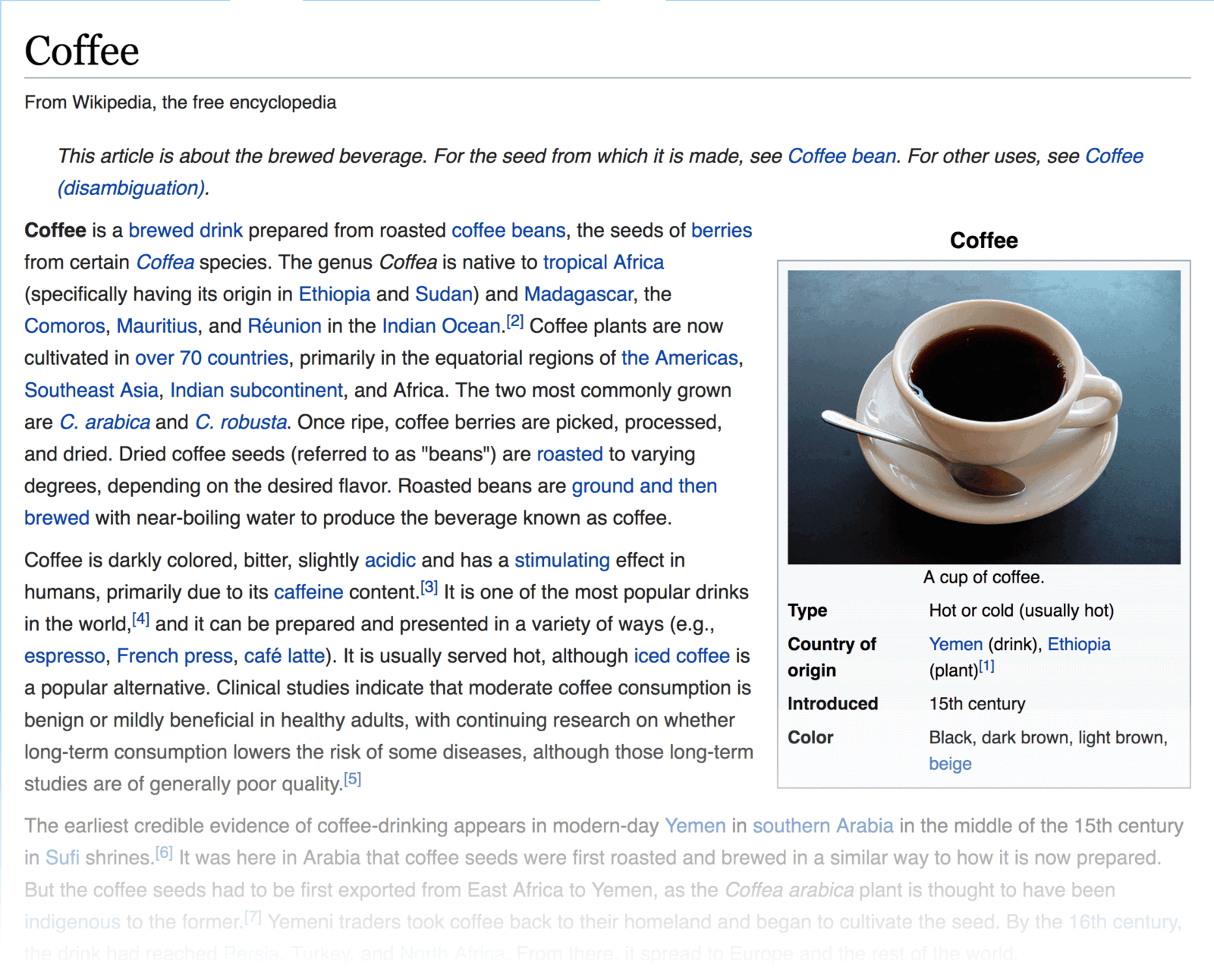
Then, look for the “contents” section of the page. This section lists out the subtopics covered on that page.
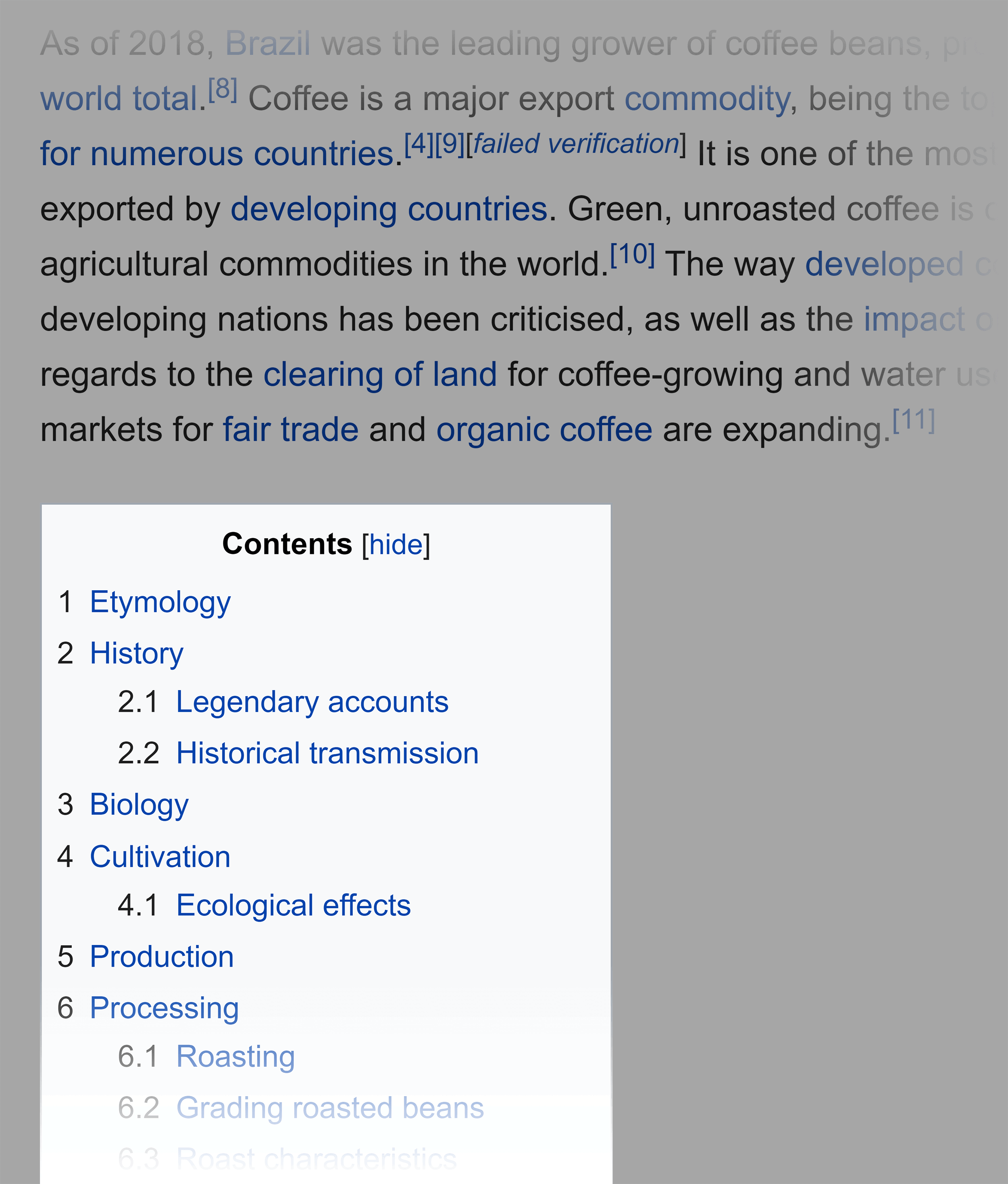
And some of the subtopics listed here are awesome keywords that would be tough to find any other way:
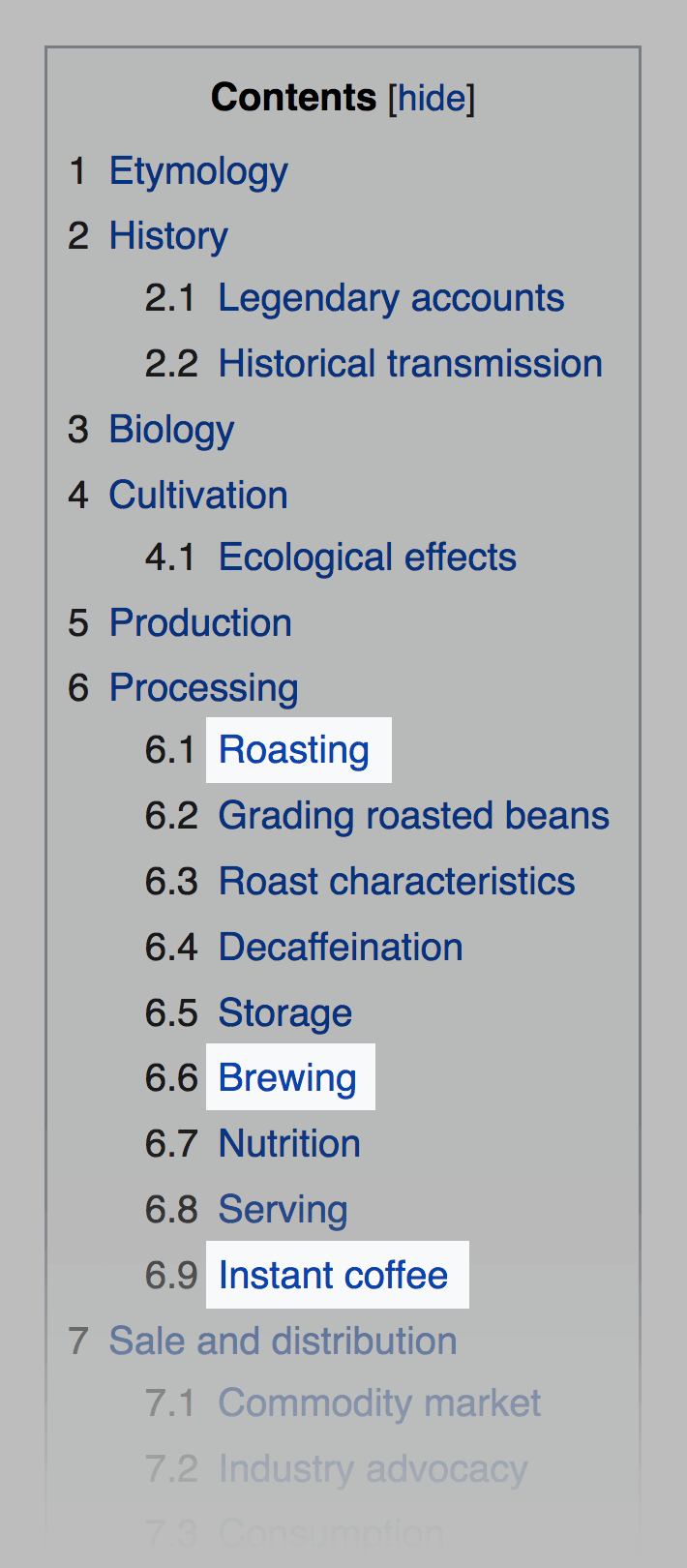
You can also click on some of the internal links on the page to check out the Table of Contents of other, closely related entries.
For example, on the coffee entry we have a link to “Coffee Preparation”:
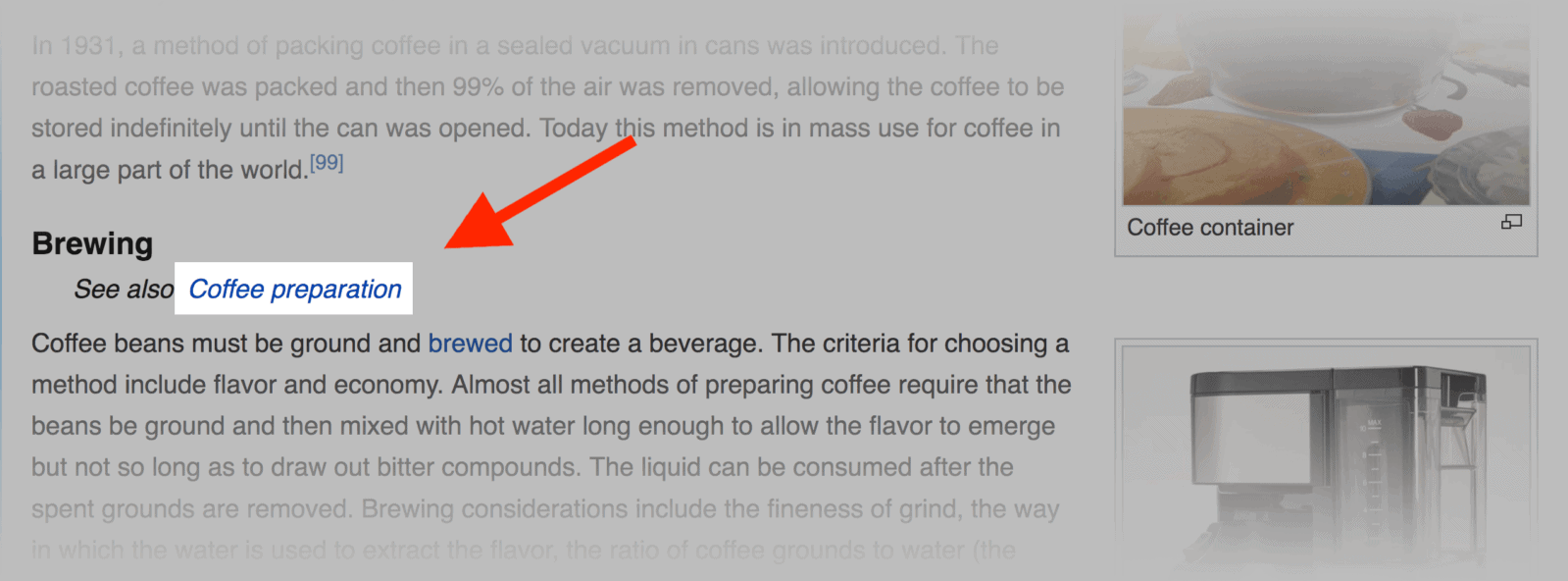
When you click on that link, you’ll notice that the table of contents for the Coffee Preparation page has even more keywords that you can add to your list:
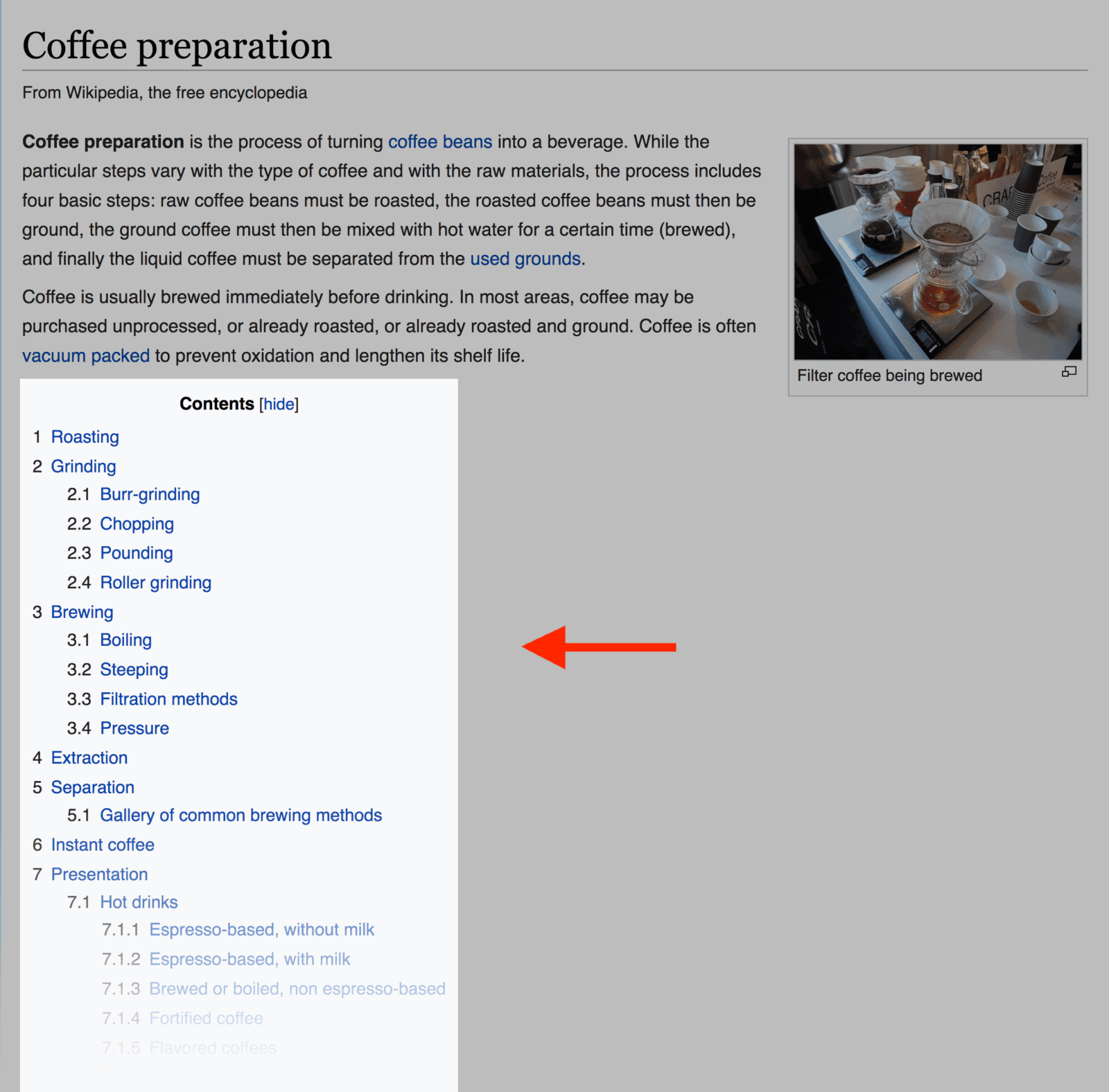
Pretty cool.
Searches Related To
Another cool way to find keywords is to check out the “Searches Related to” section at the bottom of Google’s search results.
For example, let’s say one of your topics was “content marketing”.
Well, you’d want to search for that keyword in Google.
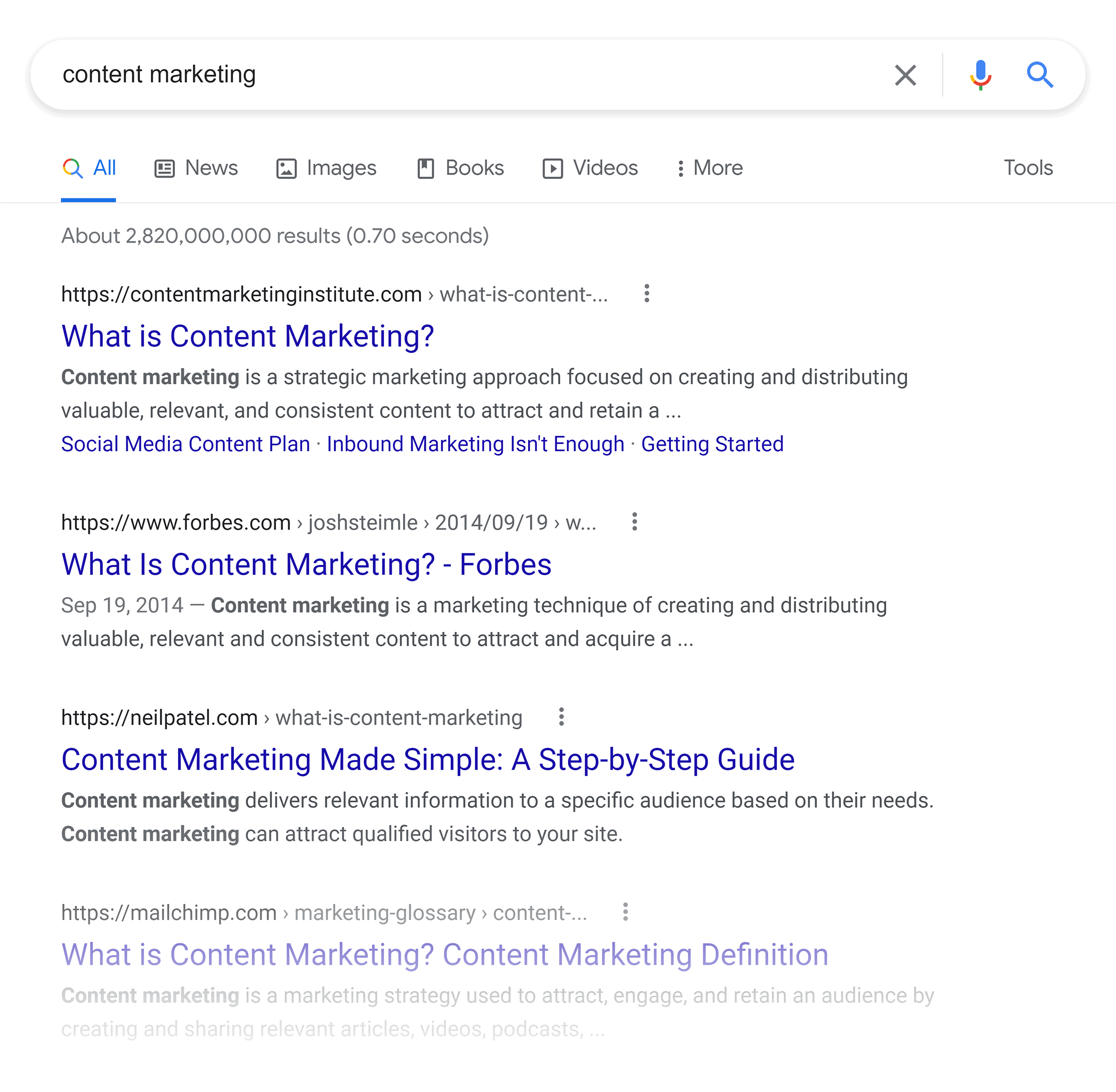
And scroll to the bottom of the page. You’ll find a list of 8 keywords that are closely related to your search term.
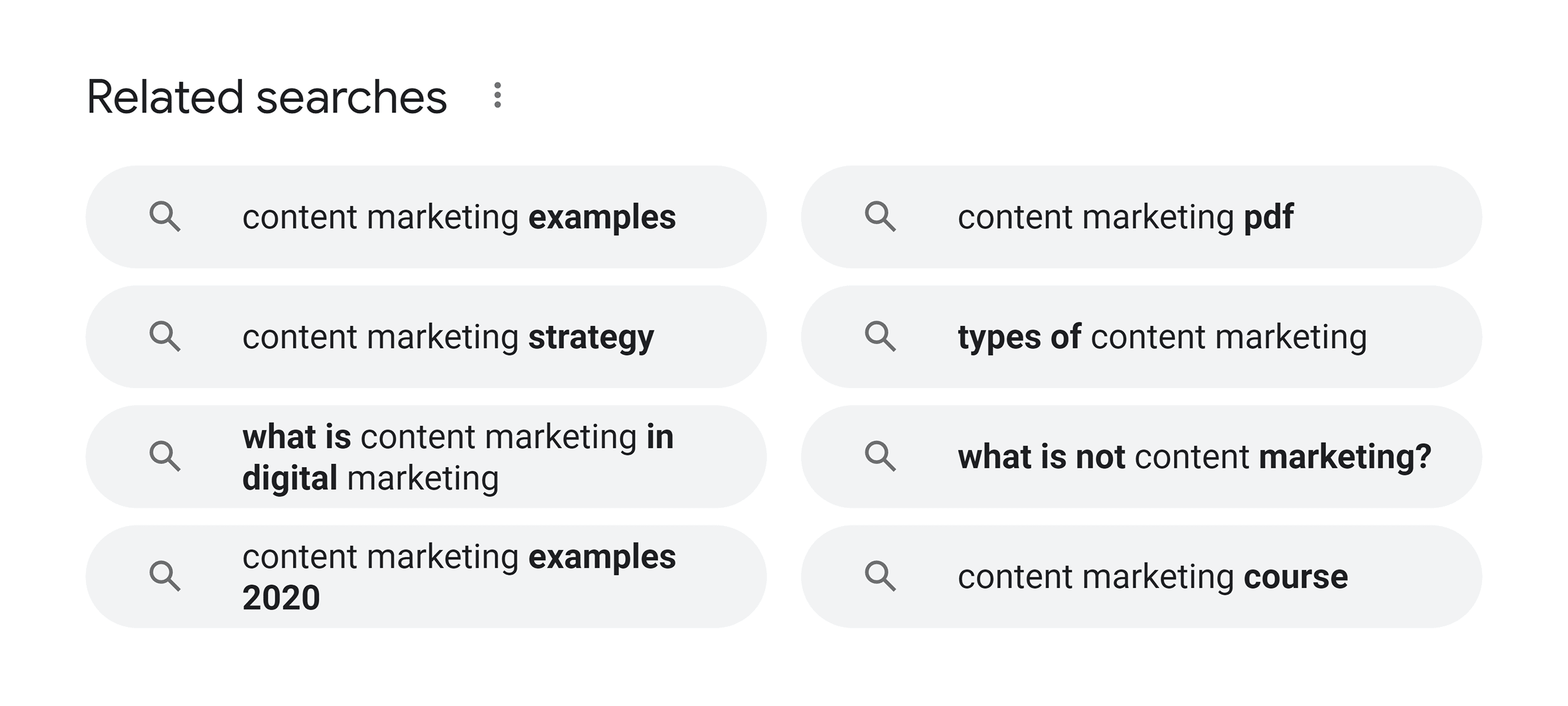
Just like with Google Suggest, these are keyword ideas that come straight from Google . So you don’t need to guess whether or not they’re popular. Google is literally telling you: “Tons of people search for these keywords.”
Pro Tip: Click on one of the “Searches Related To” keywords.
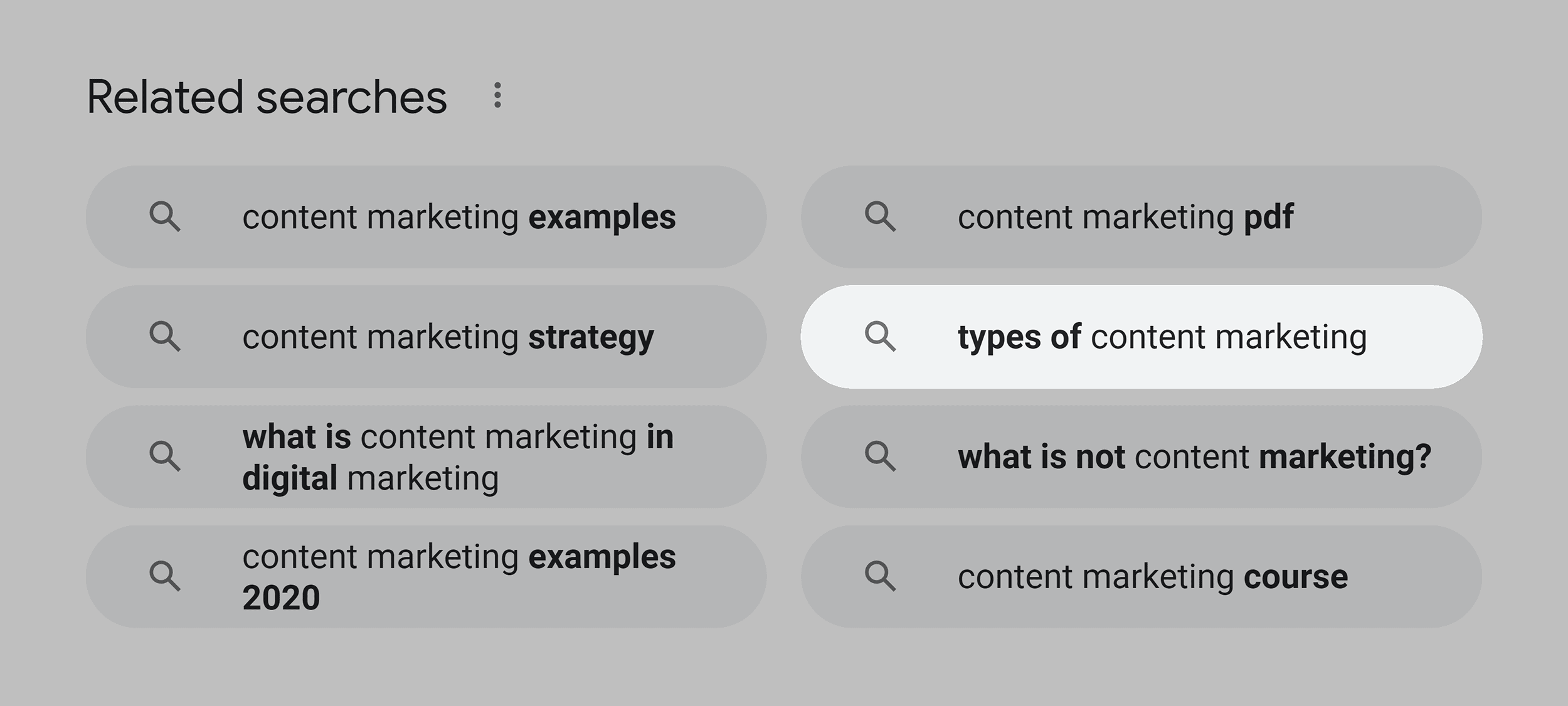
Then, scroll to the bottom of THOSE results. This will give you a new list of related keywords. Rinse and repeat.
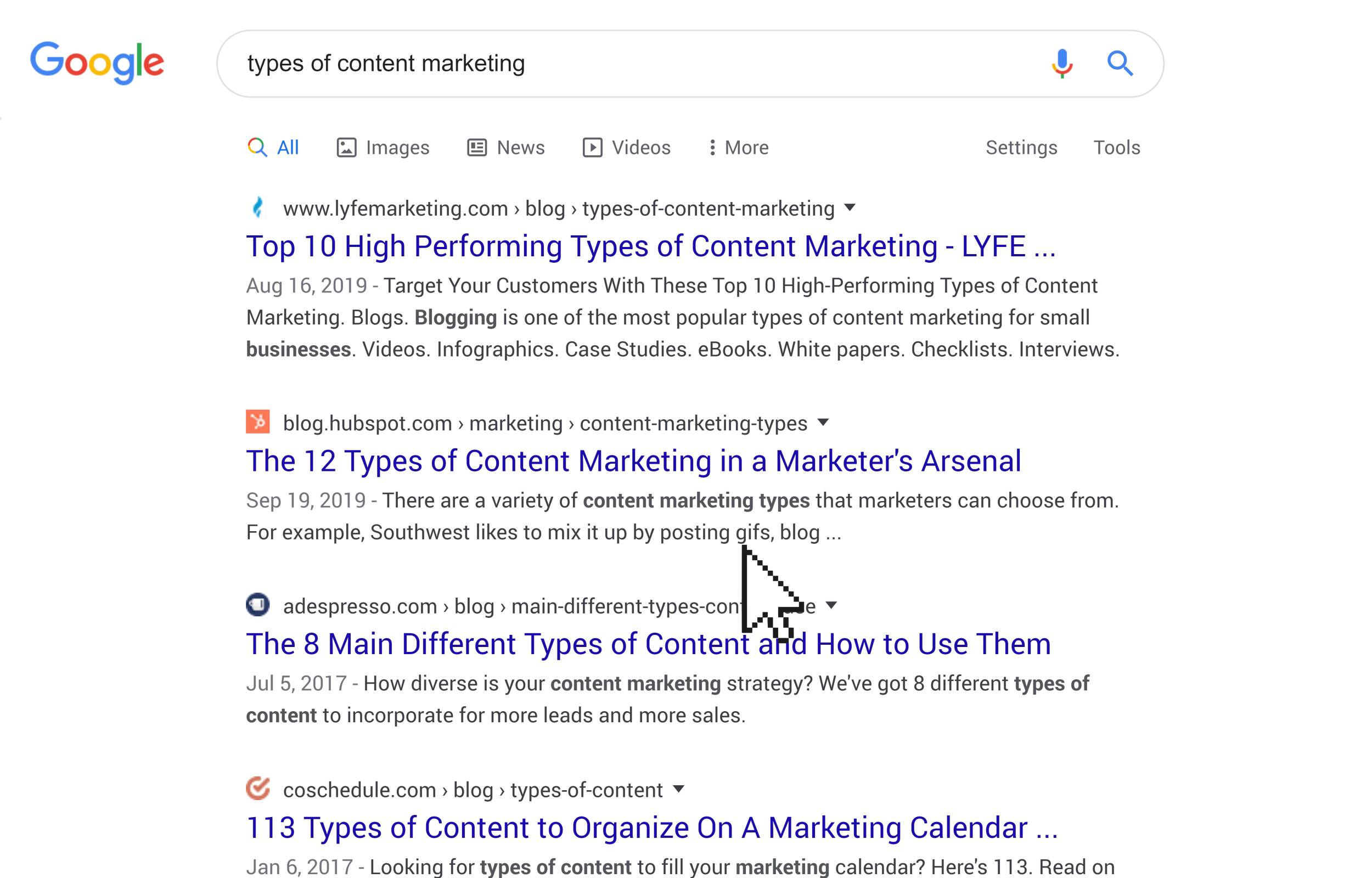
Find Keywords on Reddit
Chances are your target audience hangs out on Reddit.
Which means you can usually find lots of keyword ideas on this platform.
Here’s how:
Let’s say that you run a site that sells organic dog food.
You’d head over to Reddit. Then search for a broad topic that your target audience is interested in… and something that’s related to what you sell.

Then, choose a subreddit where your audience probably hangs out:
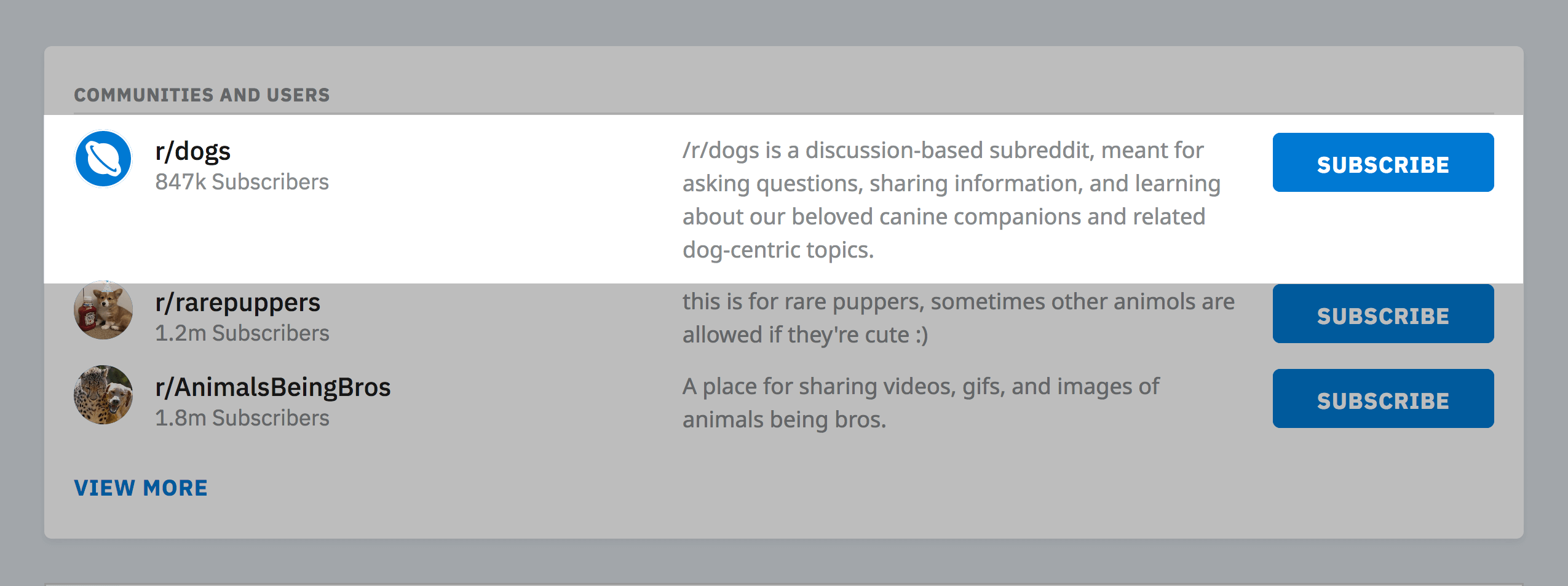
Finally, keep an eye out for threads that have lots of comments, like this:
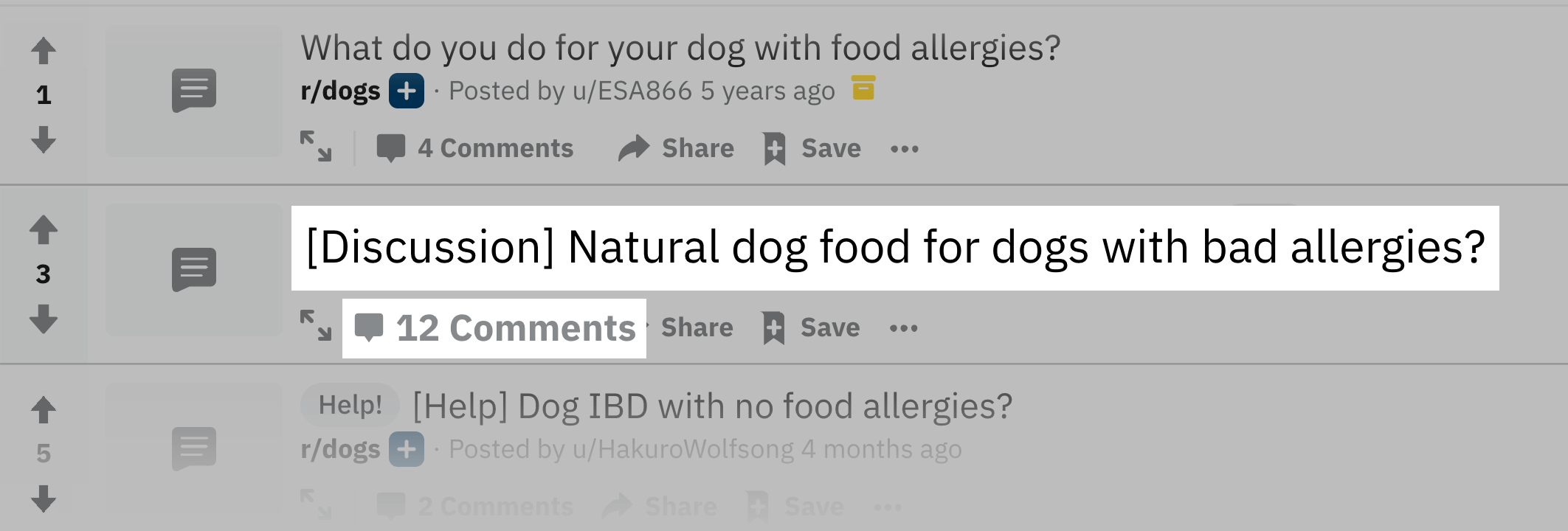
In this case you’d add “dog food allergies” to your keyword ideas list.
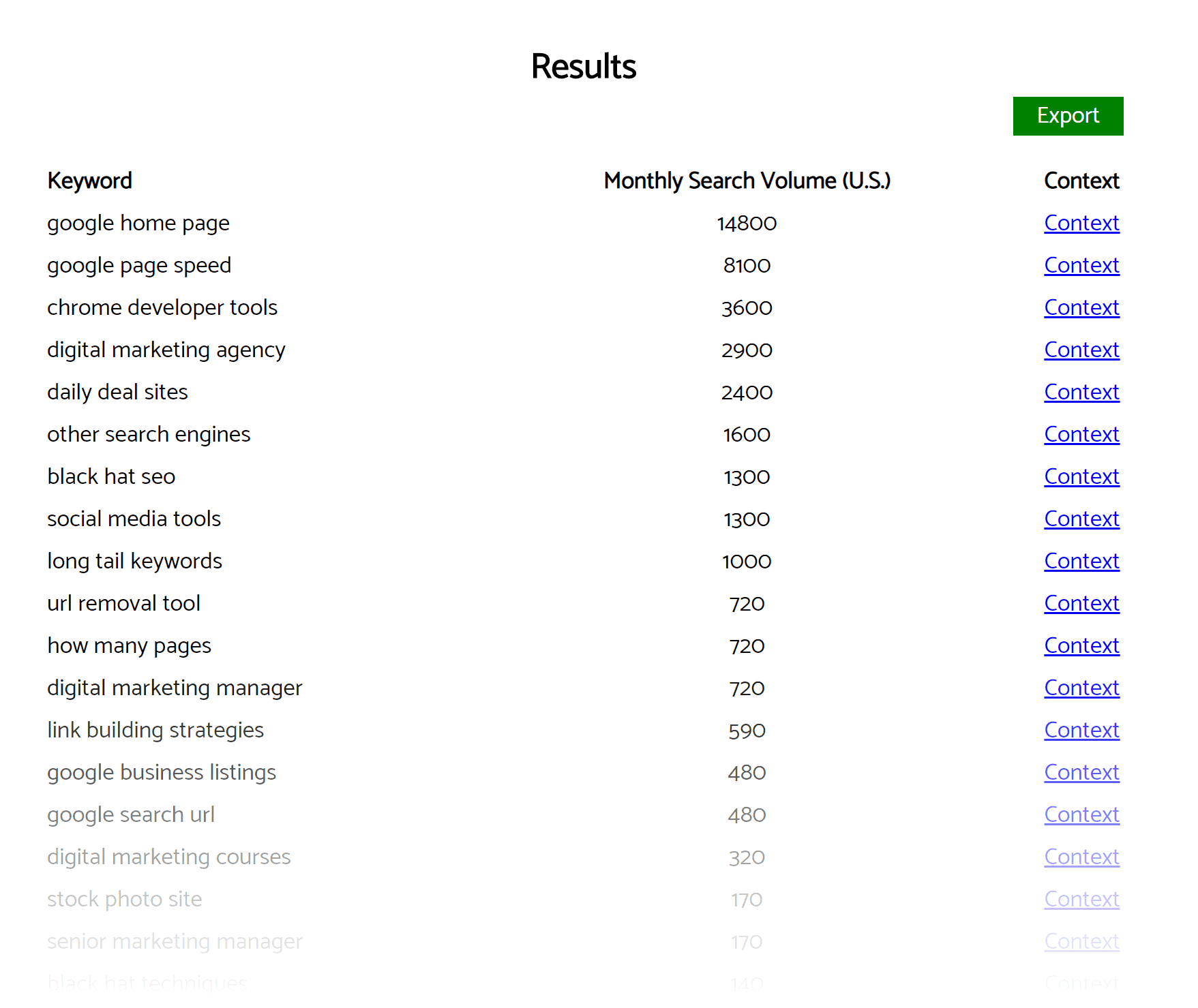
Use Google and YouTube Suggest
Now that you have a list of topics, type each one of them into Google.
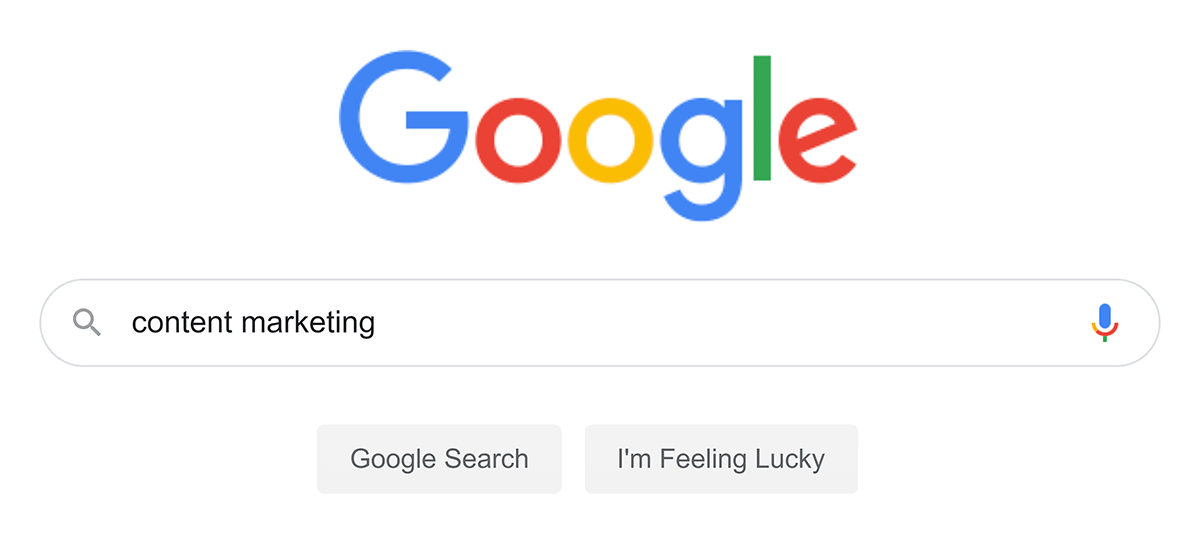
And see what terms that Google Suggests to you.
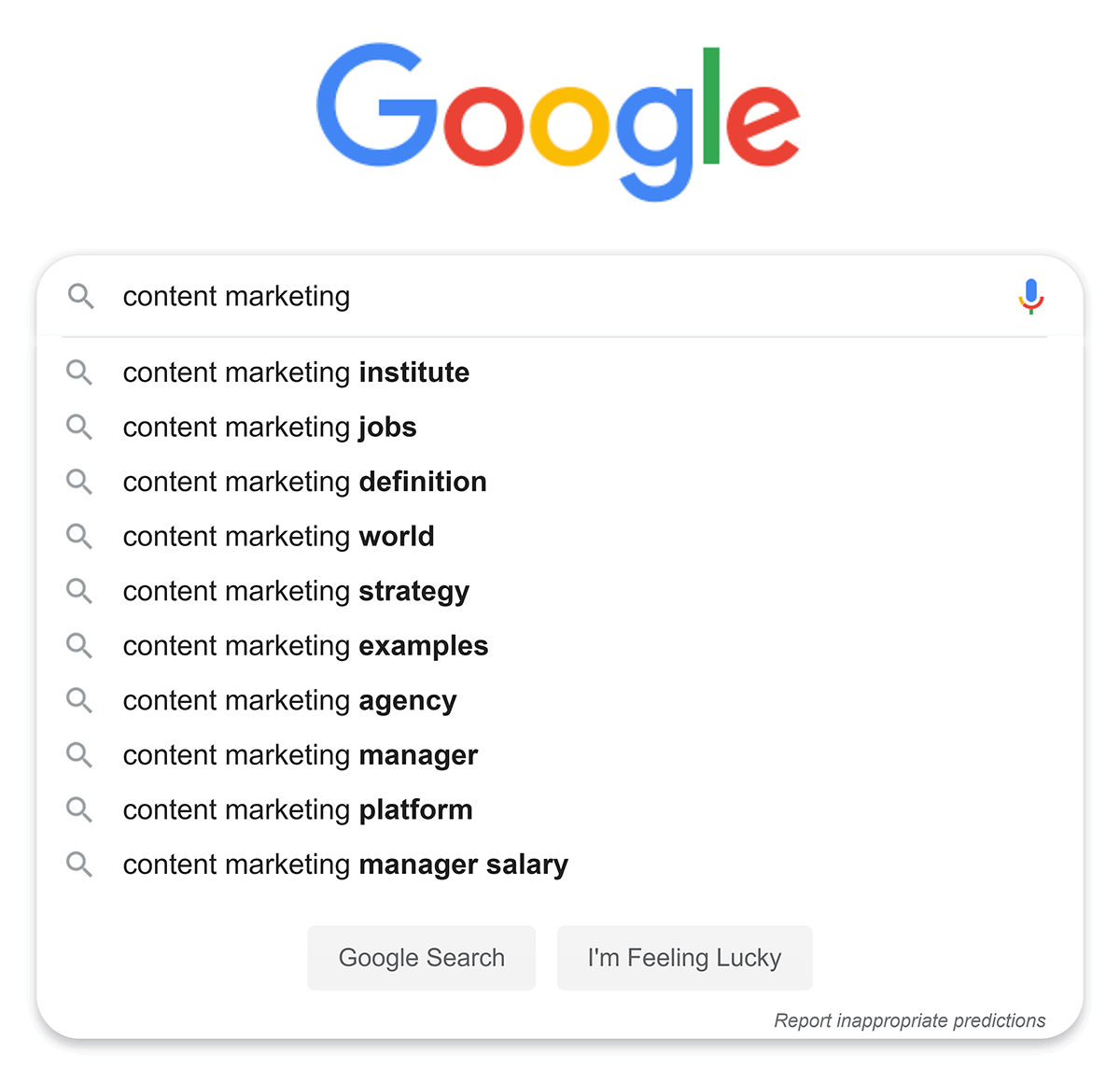
These are great keywords to add to your list.
Because if Google suggests a keyword, you KNOW that lots of people are searching for it.
But you don’t need to stop with Google Suggest.
You can also find keyword suggestions with YouTube Suggest:
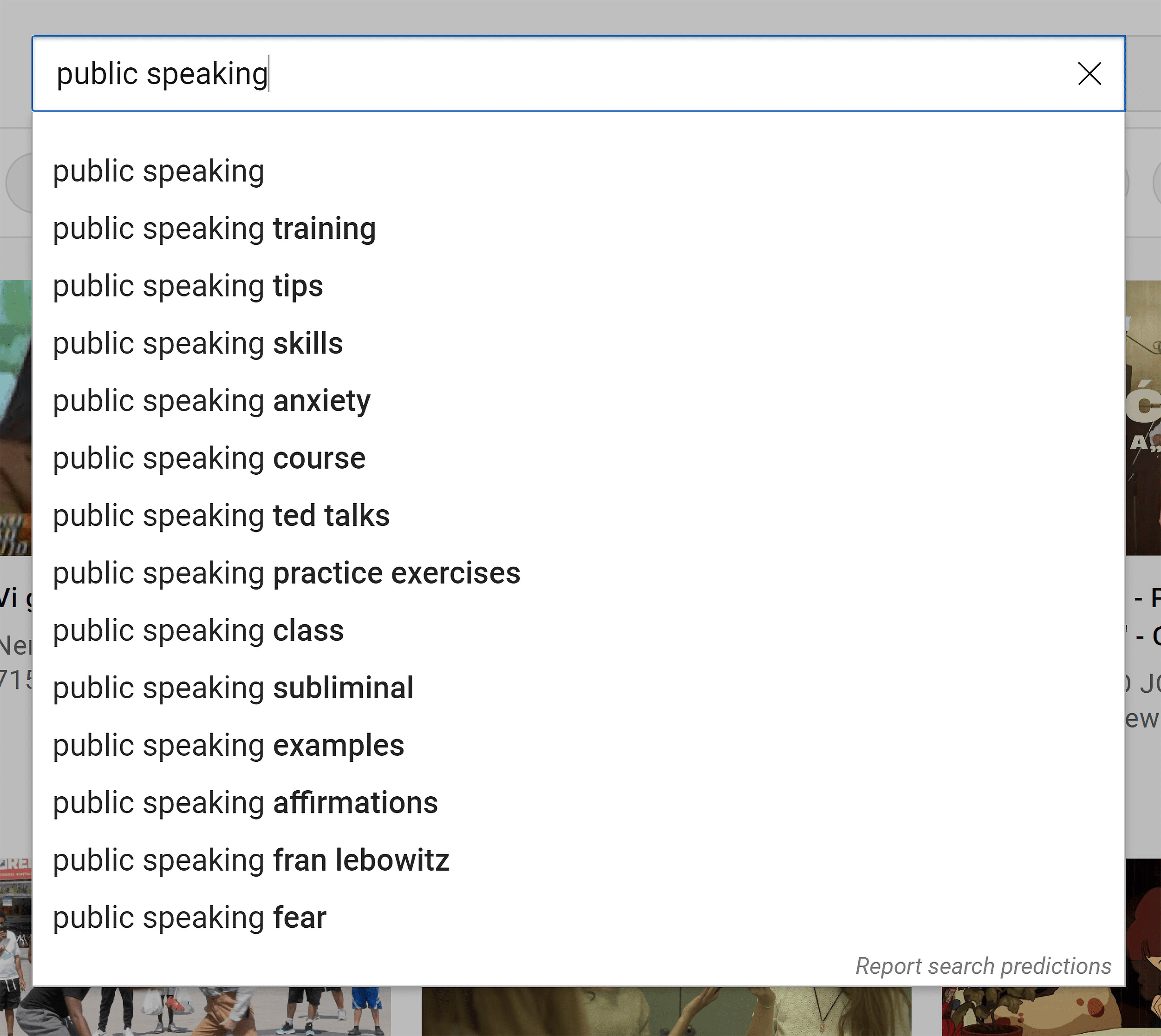
Find Popular Topics Using Forums
Forums are like having live focus groups at your fingertips 24 hours a day, 7 days a week.
The easiest way to find forums where your target audience hangs out is to use these search strings in Google:
“keyword forum” “keyword” + “forum” “keyword” + “forums” “keyword” + “board”
Once you find a forum, note how the forum is divided up into sections: Each of these sections are potential keywords that you can add to your list.
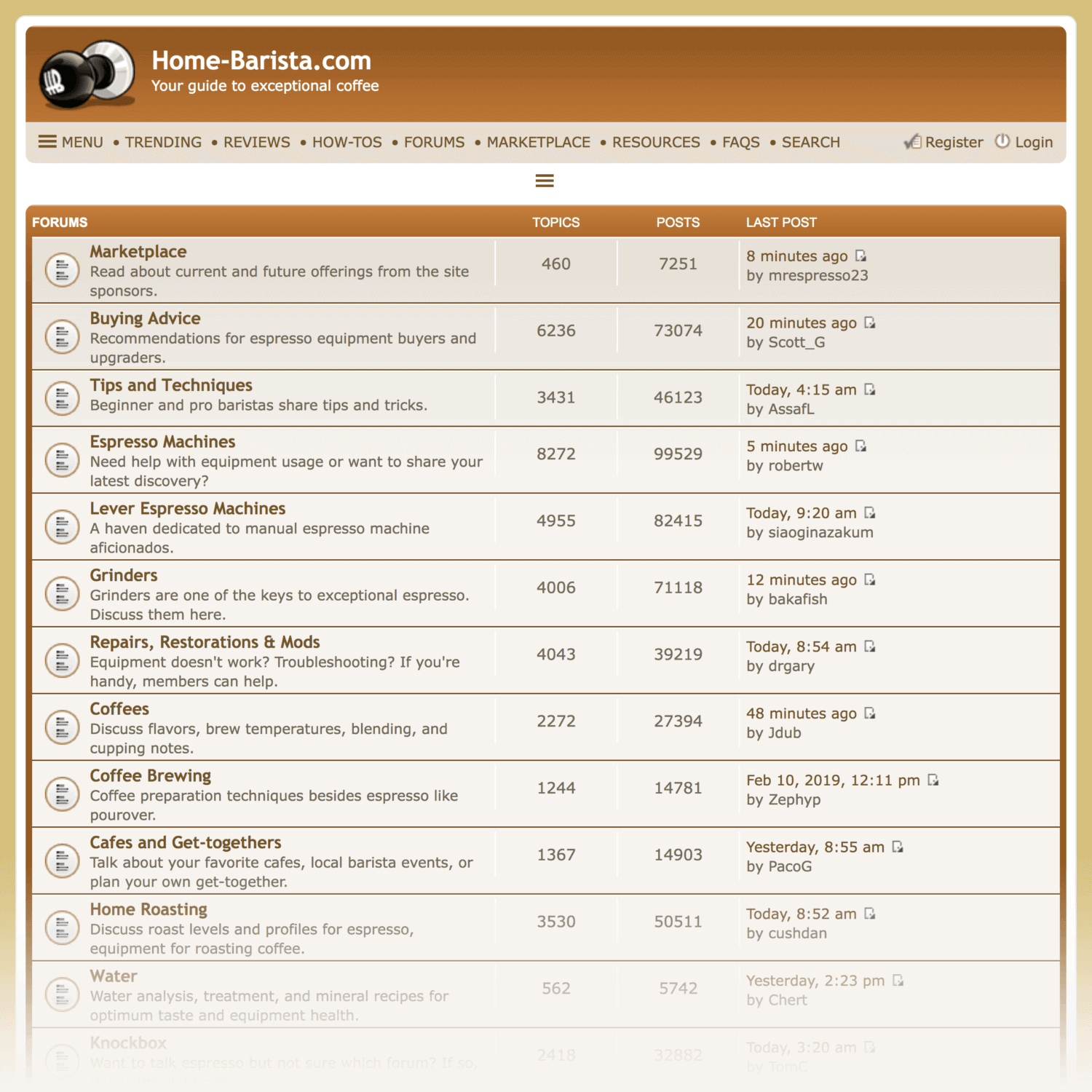
To dig deeper, check out some of the threads on the forum to find other specific topics that your target audience struggles with:
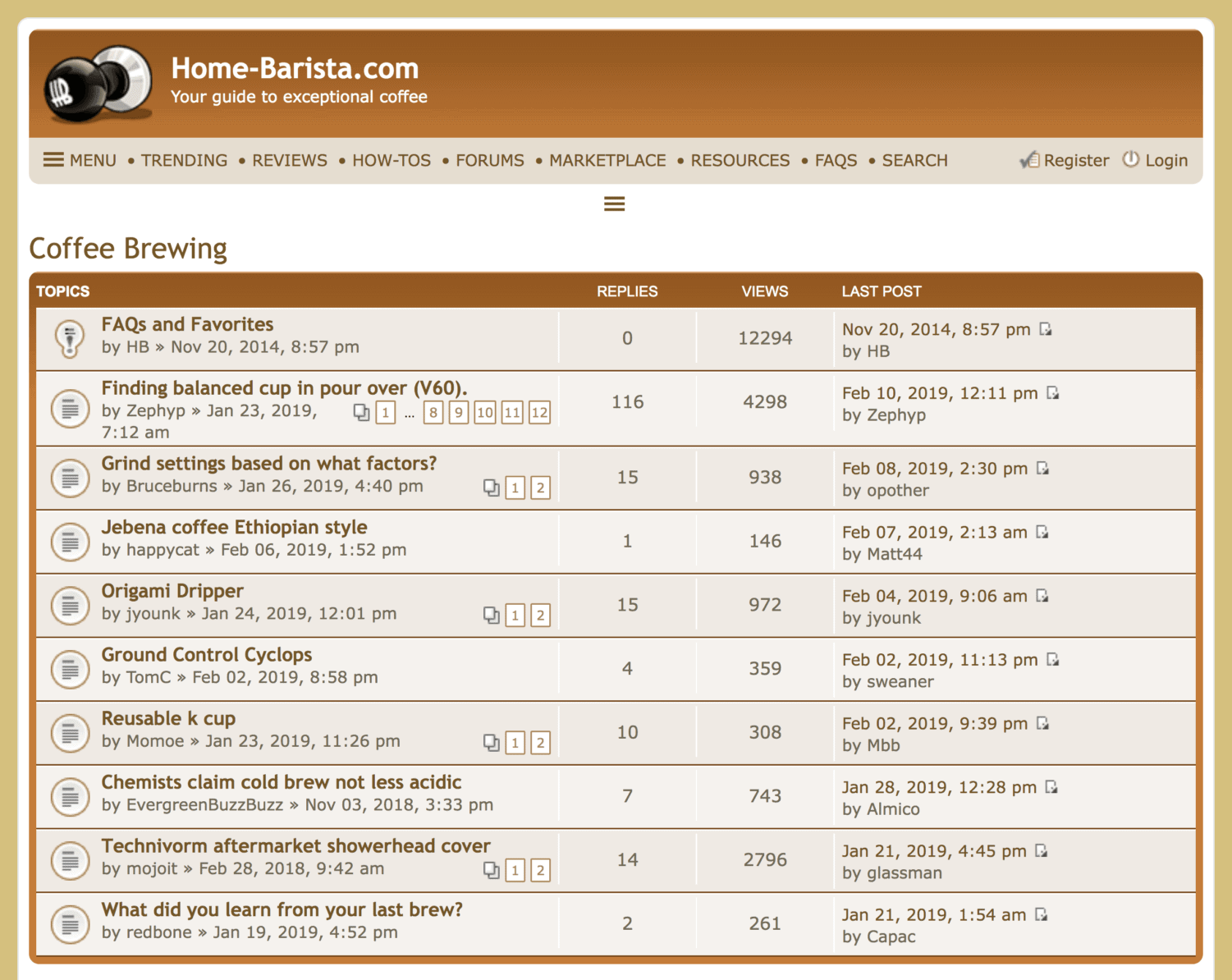
Pretty cool, right?
Chapter 3: Keyword Research Tools

This chapter is all about tools.
Can you find keywords without a tool?
But a tool makes the entire process A LOT easier.
With that, here are the keyword research tools that I personally use and recommend.
If you want to invest in a paid keyword tool, I HIGHLY recommend Semrush .
That’s because SEMrush is a HUGE time saver.
Here’s why…
Instead of popping random keywords into a tool, Semrush shows you the exact keywords that a site already ranks for.
So if you have a site that you’re competing against in Google, just pop it into SEMrush.
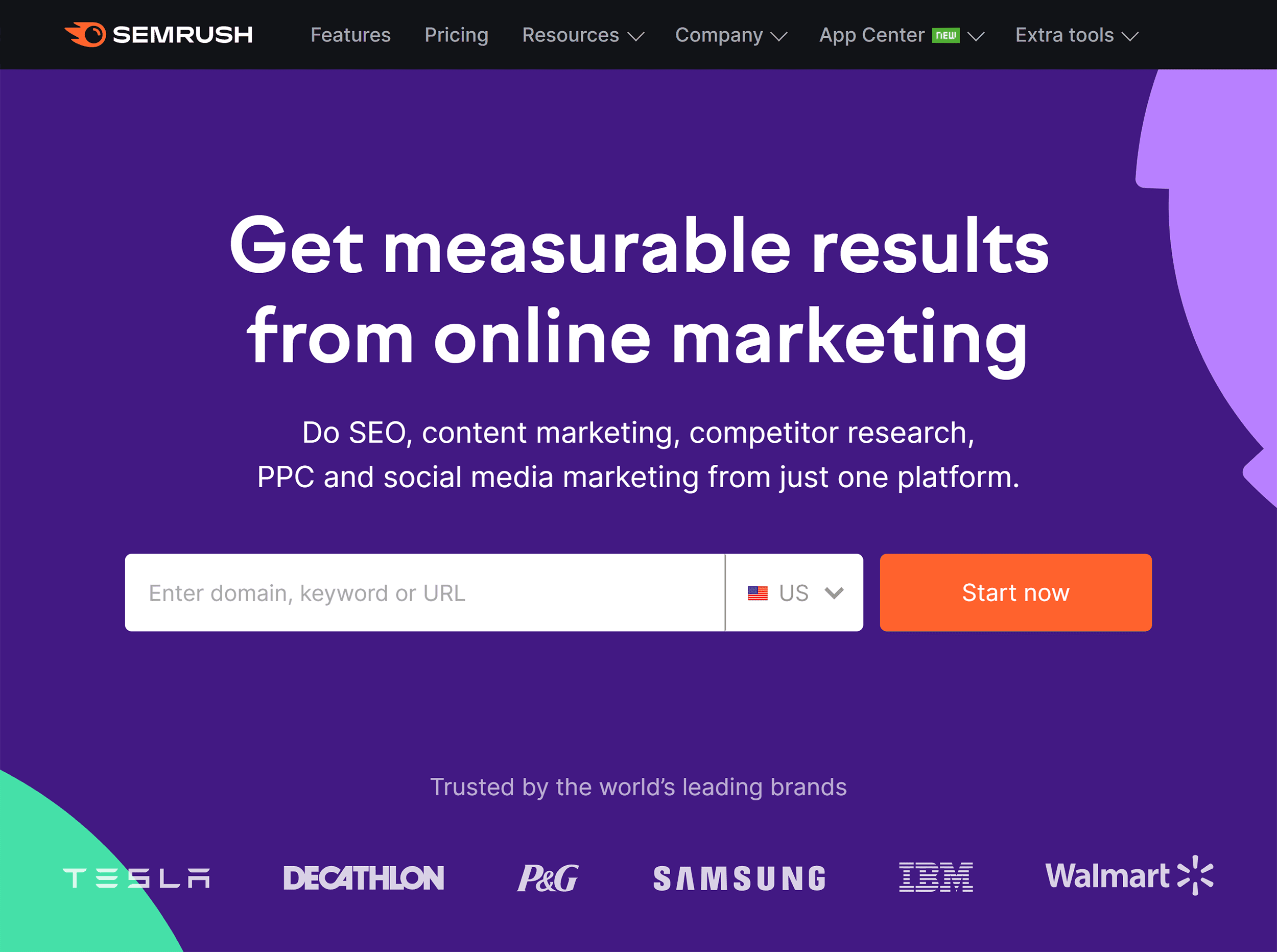
And steal all of their keywords.
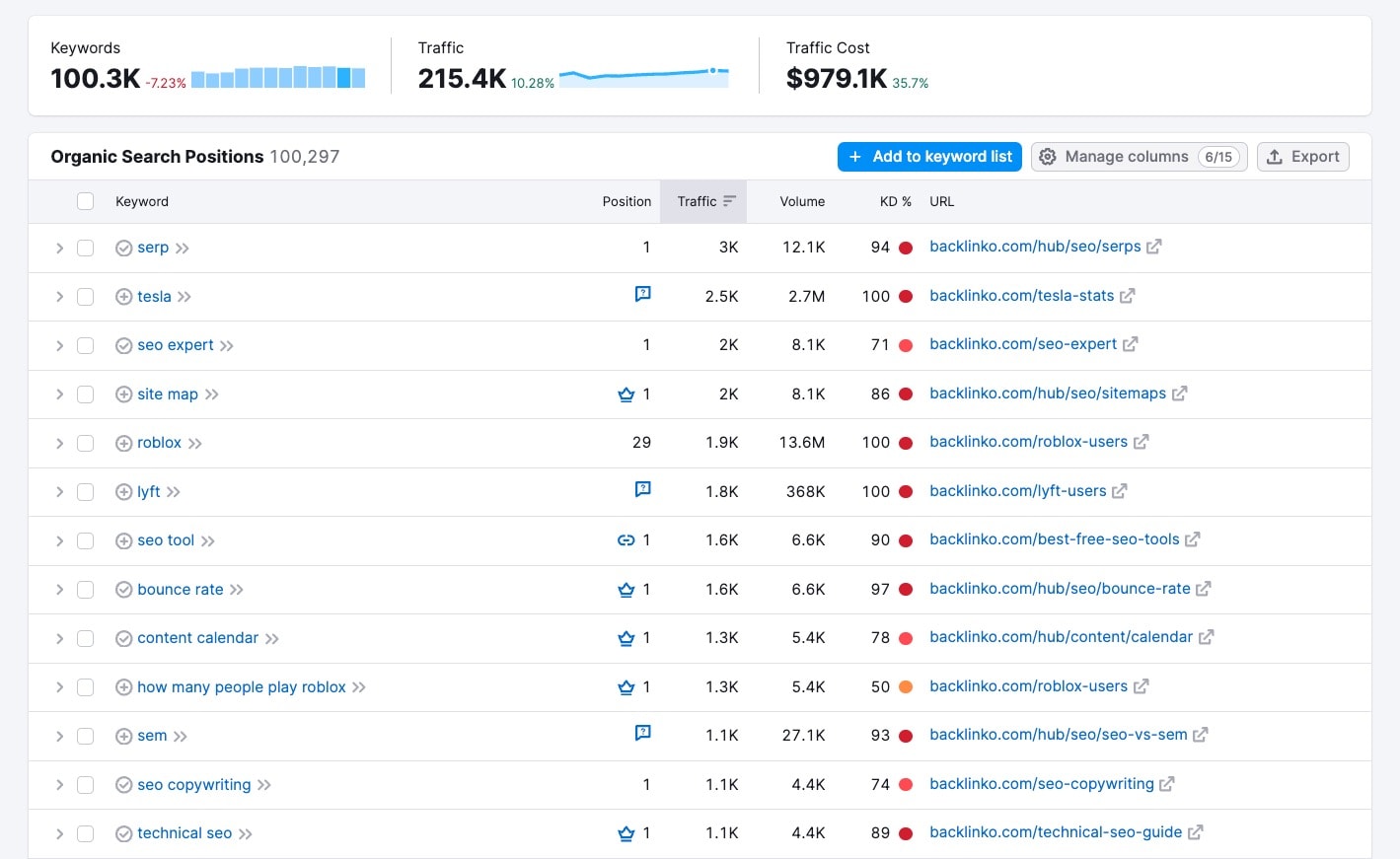
The Google Keyword Planner
Google’s Keyword Planner is THE most reliable source of keyword information online.
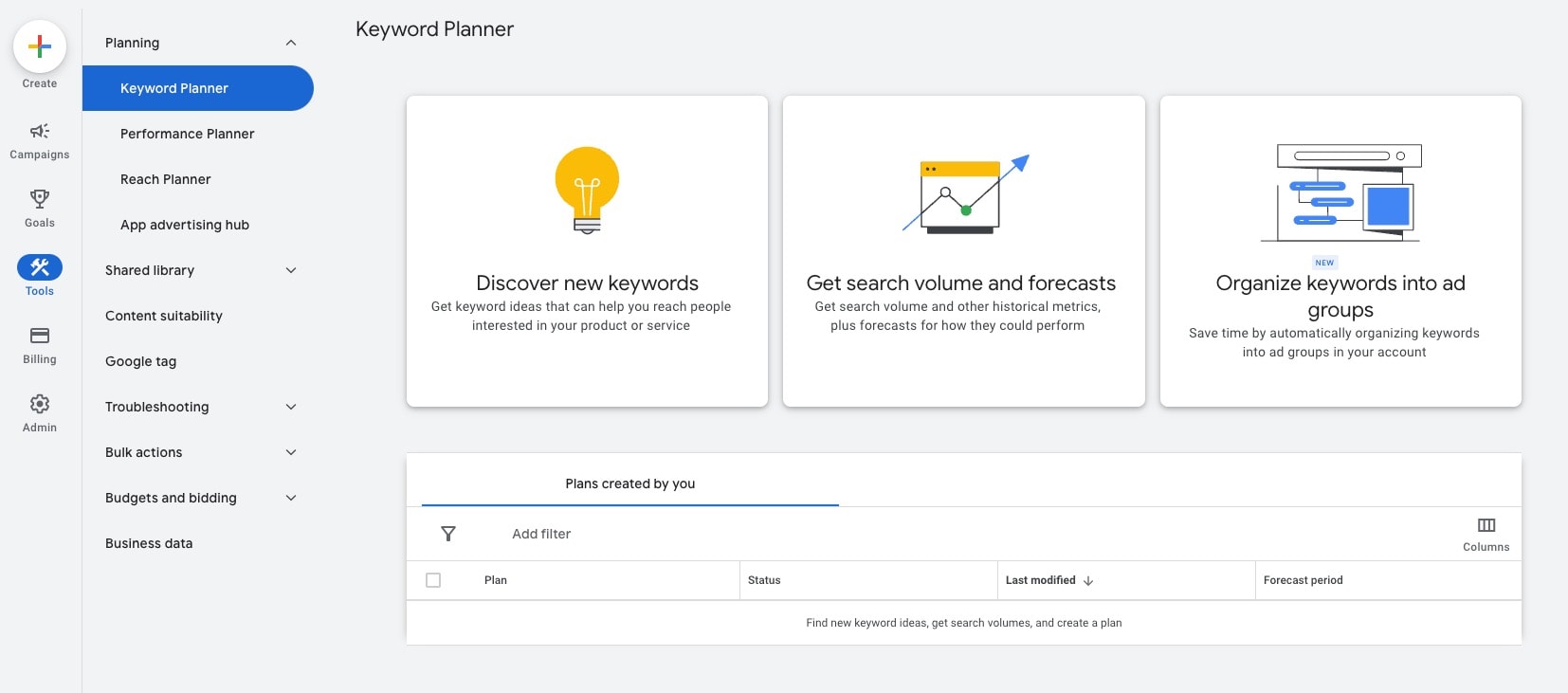
That’s because, unlike most other tools, the data you get from the Keyword Planner come straight from Google.
(So you know they’re accurate)
The big downside of the GKP is that it’s designed to help people with their Google ad campaigns… not with SEO.
That said, you can still use the GKP to get lists of keyword ideas…
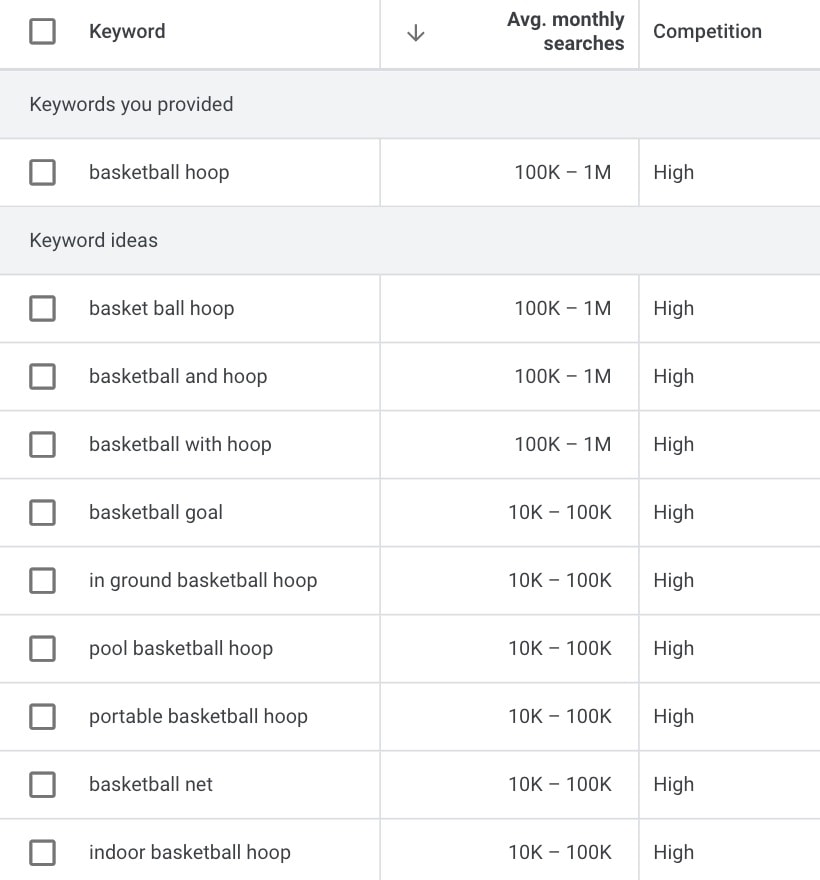
…and find search queries that get lots of searches.
ExplodingTopics.com
This new tool is like Google Trends… but better.
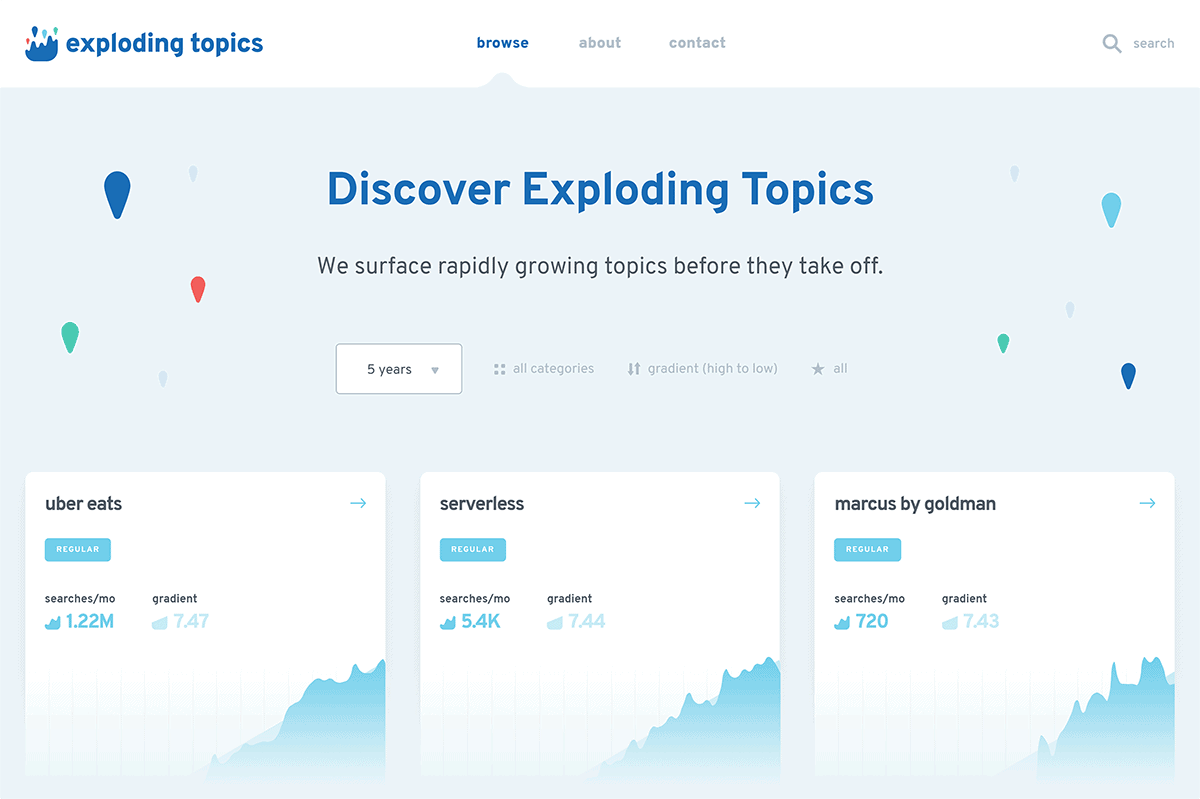
Exploding Topics scrapes the web for terms that are surging in popularity. And it bubbles those terms up for you.
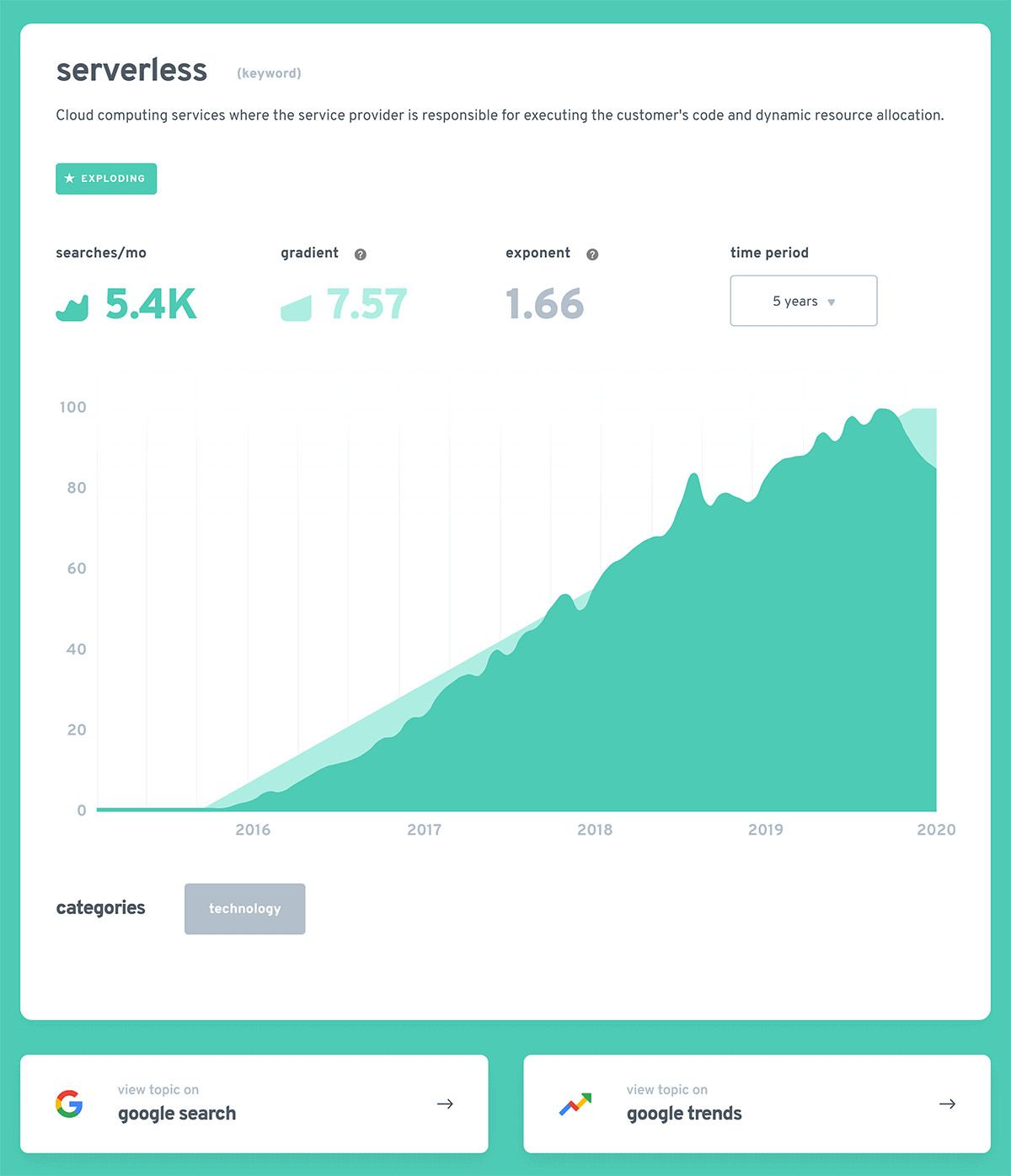
You can even sort the list of topics by category.
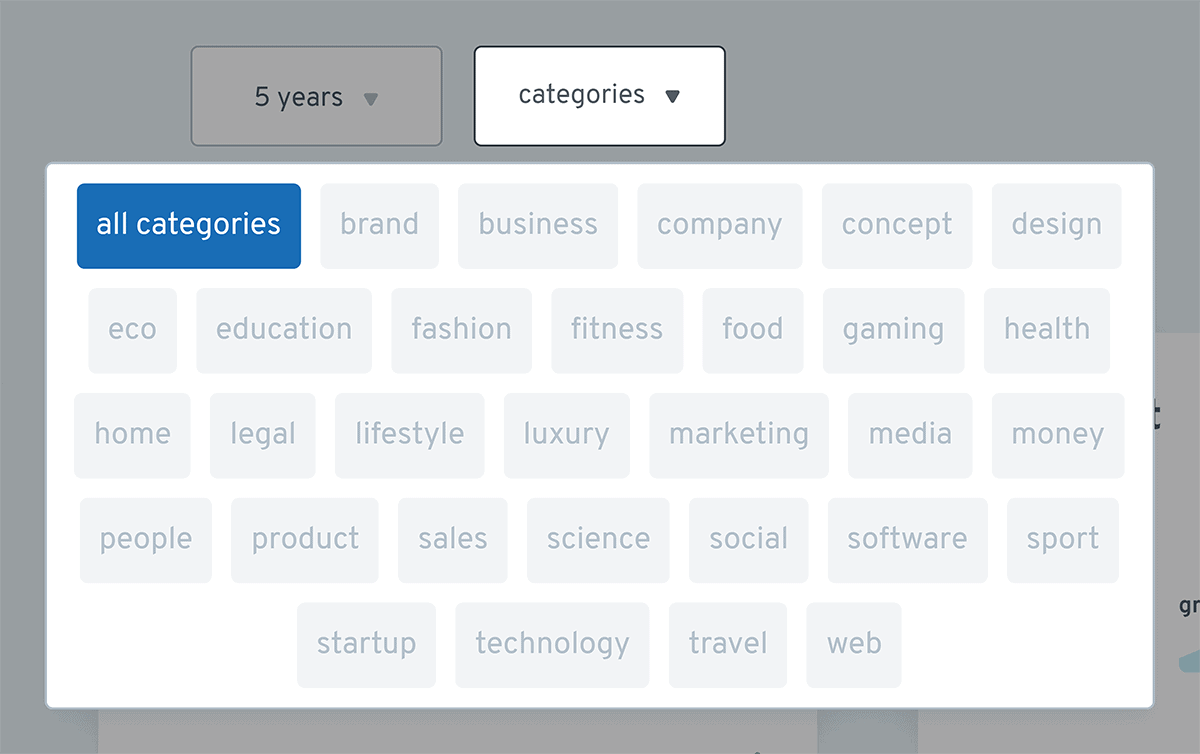
Keyword Surfer
Keyword Surfer might be my favorite keyword research tool.
Because it shows you keyword ideas from inside Google’s search results.

All you need to do is install the Chrome extension. And the next time you search for something in Google, you’ll see a list of keyword ideas… and data on each keyword.
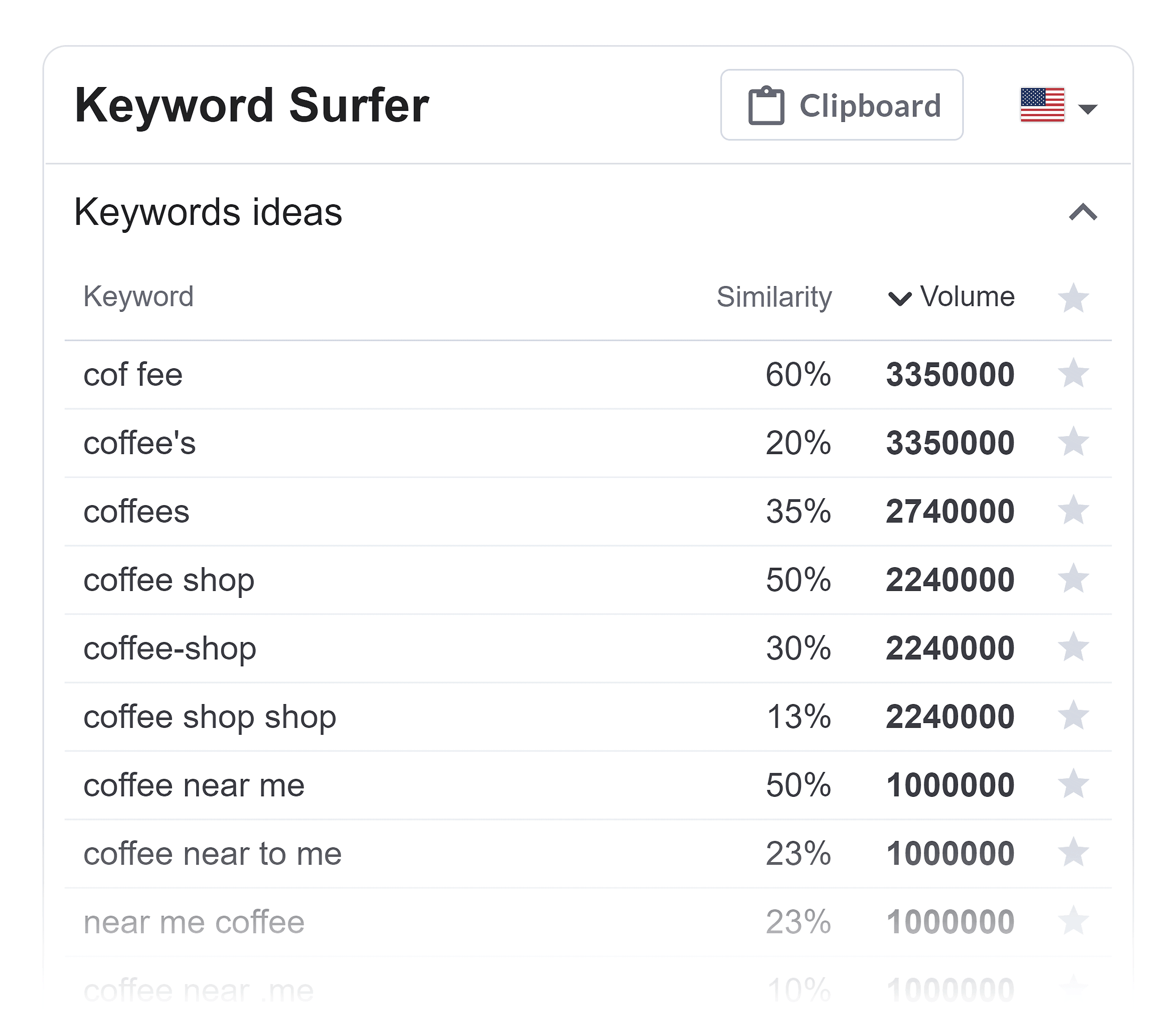
Ubersuggest
Ubersuggest was the first Google suggest scraper that I used. And the tool recently got a massive upgrade and overhaul.
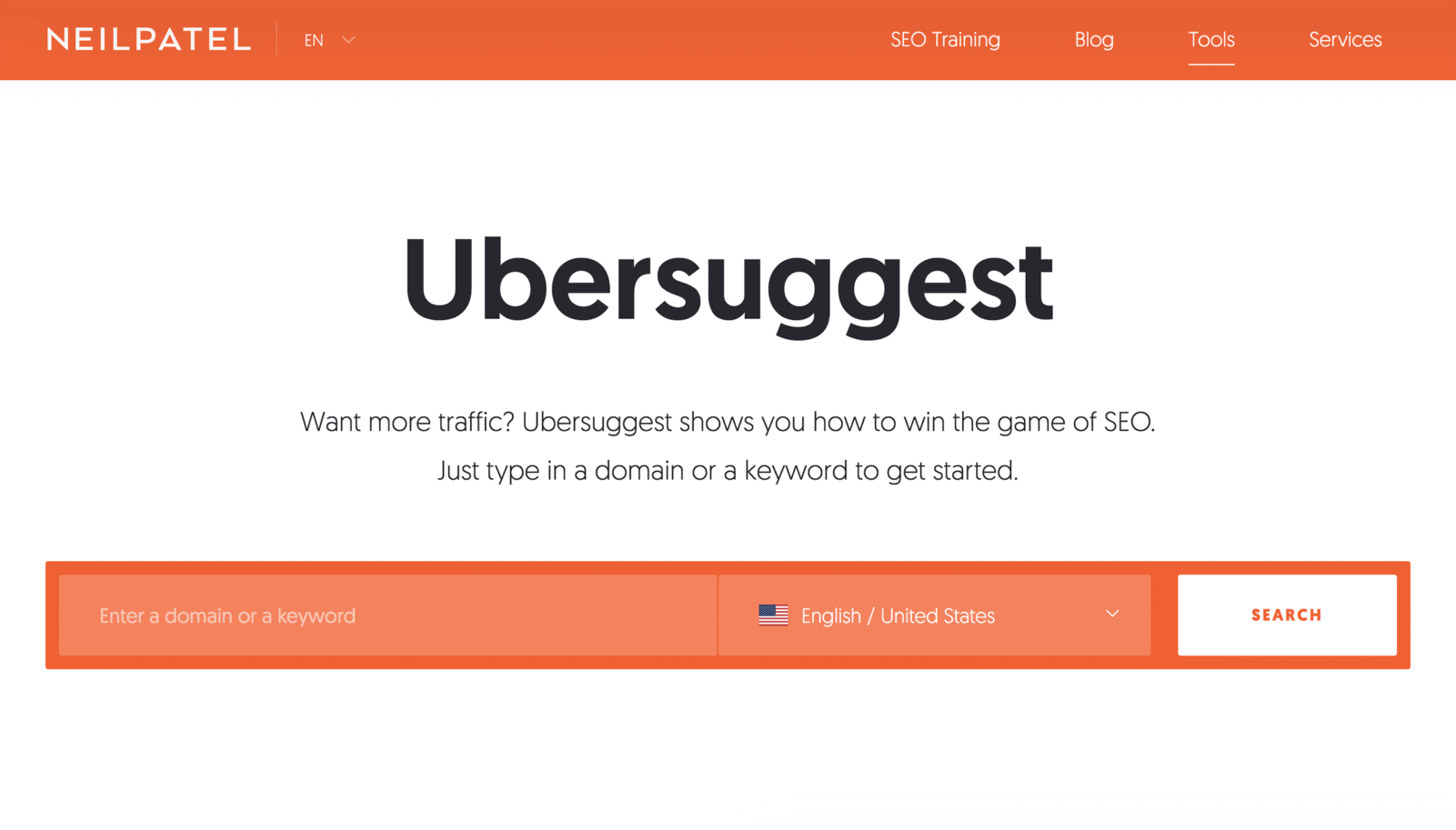
Ubersuggest still generates keyword ideas from Google’s search suggestions. But it also gives you data on each keyword (like search volume, CPC, keyword difficulty and more).
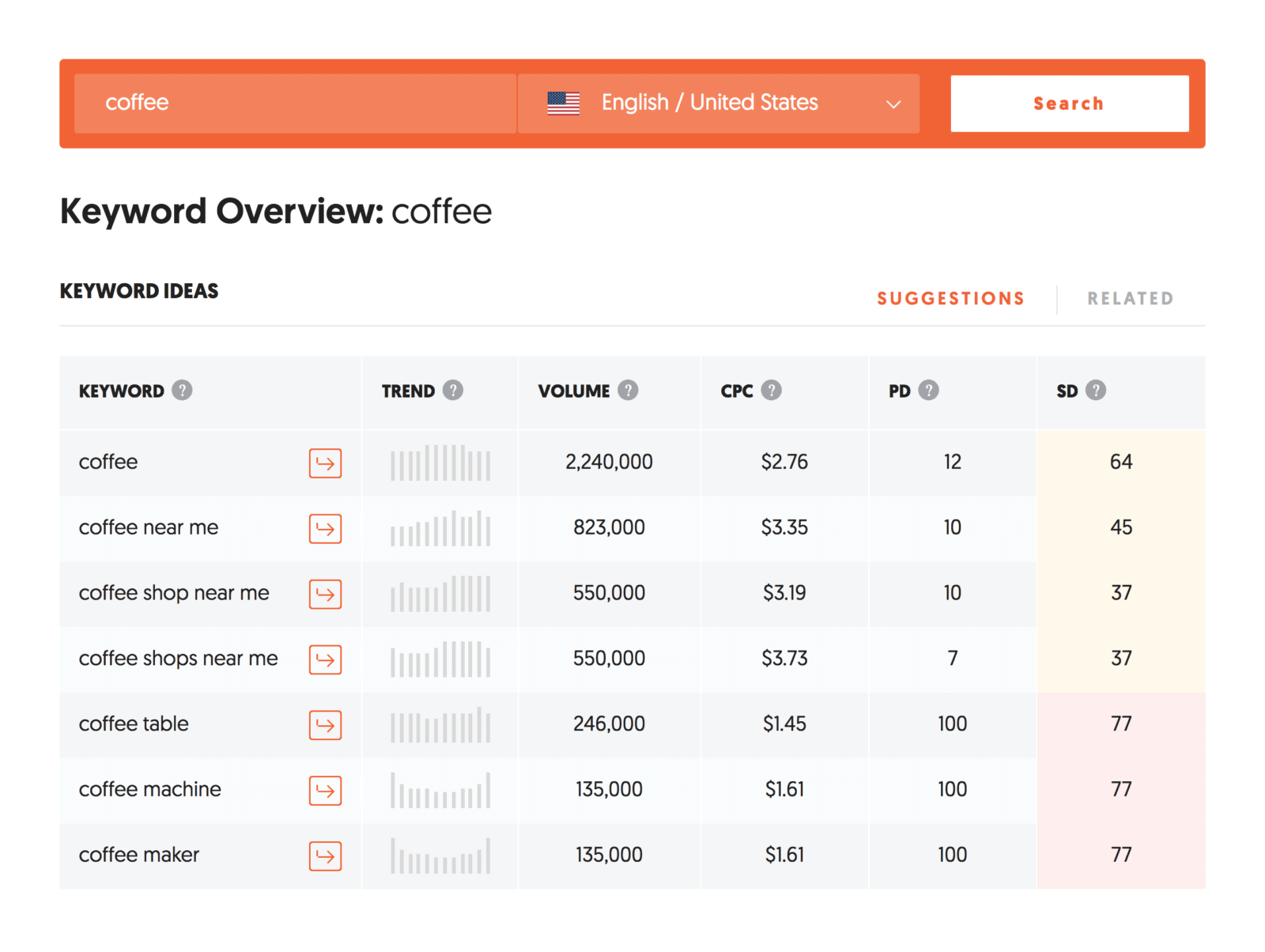
Most people consider Ahrefs a link building tool .
But not as many people know that Ahrefs also has a REALLY good keyword tool.
What’s nice about Ahrefs “Keyword Explorer” is that you get a ton of helpful data on each keyword.
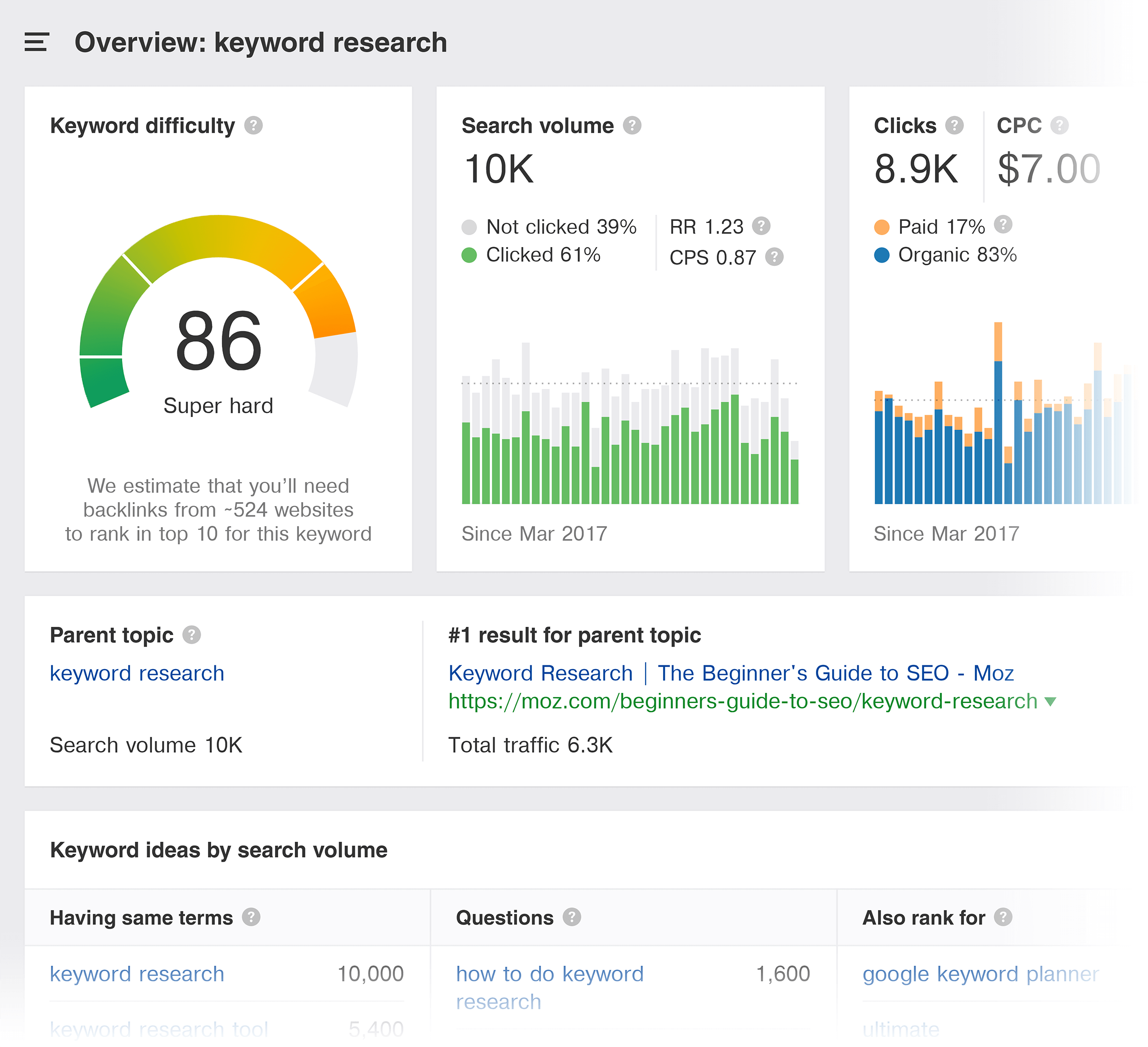
Which can help you decide whether or not it’s a keyword that’s worth going after.
My one gripe with Keyword Explorer is that it’s not great at coming up with new keyword ideas. It usually generates keywords that are just simple variations of the keyword I typed in.

When it comes to drilling down to a single term, you can’t do much better than the features found in Ahrefs Keyword Explorer.
Chapter 4: Keyword Difficulty

How do you know if a keyword is too competitive to rank for?
It’s a good question to ask.
Because if you choose a keyword that’s super competitive, you might have trouble getting past Google’s third page.
But if you can find a keyword without a ton of competition, you have a good chance of cracking the top 3.
With that, here’s how to figure out a keyword’s SEO difficulty.
Long Tails Are (Usually) Less Competitive
If your site is brand new.
Or if you want to focus 100% on keywords that aren’t competitive.
Then you DEFINITELY want to target long tail keywords .
I’ll explain…
Most people in SEO (myself included) divide keywords into three main categories: head, body and the long tail.
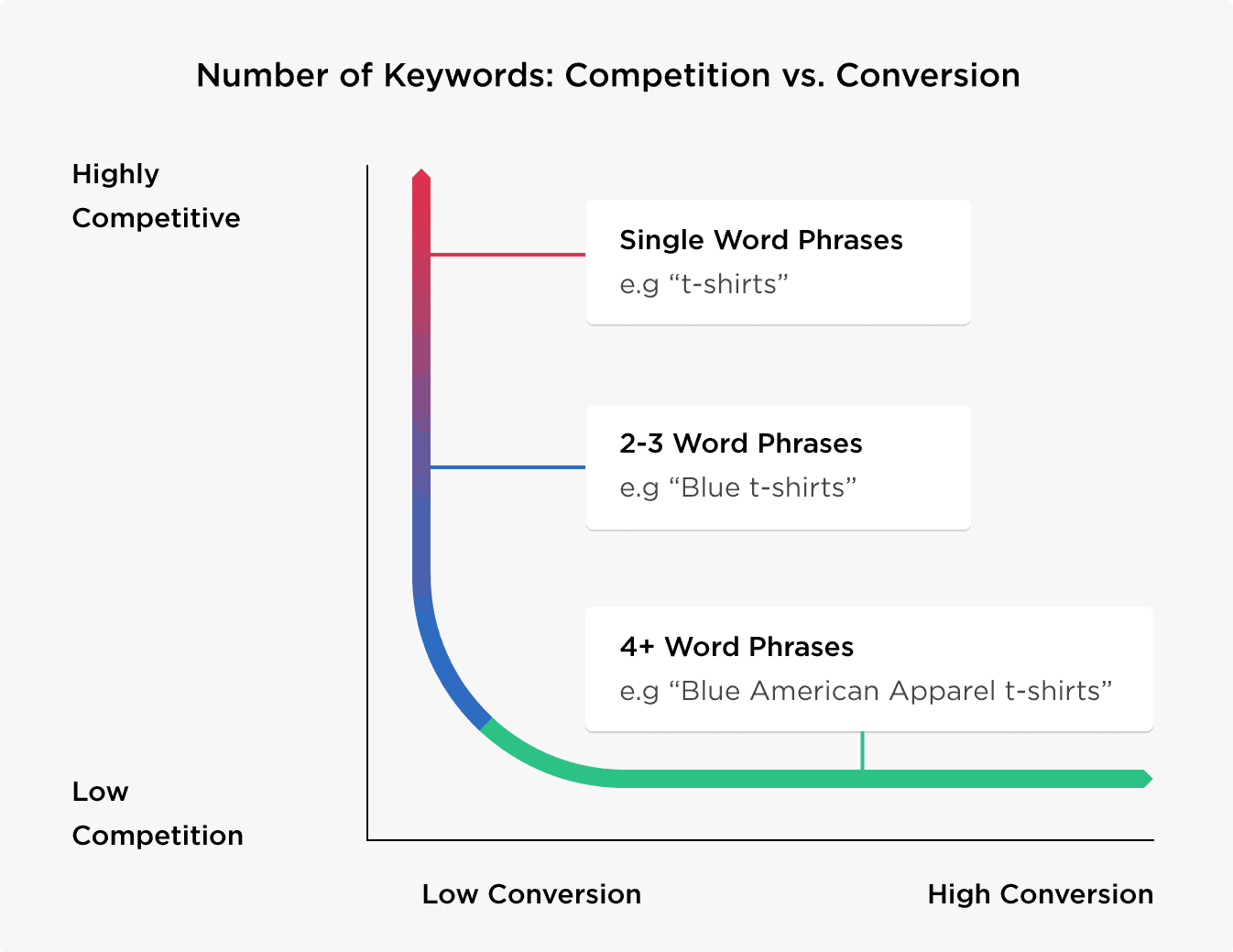
Here’s a breakdown of each keyword type:
These are usually single-word keywords with lots of search volume…and competition. Examples of head terms are keywords like “insurance” or “vitamins”. Because searcher intent is all over the place (someone searching for “insurance” might be looking for a car insurance quote, a list of life insurance companies or a definition of the word), Head Terms usually don’t convert very well.
Body Keywords
Body keywords are 2-3 word phrases that get decent search volume (at least 2,000 searches per month), but are more specific than Head Keywords. Keywords like “life insurance” or “order vitamins online” are examples of Body Keywords. These almost always have less competition than Head Terms.
Long Tail Keywords
Long tail keywords are long, 4+ word phrases that are usually very specific. Phrases like “affordable life insurance for senior citizens” and “order vitamin D capsules online” are examples of long tail keywords. These terms don’t get a lot of search volume individually (usually around 10-200 searches per month). But when you add them together, long tails make up the majority of searches online. And because they don’t get searches for that much, long tail terms usually aren’t very competitive.
There’s no “best” keyword category to focus on. All 3 have their pros and cons.
But when it comes to competition, long tails are usually the least competitive of the bunch.
Authority of Sites on Google’s First Page
Here’s a quick way to evaluate a keyword’s competition level.
First, search for your keyword in Google.
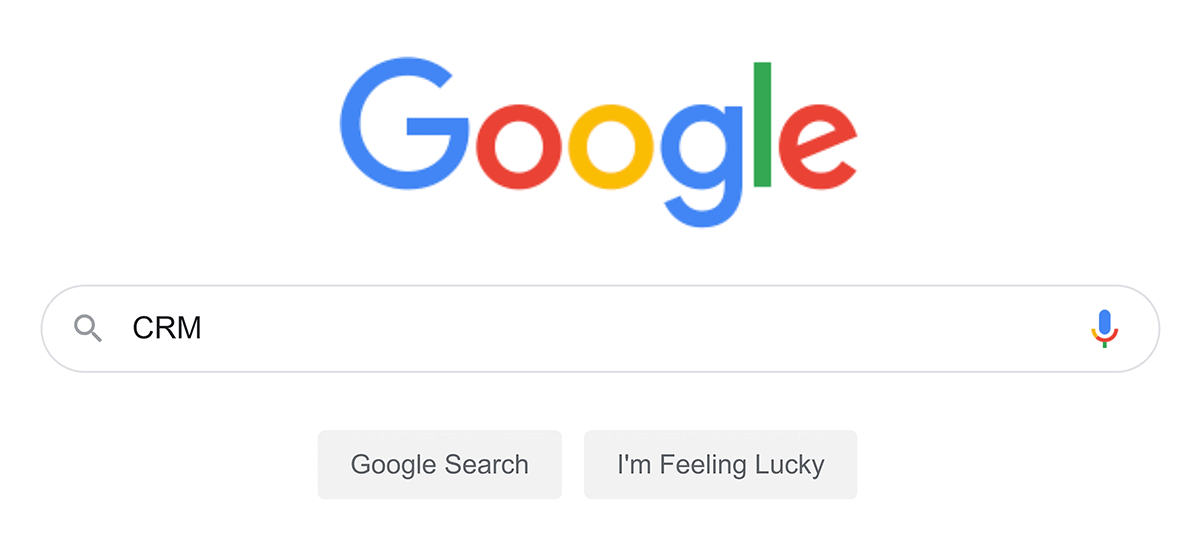
Then, look at the sites ranking on the first page.
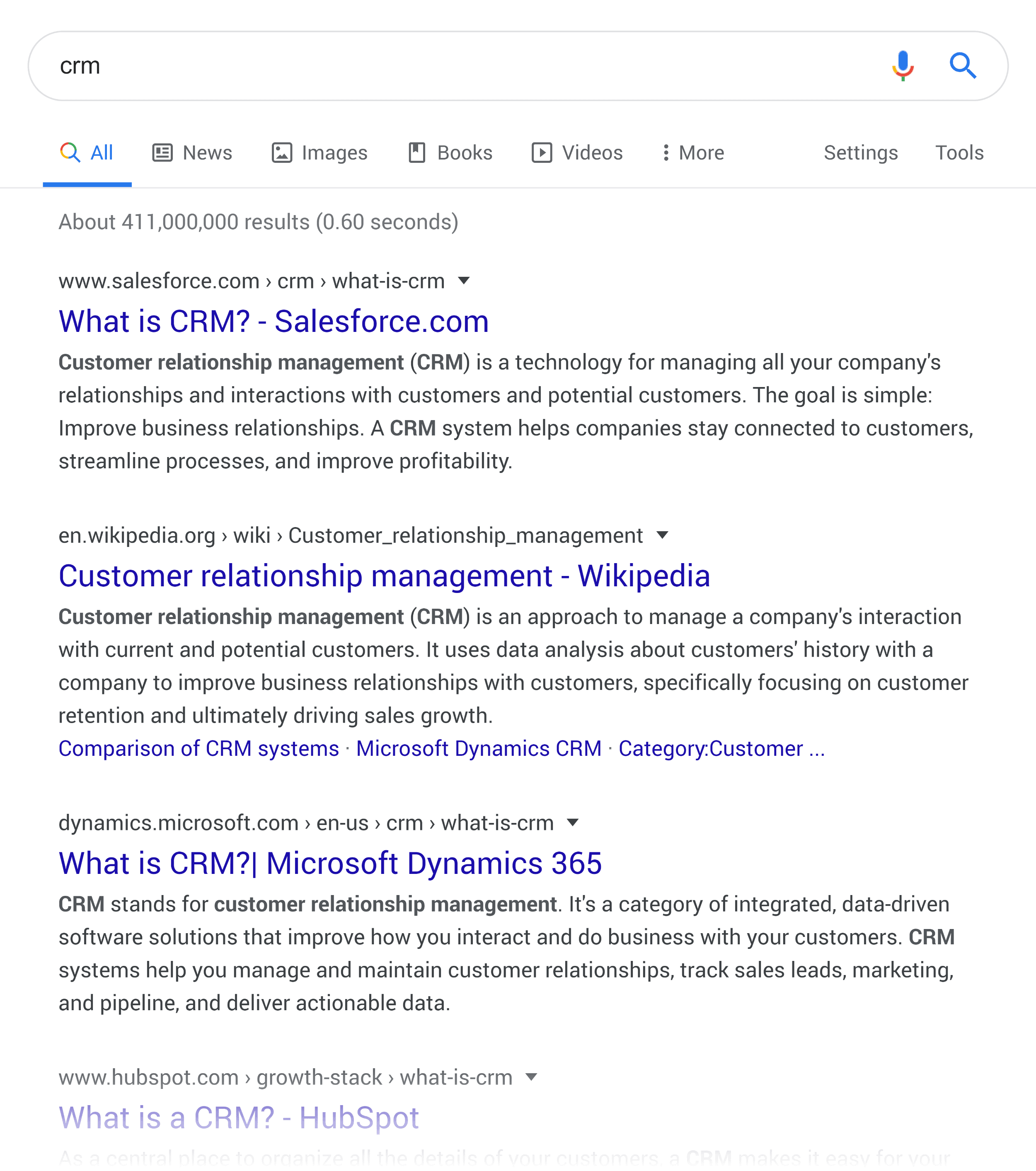
(Not individual pages)
If the first page is made up of uber authority sites (like Wikipedia), then you might want to cross that keyword off from your list:
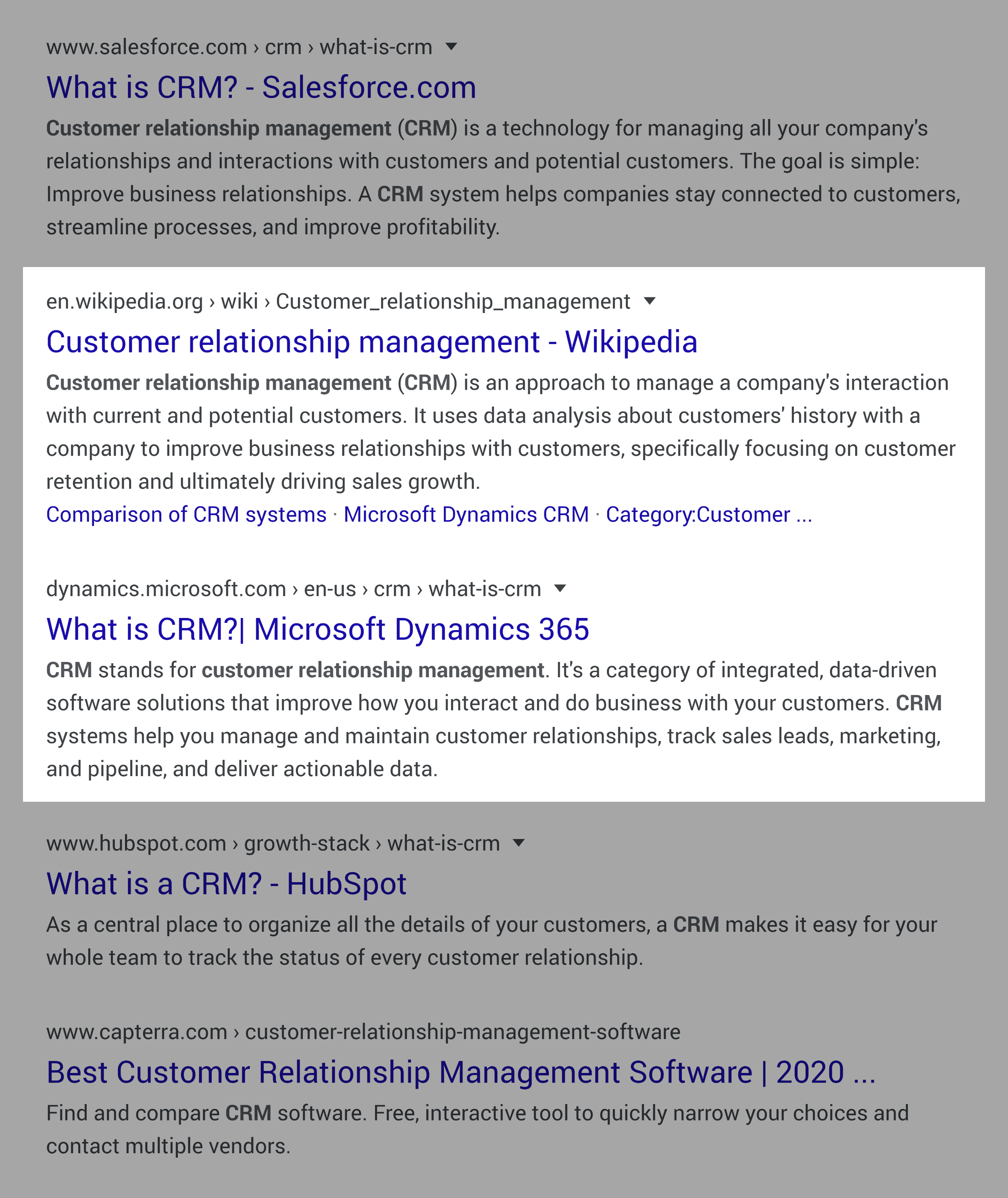
But if you see a handful of smaller blogs on page 1, that’s a sign that you have a shot to hit the first page too.
Keyword Difficulty Inside of Keyword Tools
The vast majority of keyword research tools have some sort of keyword competition feature, including Semrush :
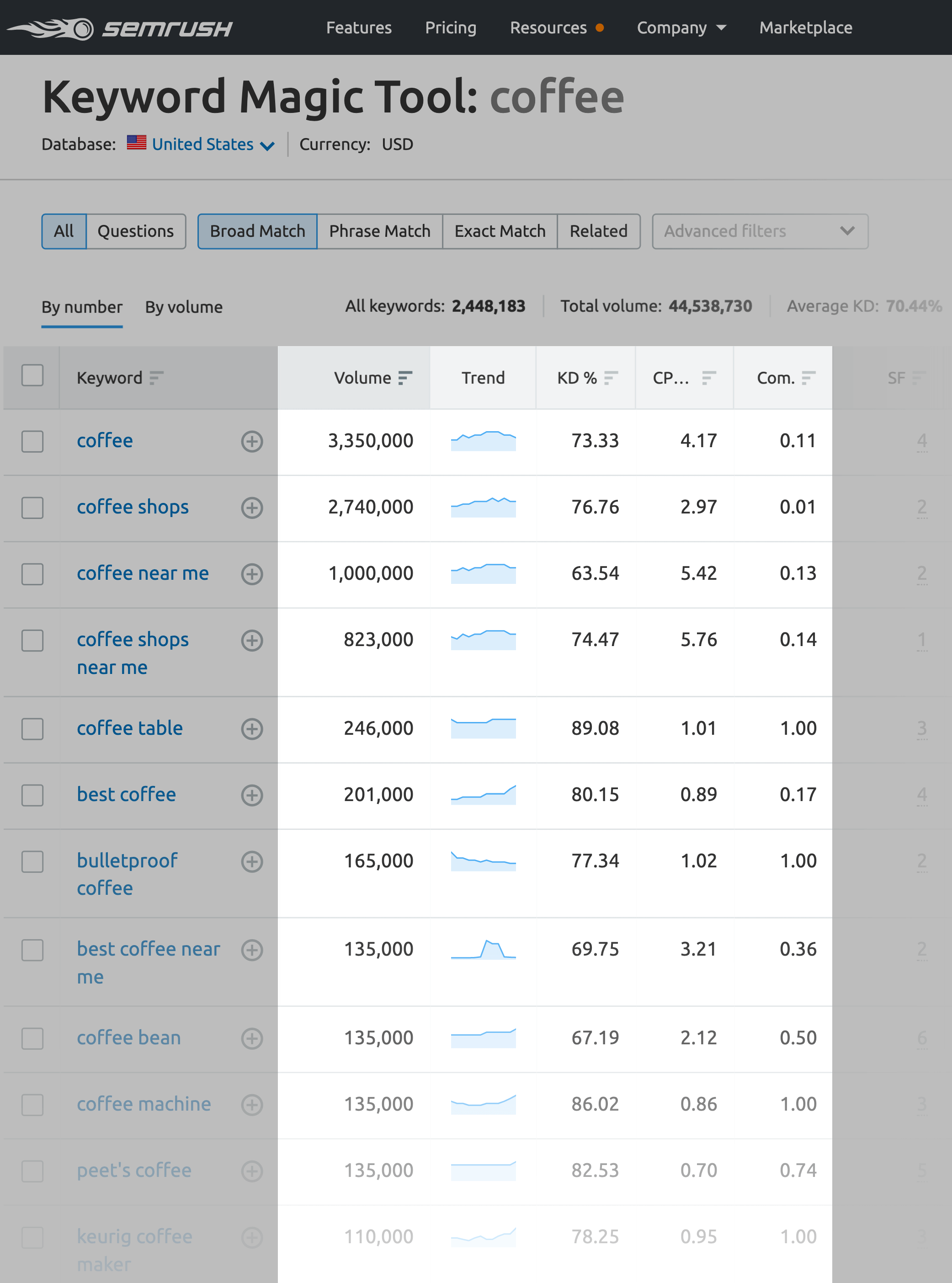
And Moz Pro :
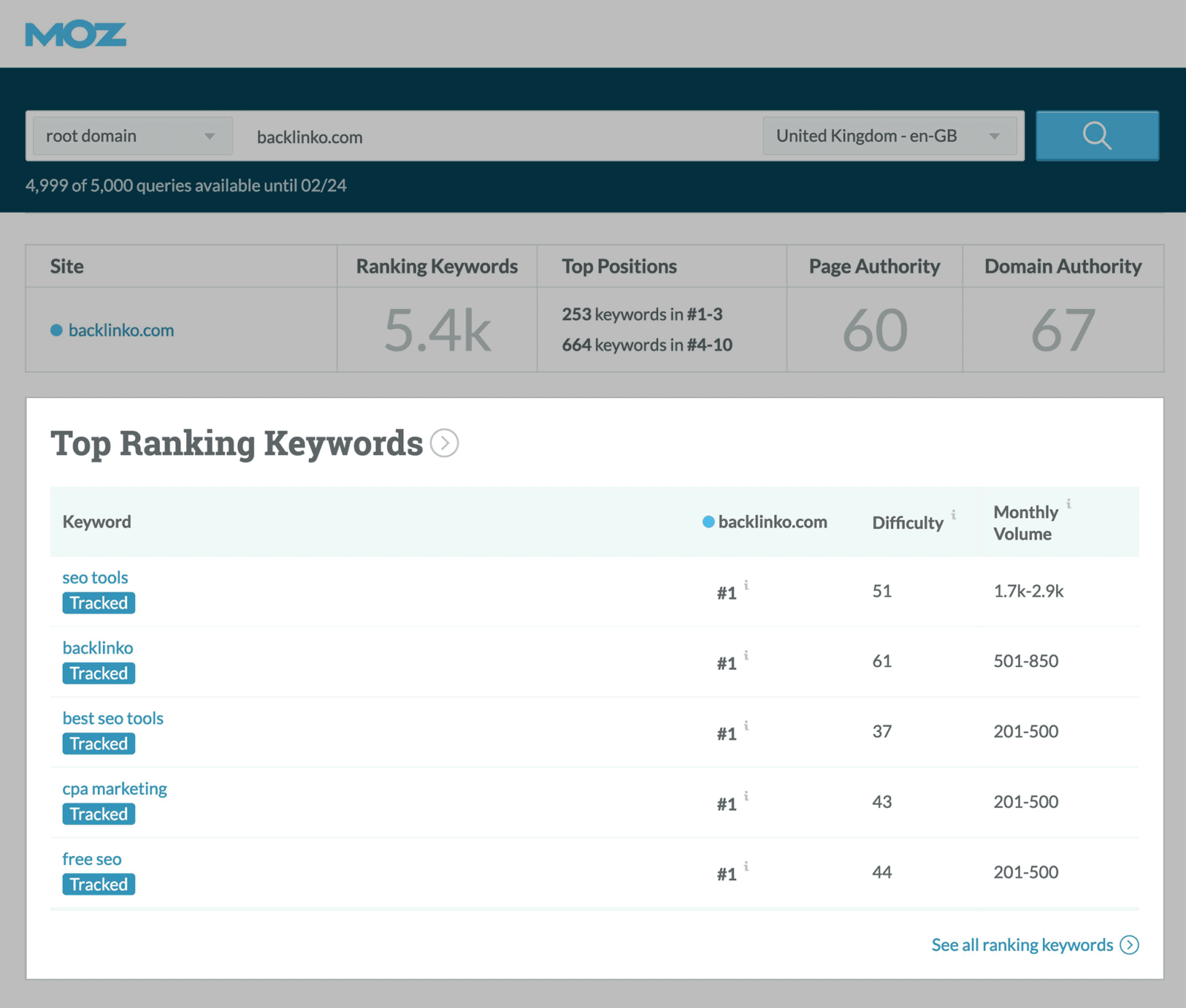
We recently tested a bunch of them . And we found that they all size up keyword difficulty based on a combination of page authority and domain authority. YET they all tend to come up with completely different keyword difficulty scores.
Bottom Line? If your favorite keyword tool includes a keyword difficulty feature, go with that. It may not be perfect. But they do tend to give you a general idea of how competitive a keyword is to rank for.
Believe it or not, but there’s an entire tool dedicated to keyword difficulty: CanIRank .
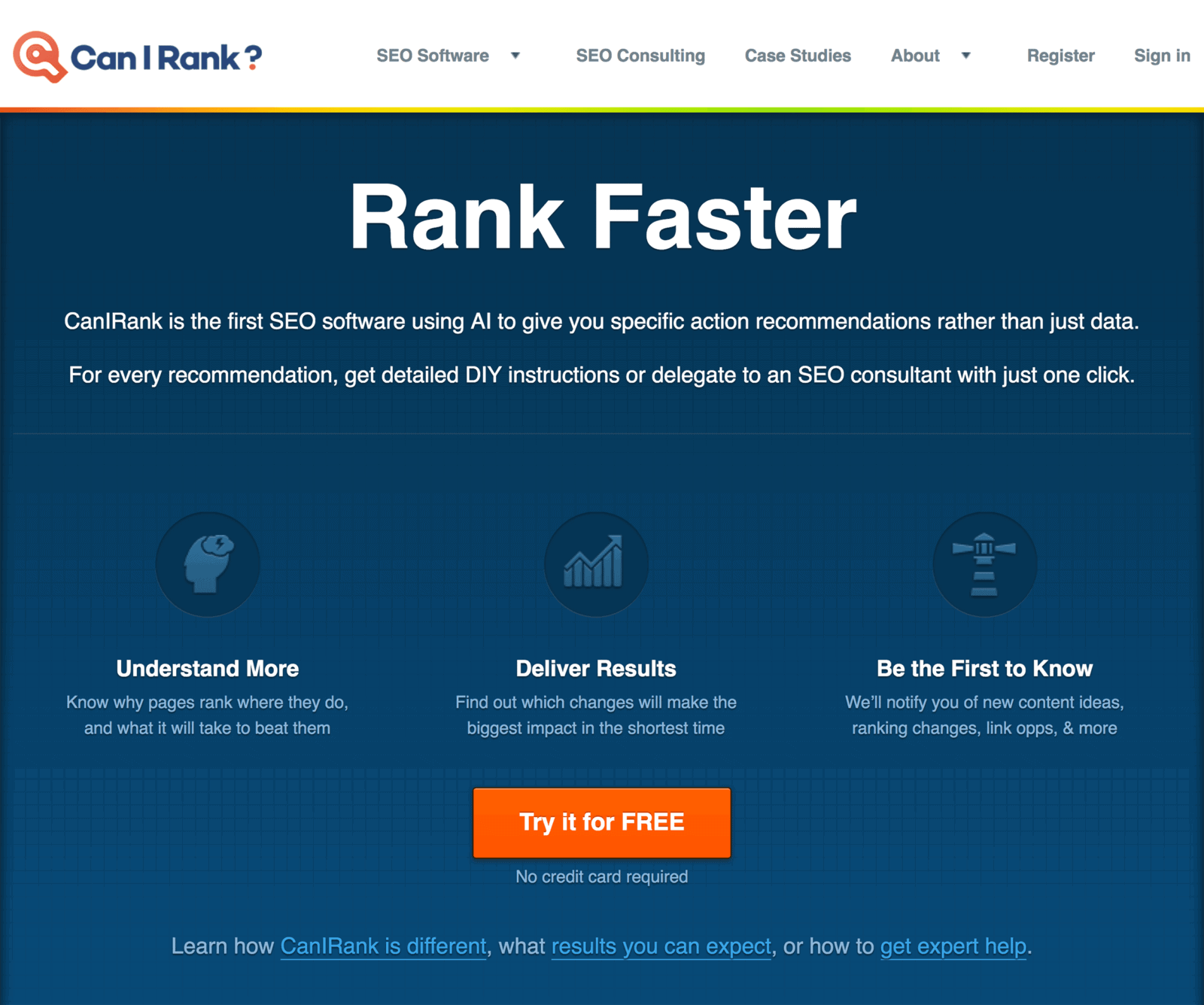
What I like about this tool is that it doesn’t just spit out a keyword difficulty number. Instead, it evaluates a keyword’s competition level relative to your website.
For example, I popped the keyword “SEO” into CanIRank.
And the tool looked at Google’s first page competition compared to my site’s authority . And it gave me a “Ranking Probability” of 90%:
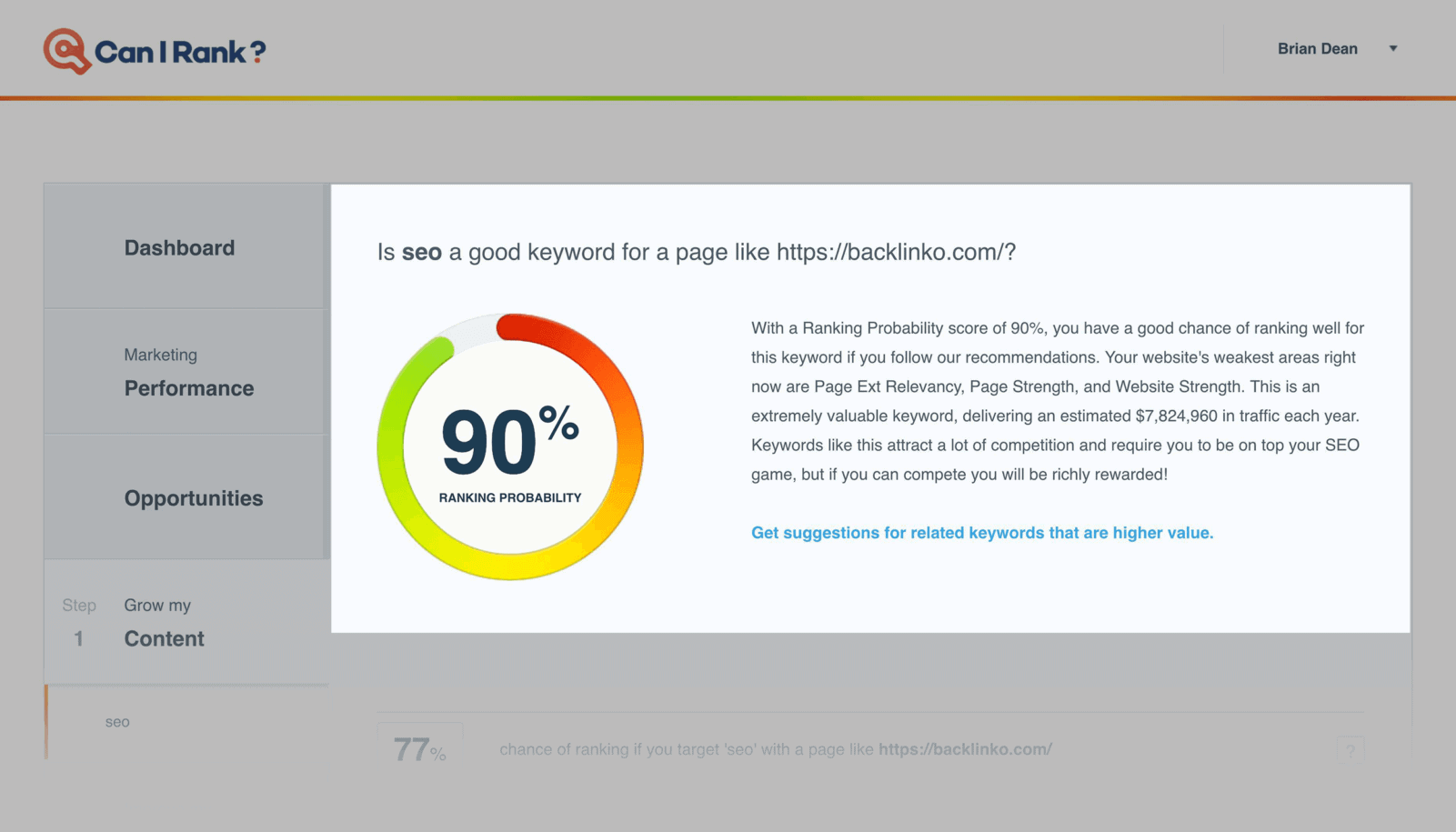
Super helpful.
Chapter 5: How to Choose a Keyword

Now that you have a list of keywords, how do you know which one to pick?
Unfortunately, there’s no tool out there that will tell you: “ This is the best keyword on your list”.
Instead, you need to size up each keyword based on a handful of different factors. Then, pick the keyword that’s the best fit for your business.
Additionally, conducting keyword analysis to ensure reaching the target audience takes time and effort. Lucky for you, Backlinko simplified the process to ease your work.
As you might expect, that’s exactly what I’m going to show you how to do in this chapter.
Search Volume
This is pretty straightforward.
The more people search for a keyword, the more traffic you can get from it.
The question is:
What’s a “good” search volume?
Short answer: it depends.
The long answer:
Search volumes vary A LOT between different industries.
For example, a long tail keyword in the fitness niche (like: “best ab exercises”) gets 10K-100K searches per month:

But a long tail keyword in a B2B space like digital marketing (like: “best seo software”) only gets 100-1K monthly searches.

That’s why you want to figure out what a “high” and “low” search volume number is in your niche.
Then, choose keywords based on what’s “normal” for your industry.
Organic Click-Through-Rate
It’s no secret that the number of Google searchers that click on an organic search result is way down .
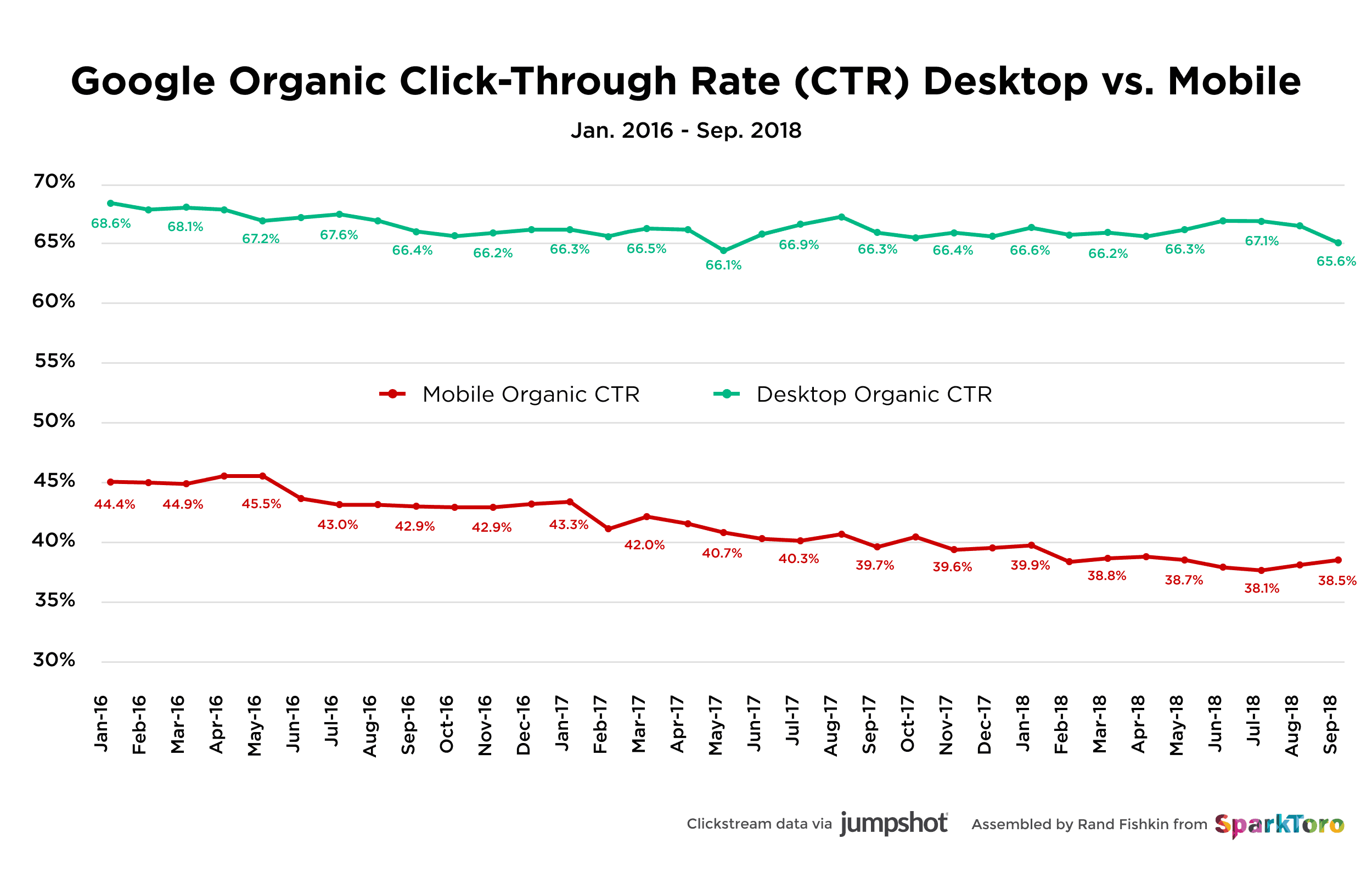
And it’s no wonder why.
Featured Snippets make it so you don’t need to click on anything to get an answer:
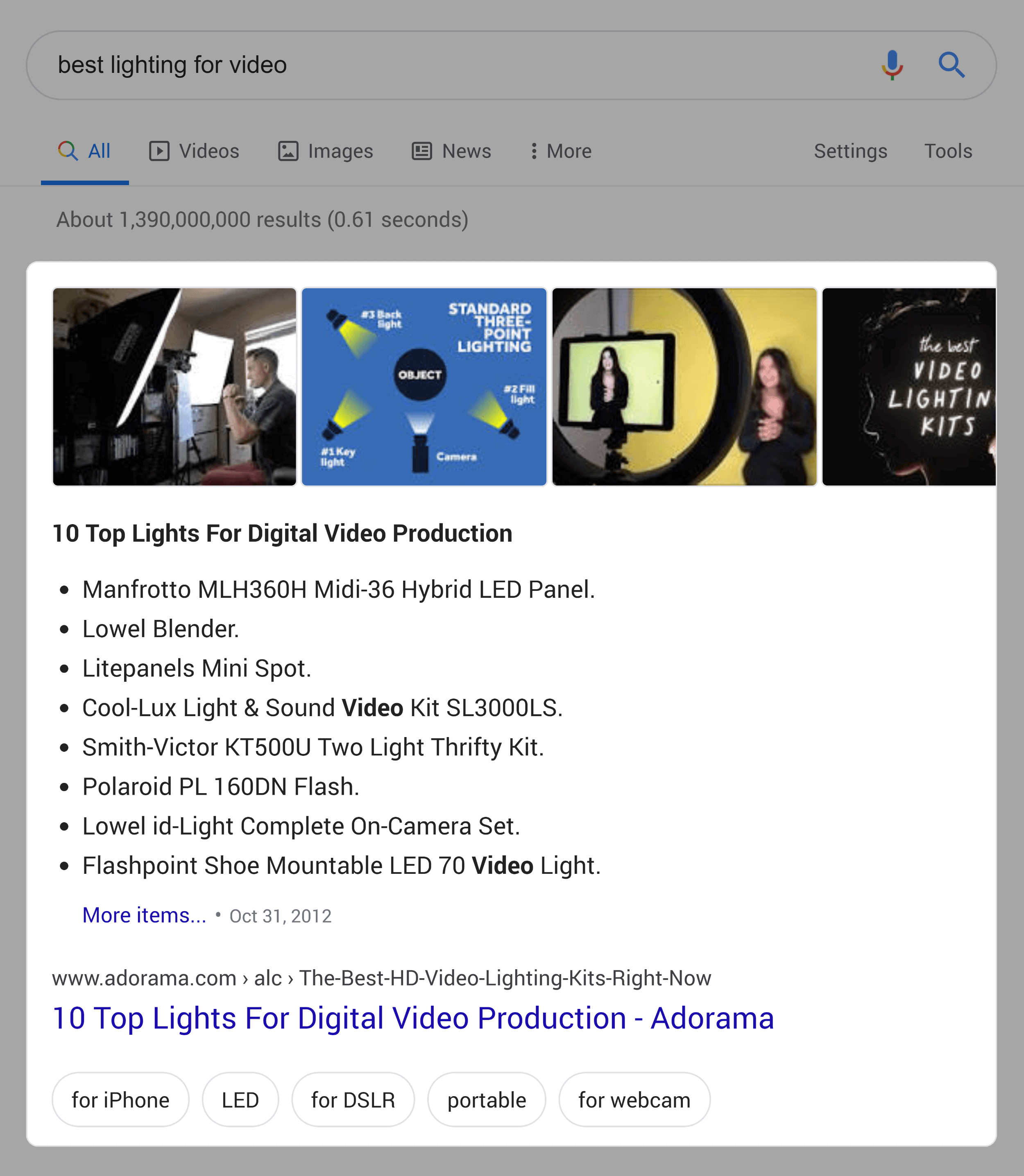
Plus, Google now packs the search results with more ads than ever before:
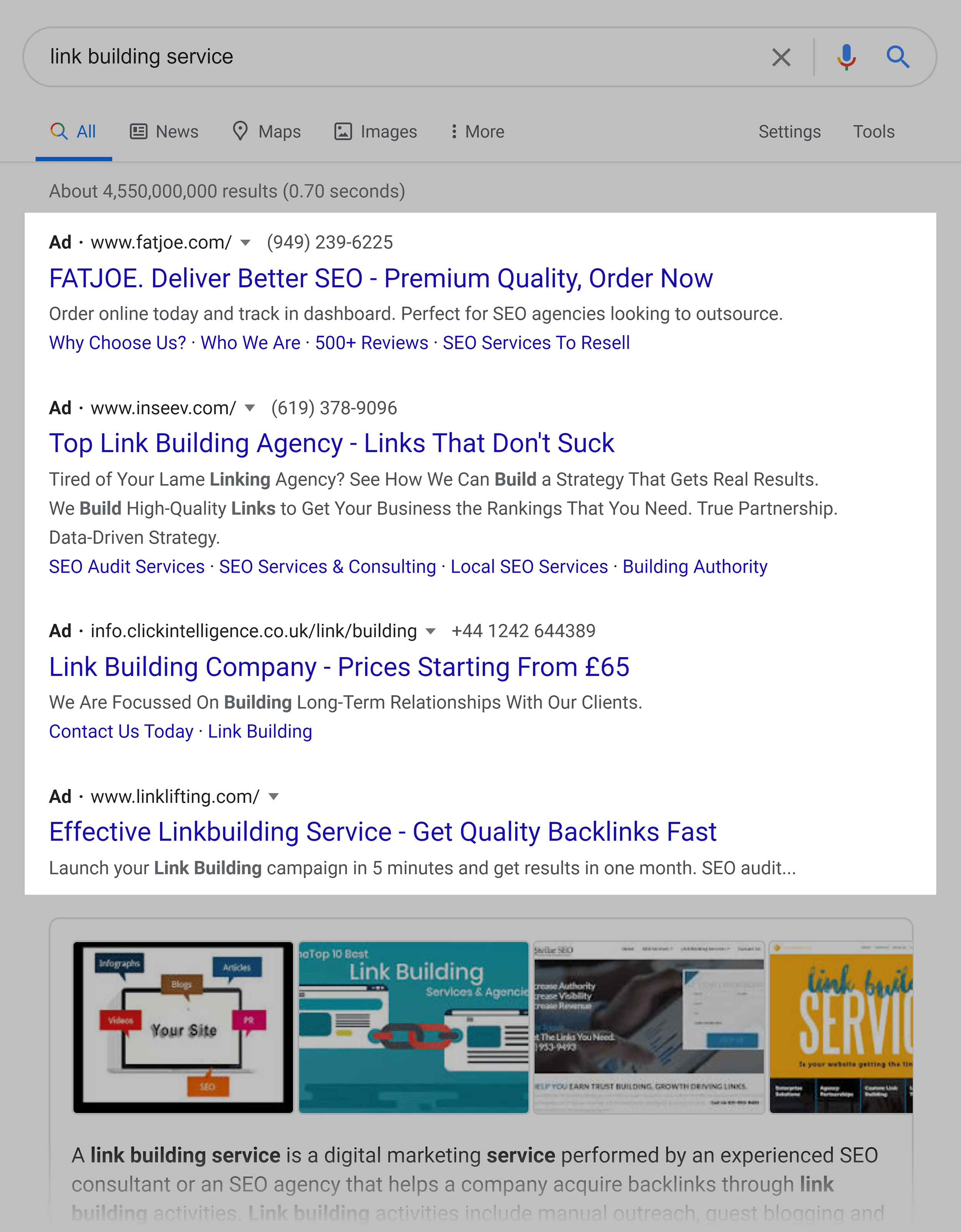
The bottom line?
Search volume only gives you part of the story. To get a full estimate of how many clicks you’ll get from a first page Google ranking, you also need to estimate organic CTR.
Here are two simple ways to do it…
First, you can look at the SERPs (Search Engine Results Pages) for your keyword.
If you see a lot of stuff on the first page (like a Featured Snippet and multiple Google Ads), then you know that you’re not going to get a ton of clicks… even if you rank #1.
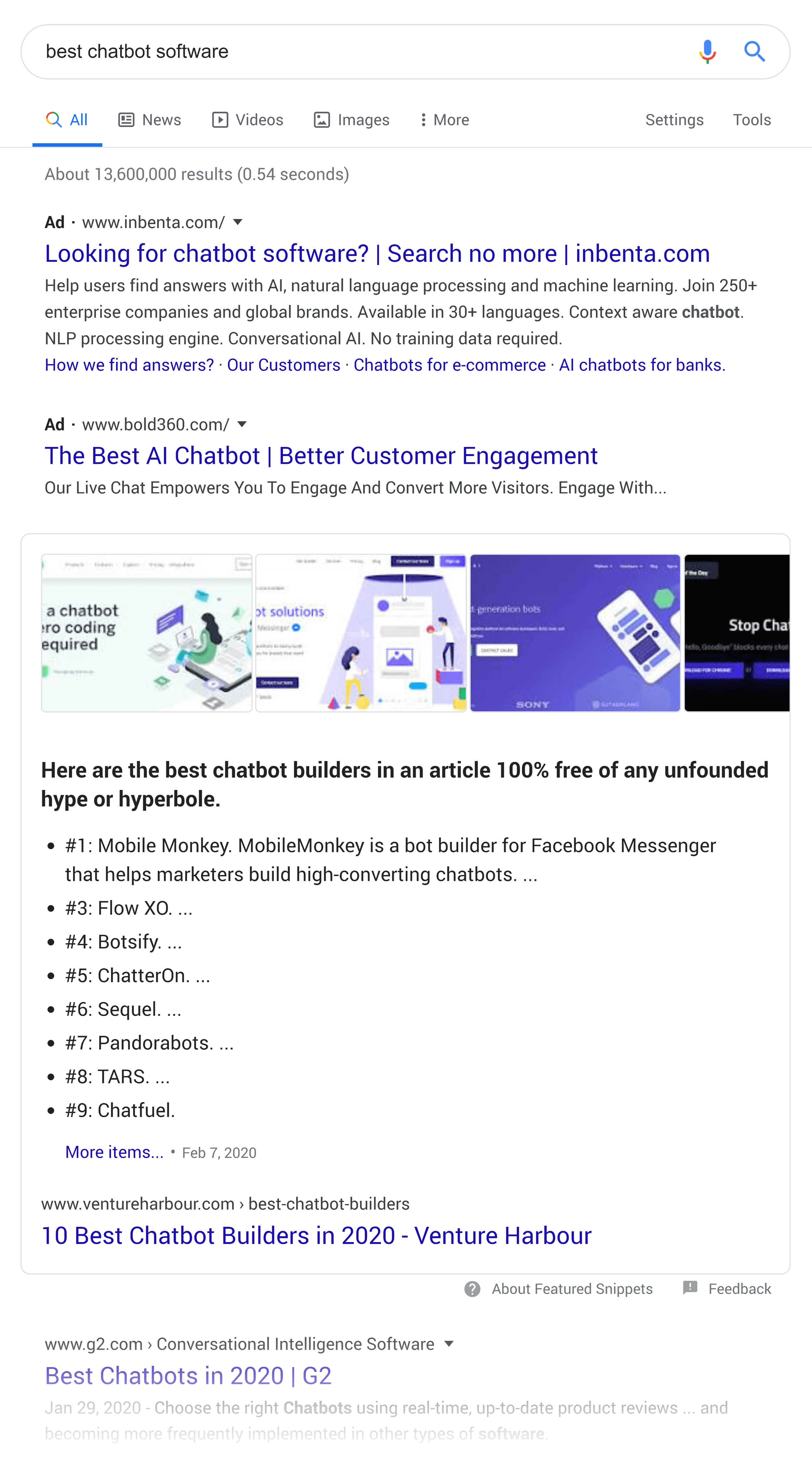
Second , you can use a tool.
Ahrefs and Moz pro both estimate organic CTR.
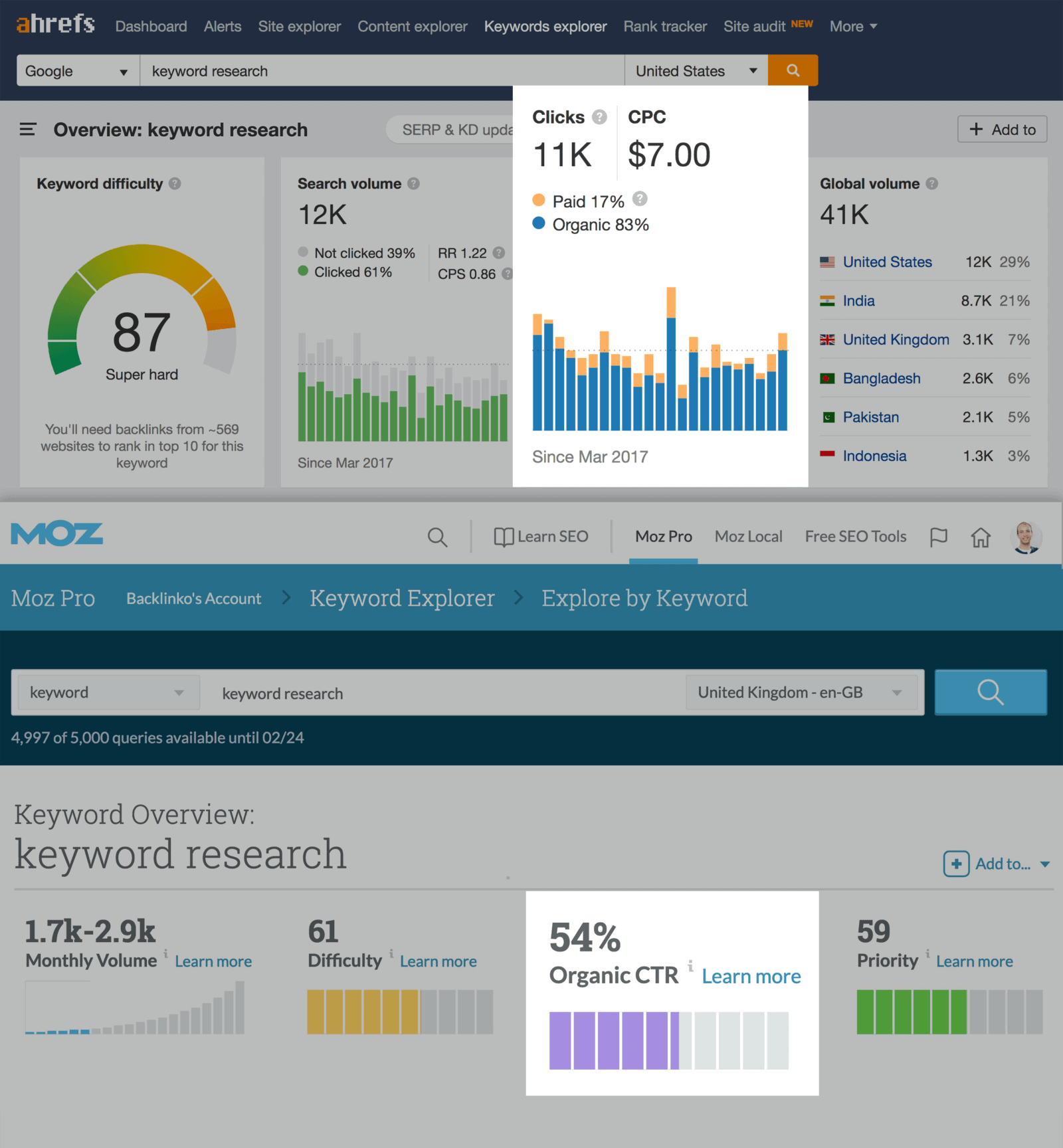
With all that said:
I wouldn’t avoid a keyword just because it has a low CTR. If lots of people search for that term, it might still be worth going after.
If your site is new (or doesn’t have a ton of links yet), target low-competition terms at first.
Then, as your site grows in authority, you can start to target more competitive stuff.
When I first launched Backlinko, I targeted almost 100% long tail keywords (like: “how to get backlinks”).
And because I didn’t have a ton of sites to compete with, I was able to get some organic traffic rolling in within a few weeks. Which helped me achieve some early SEO success.
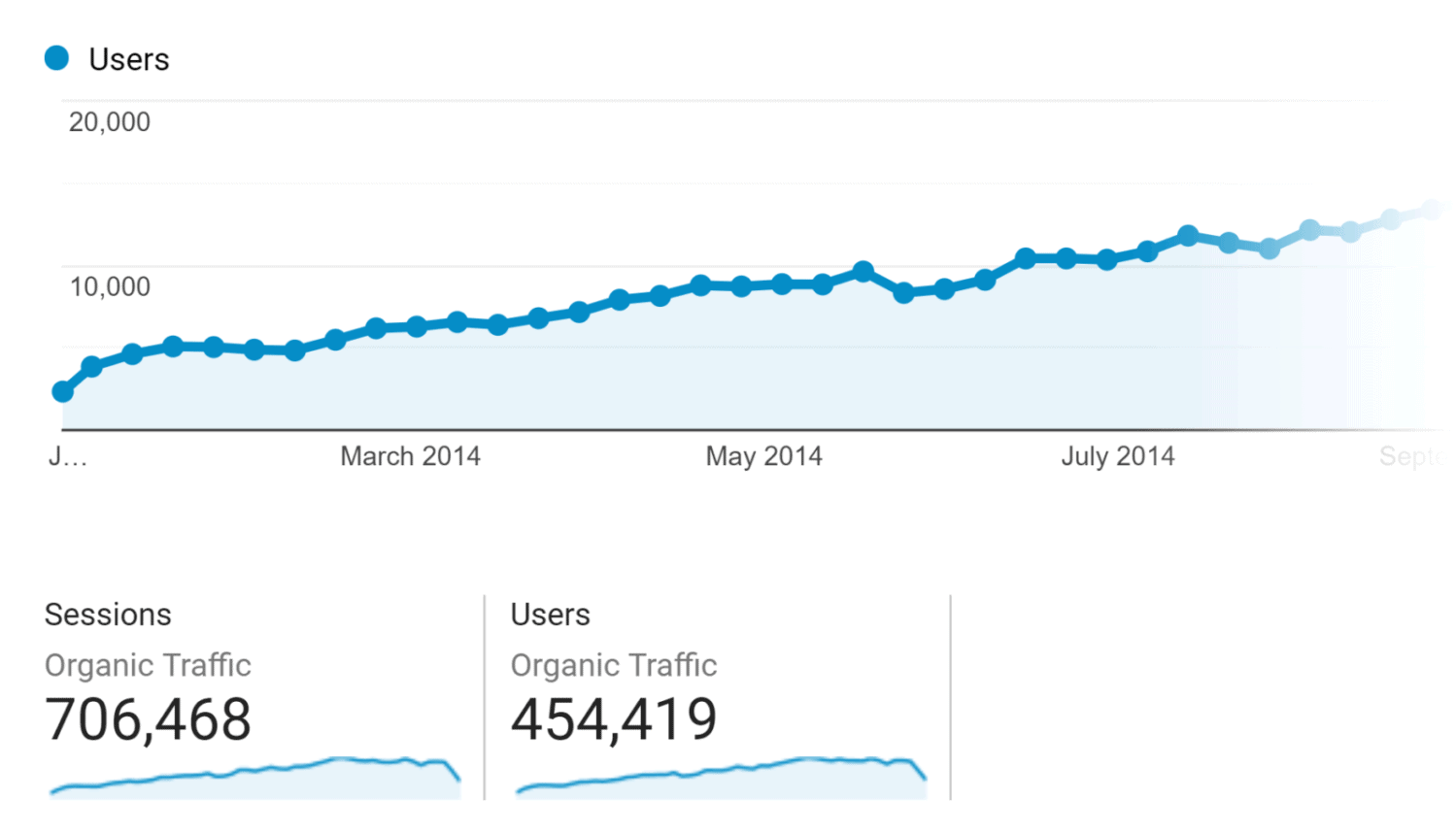
Today, my site has backlinks from over 37k different domains:

So I can target more competitive keywords (like: “YouTube SEO”).
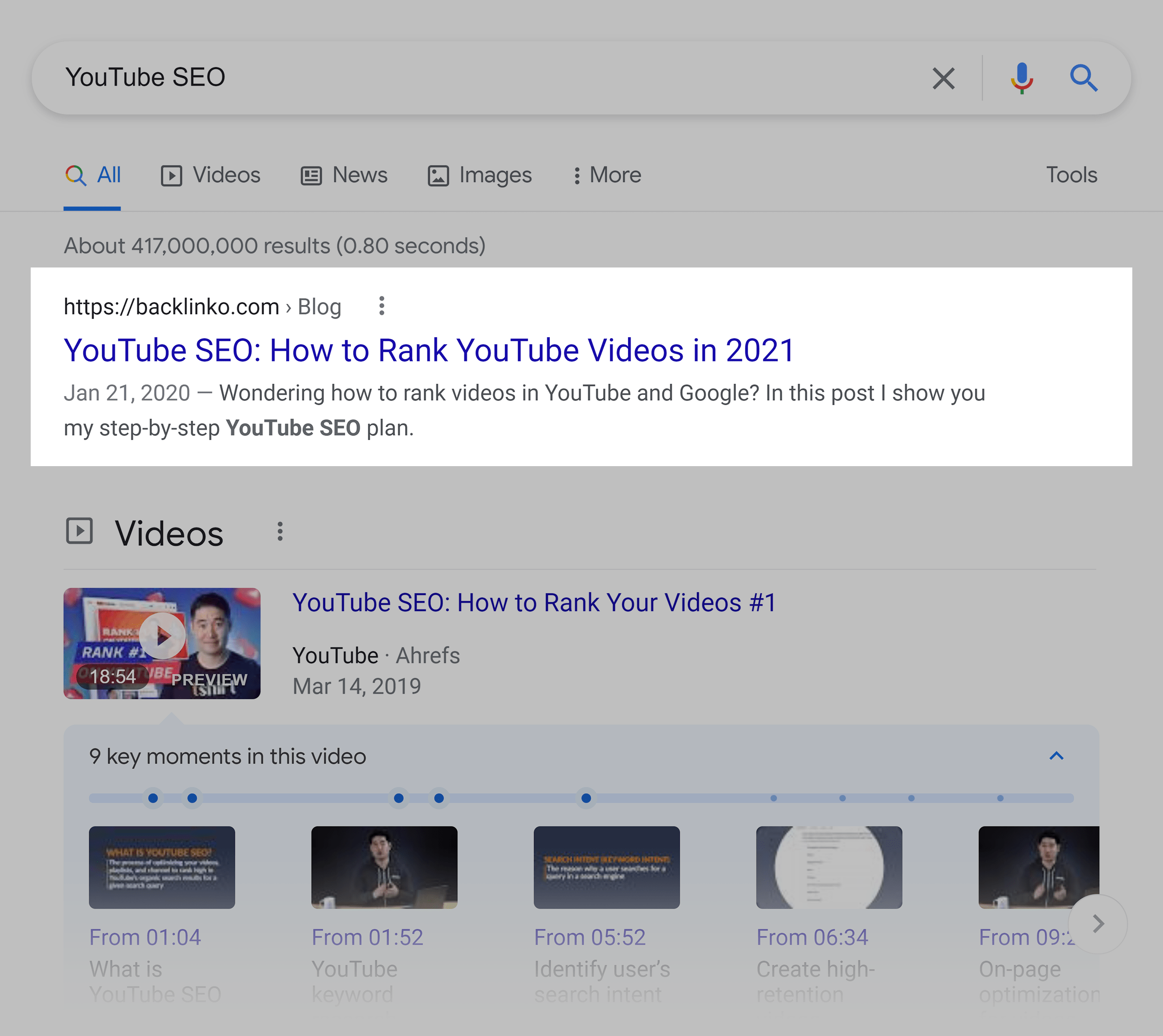
CPC (cost per click) is a single metric that answers one important question:
Do people searching for this keyword actually spend money?
So yeah, search volume is nice and all.
But if that keyword has zero commercial intent, then there’s no point in targeting that term.
Plus, you can sometimes get a great ROI from a keyword that doesn’t get that many searches… if the CPC is high enough.
For example, one of my target keywords is “link building services”.
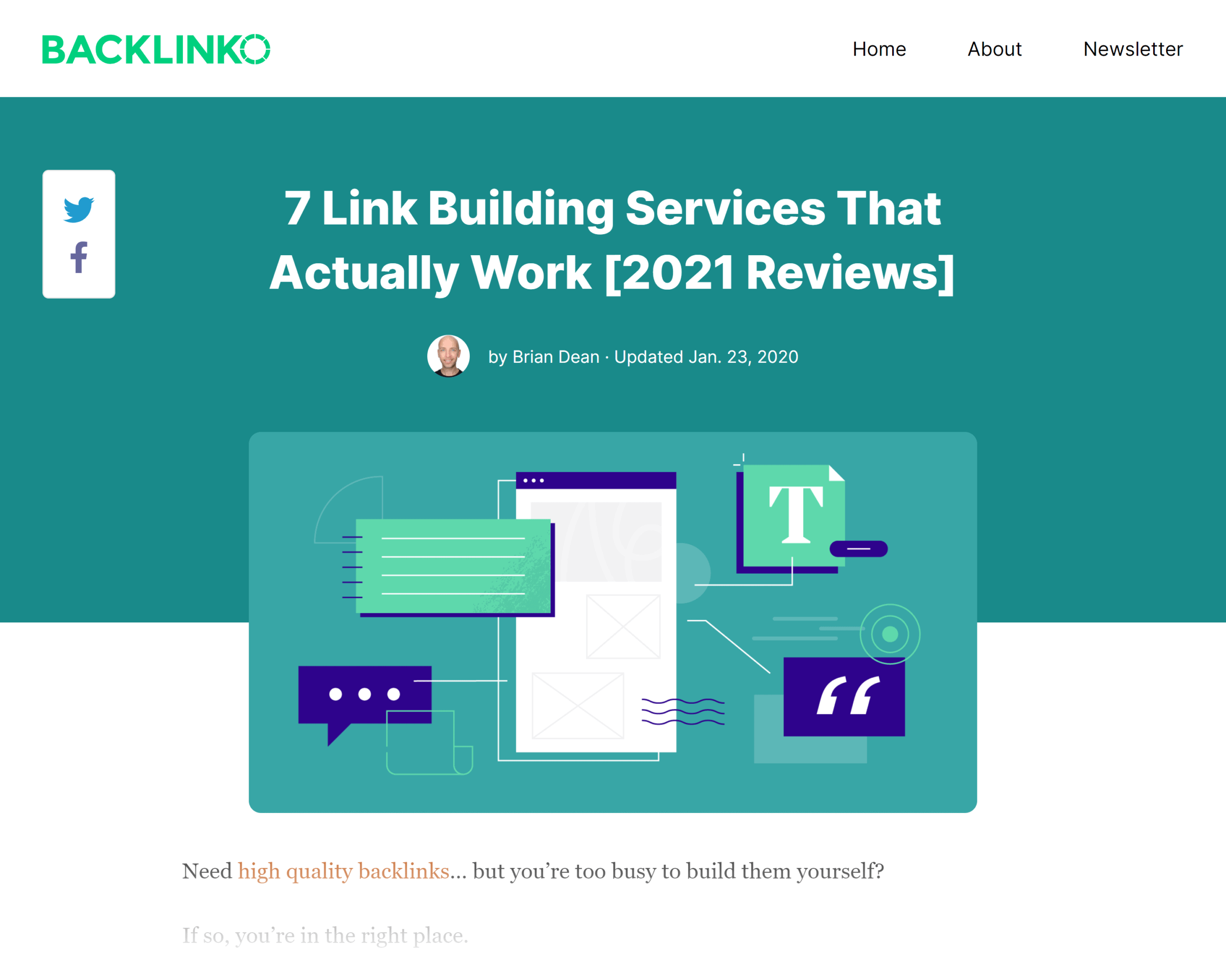
According to Ahrefs, this keyword gets 1.3K searches per month.
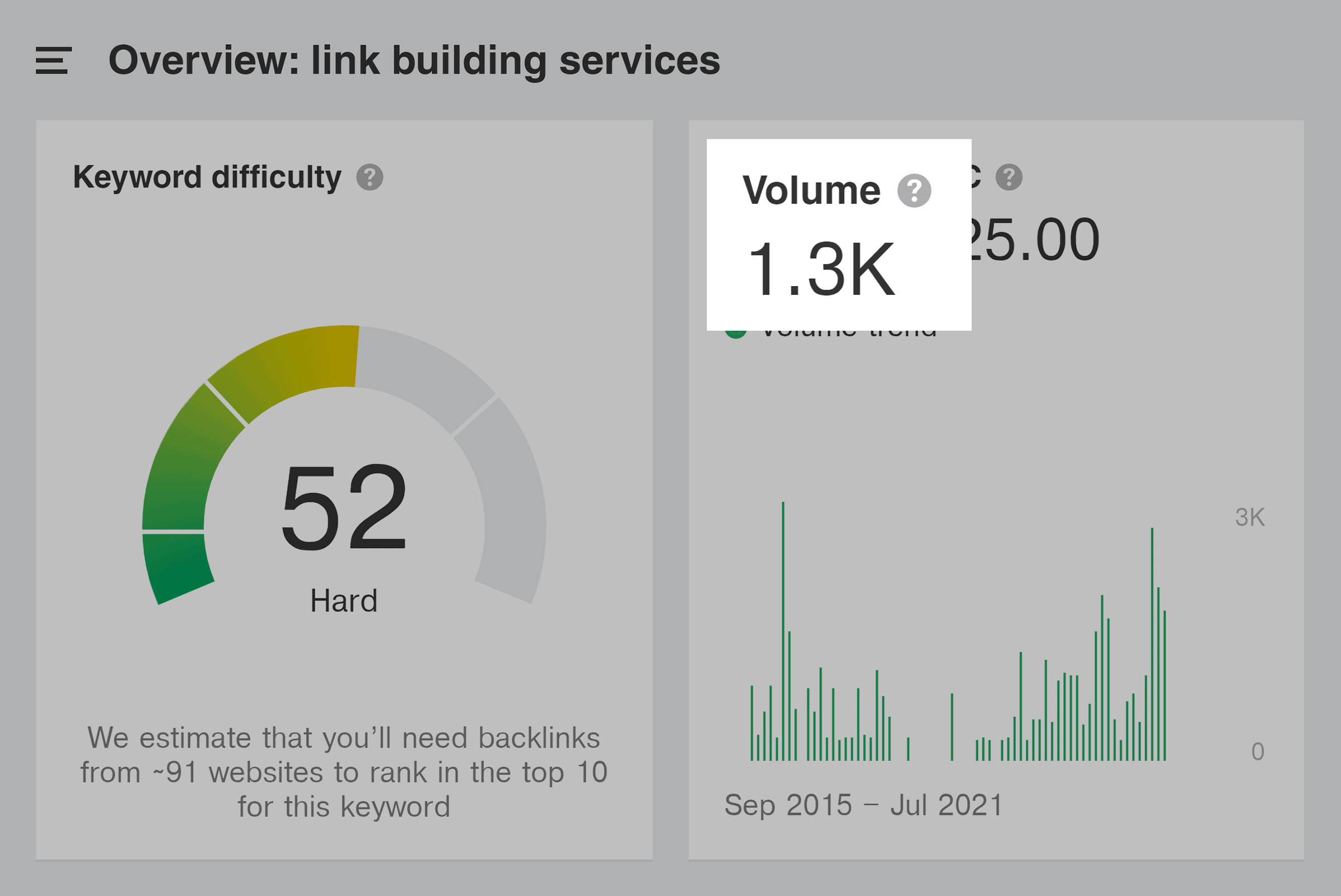
So if I ONLY looked at search volume, I’d say: “This is a horrible keyword”.
That’s why it’s super important to ALSO look at CPC.
The CPC on that keyword is $25.00.
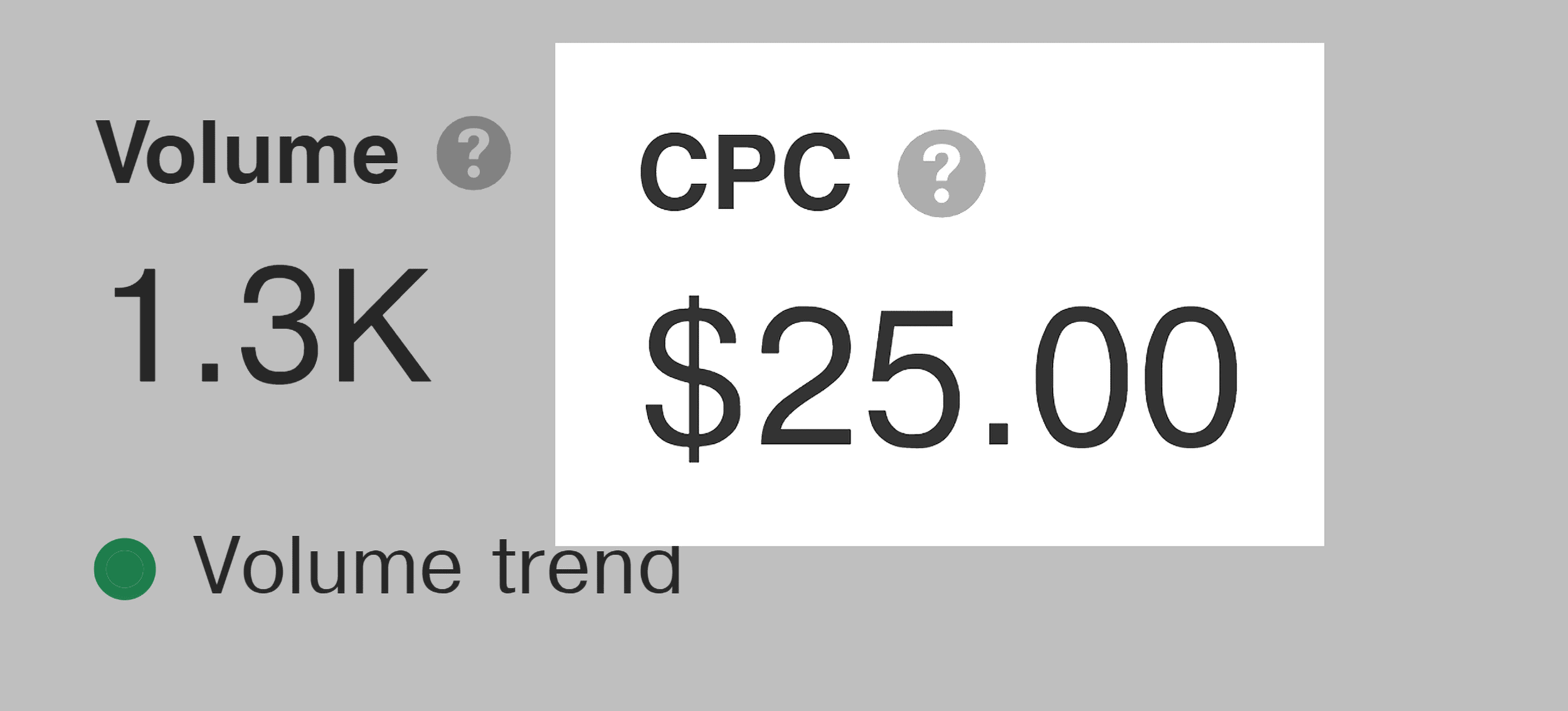
This means that people are spending $25 every time someone searching for that keyword clicks on an ad.
So even though the search volume for that term isn’t that high, the CPC more than makes up for it.
Based on CPC (and the fact that the keyword wasn’t super competitive) I decided to create content optimized around that term.
And that blog post now ranks in the top 3 for my target keyword.
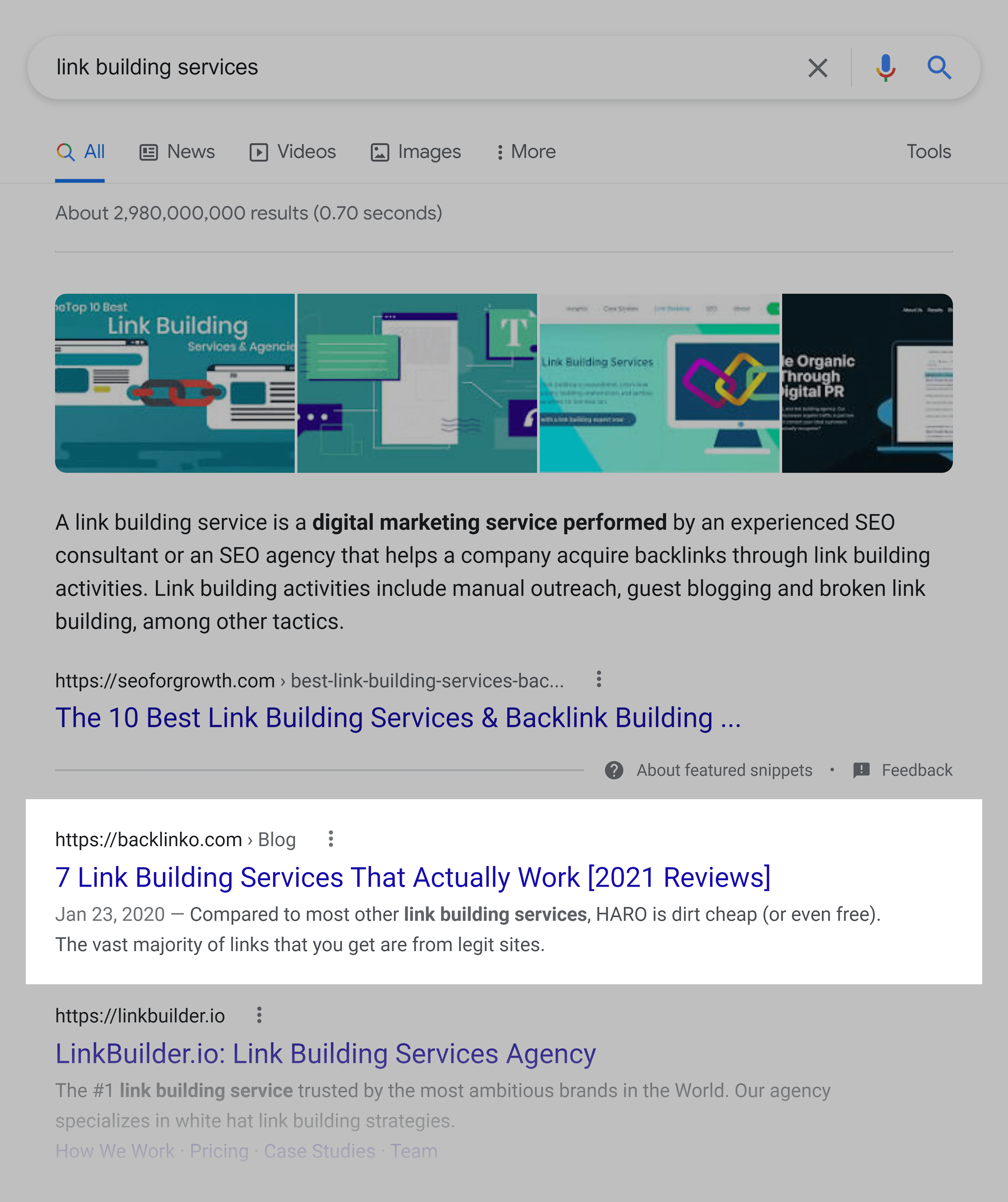
Business Fit
Here’s where you look at how likely it is that someone searching for a keyword will become a customer.
Yup, CPC helps you figure this out. But it doesn’t tell the entire story.
For example, a few weeks ago I came across the keyword: “backlink checker”.
On the surface, this is a great keyword.
It gets a decent amount of searches:

And has a $4.01 CPC:

It’s also not that competitive.
So this keyword is a winner, right?
Well… not really.
You see, Backlinko is an SEO training company. Which means I don’t sell a backlink analysis tool. So even if I DID rank #1 for “backlink checker”, it wouldn’t do me much good.
Contrast that with a keyword like “YouTube SEO”.
This keyword’s CPC is only $2.22.

But considering that I sell a YouTube training course, this term is a 10/10 in terms of business fit.
This is why I wrote a piece of content around that keyword:
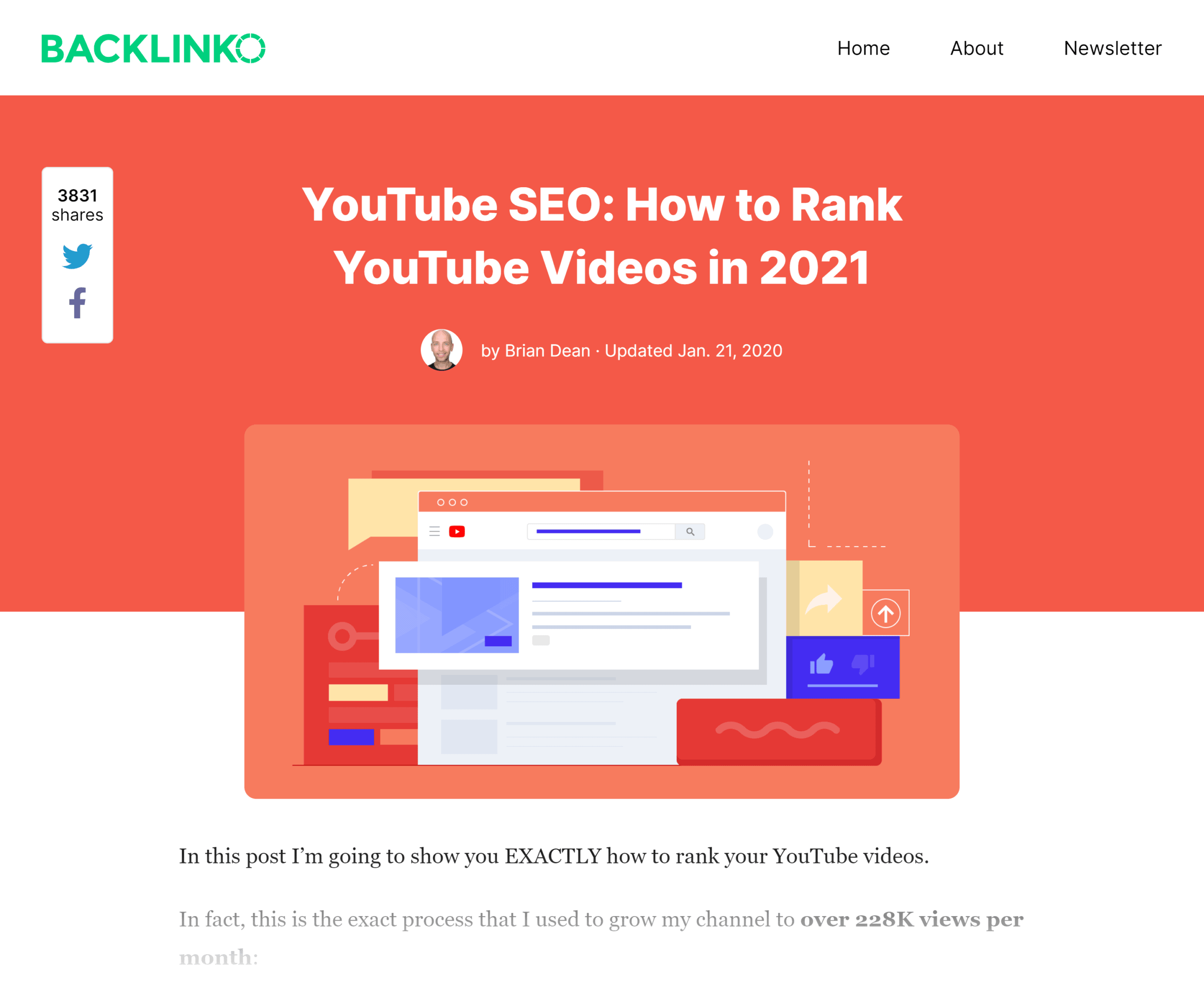
Keyword Trends
Finally, you want to see if your keyword is growing fast… or dying slow.
And the best way to do that? Google Trends .
For example, last year I was considering the keyword: “voice search SEO”.
But I decided to pop that keyword into Google Trends before pulling the trigger.
As you can see, interest in that keyword is growing quickly.
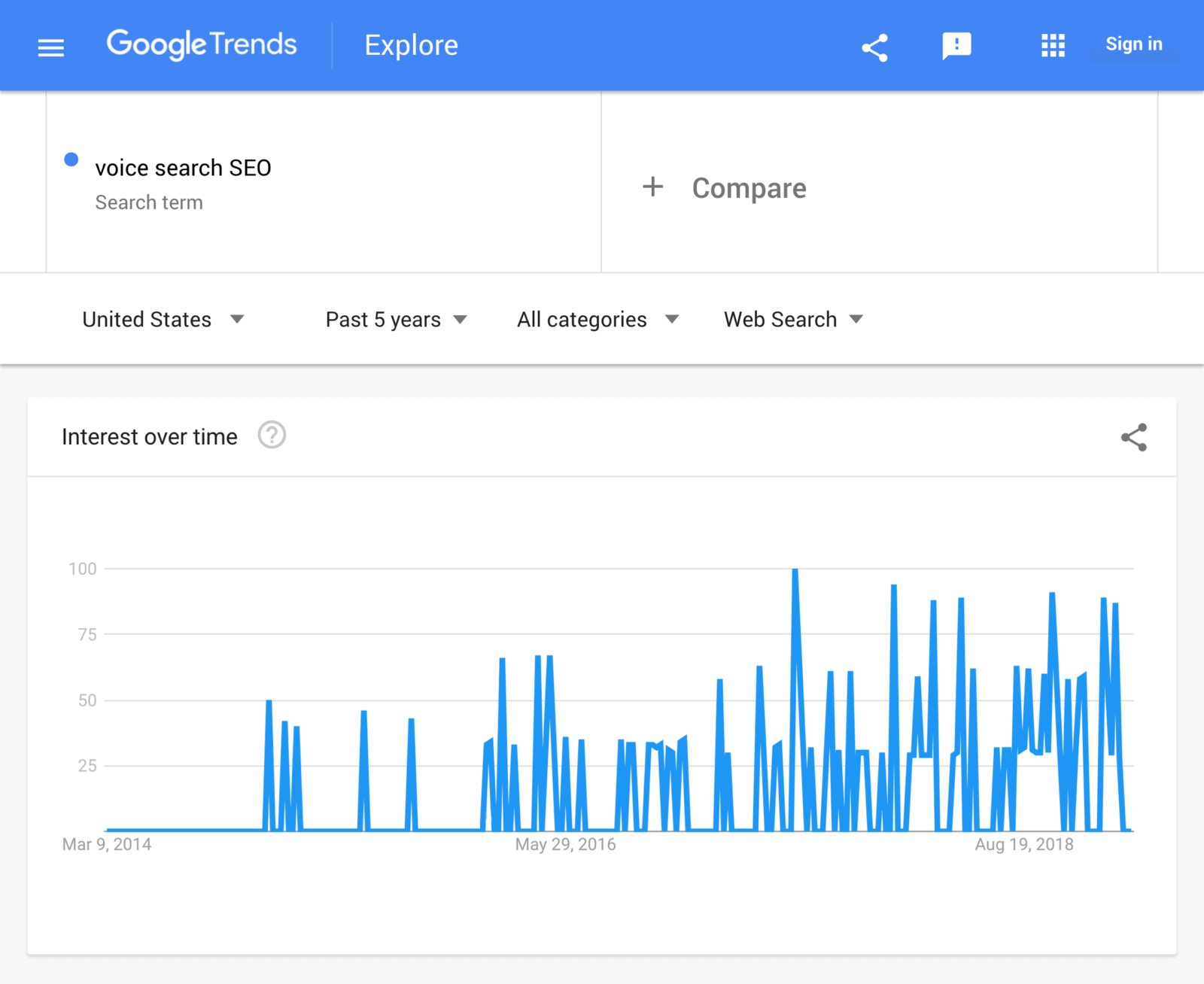
Which is why I optimized this page around that term.

Even though that piece of content only brings in about 1k monthly search engine visitors per month today…

…the trend tells me that traffic to this post should increase over time.
Another key trend to consider is the use of AI for keyword research. Think of integrating ChatGPT for diverse SEO tasks including keyword research. Learn all about how this innovative trend can impact your SEO journey in our guide.
Chapter 6: Advanced Tips and Strategies

Now that you’ve mastered the basics of keyword research, it’s time to cover some cool advanced stuff.
Specifically, I’m going to reveal a bunch of tactical keyword research tips that you can implement right away.
So without further ado, let’s dive right into the tips.
Barnacle SEO
Let’s say that you found the PERFECT keyword.
And you rank in the top 3 for that term.
You’re pretty much done, right?
Actually… not really.
As it turns out, you can get even MORE traction from that keyword with Barnacle SEO.
Barnacle SEO is the practice of using other sites’ authority to rank on the first page.
For example, one of my best keywords (in terms of conversions) is: YouTube SEO.
Like I mentioned earlier, I wrote a post about YouTube SEO . And that post ranks in the top 3 for that keyword.
Sure, a top 3 ranking is great. But it’s still only one spot in the SERPs.
That’s why I created a YouTube video optimized for that keyword…

…a video that also ranks on Google’s first page.
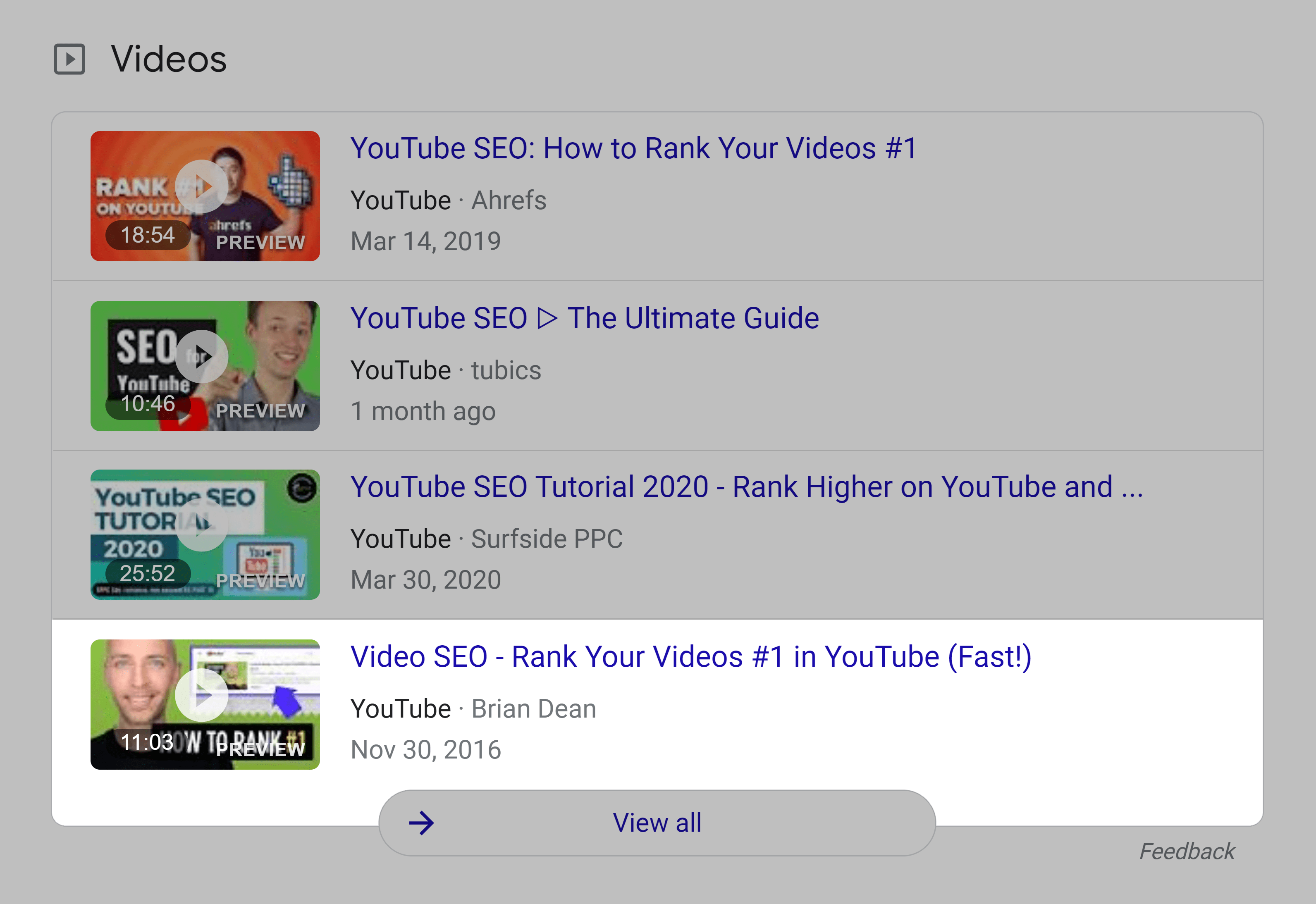
Bottom line? If you find an amazing keyword, you want to take up as much first page real estate as you can. First, create content on that topic on your own site. Then, publish keyword-optimized content on authority sites, like YouTube, LinkedIn, Medium and more.
GSC Keyword Research
The Google Search Console is a goldmine of keyword ideas.
Here’s how it works:
First, login to your GSC account and head over to the “Performance Report”.
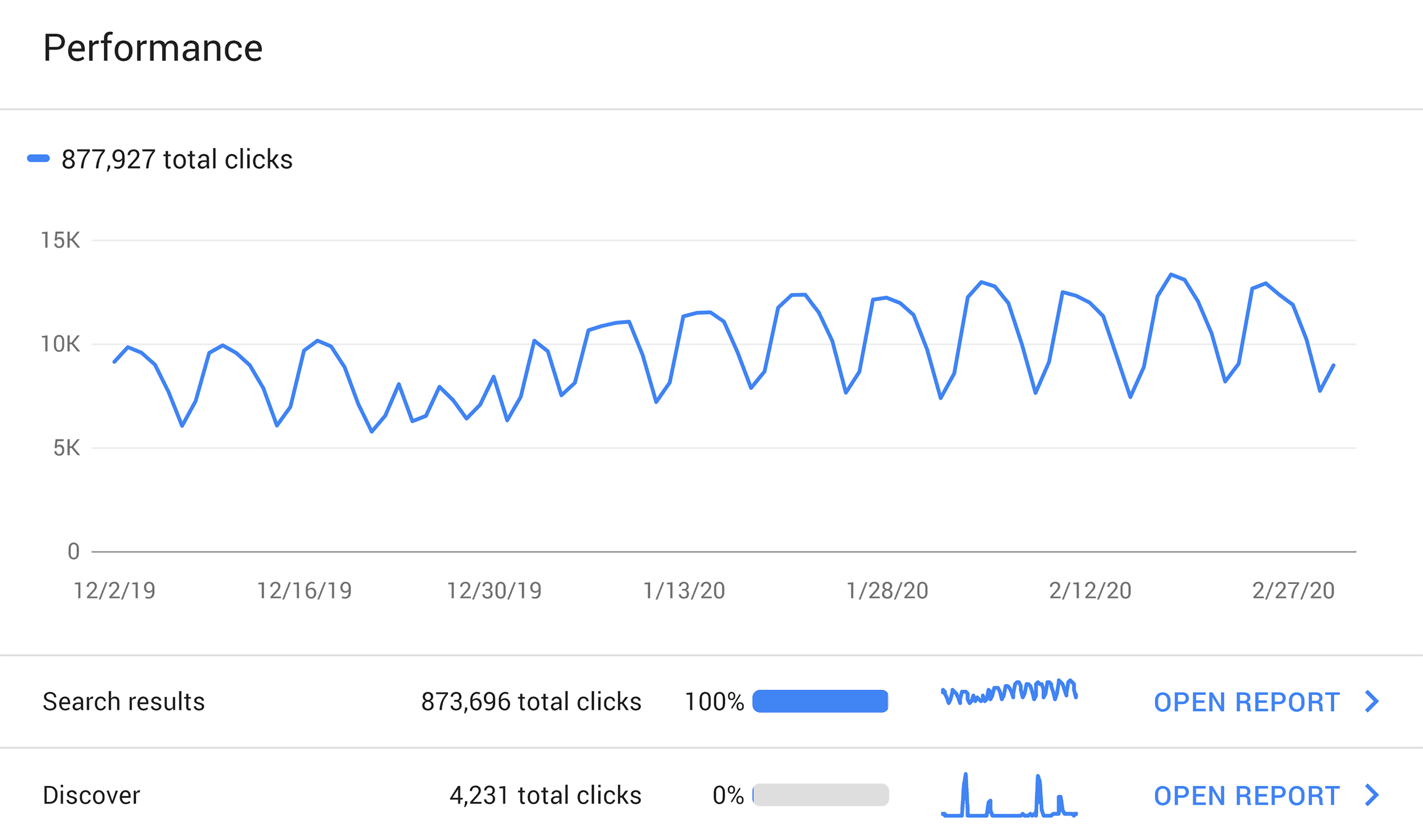
This report shows you the terms that bring in the most clicks from Google search.
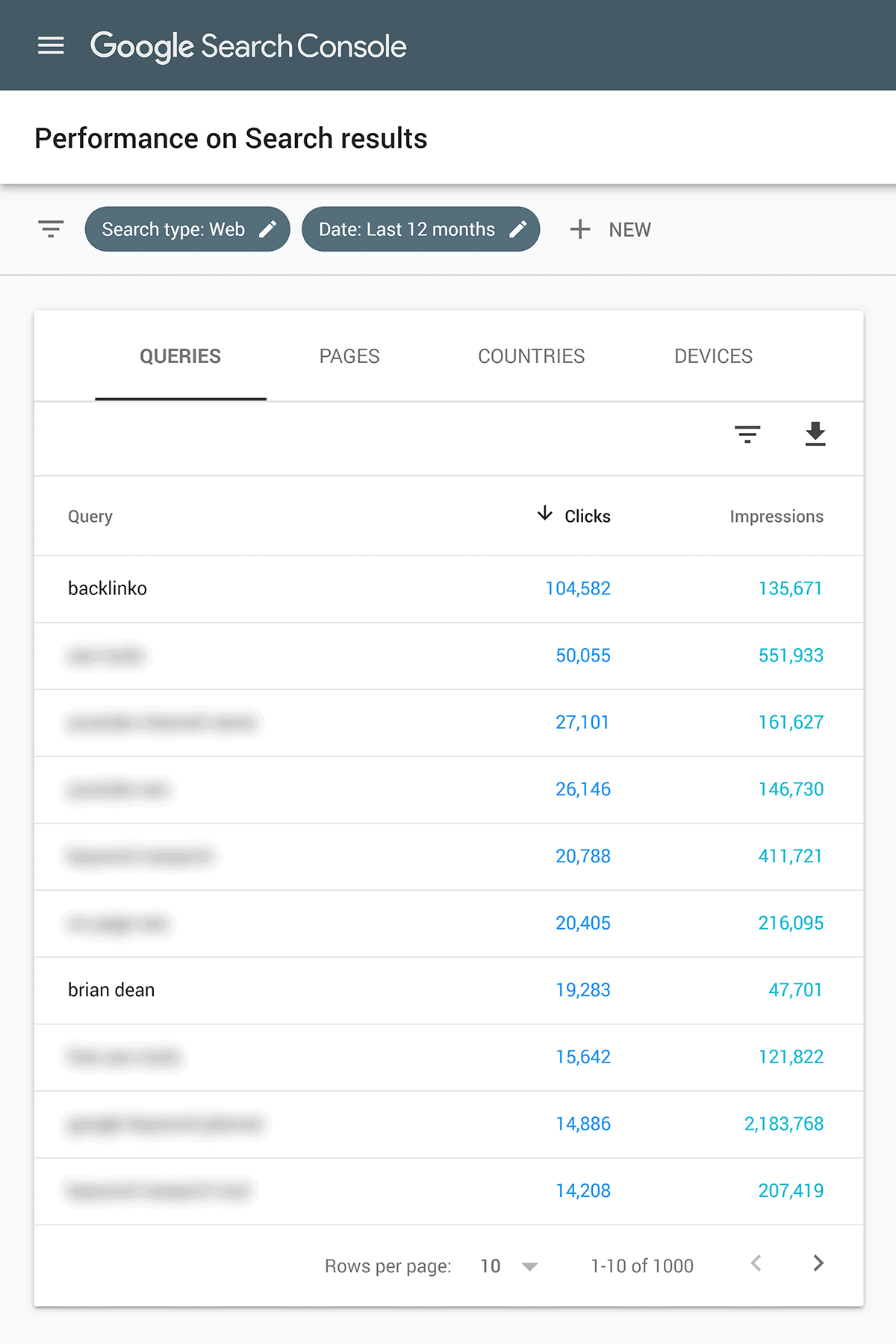
Then, sort the list by “Impressions”.
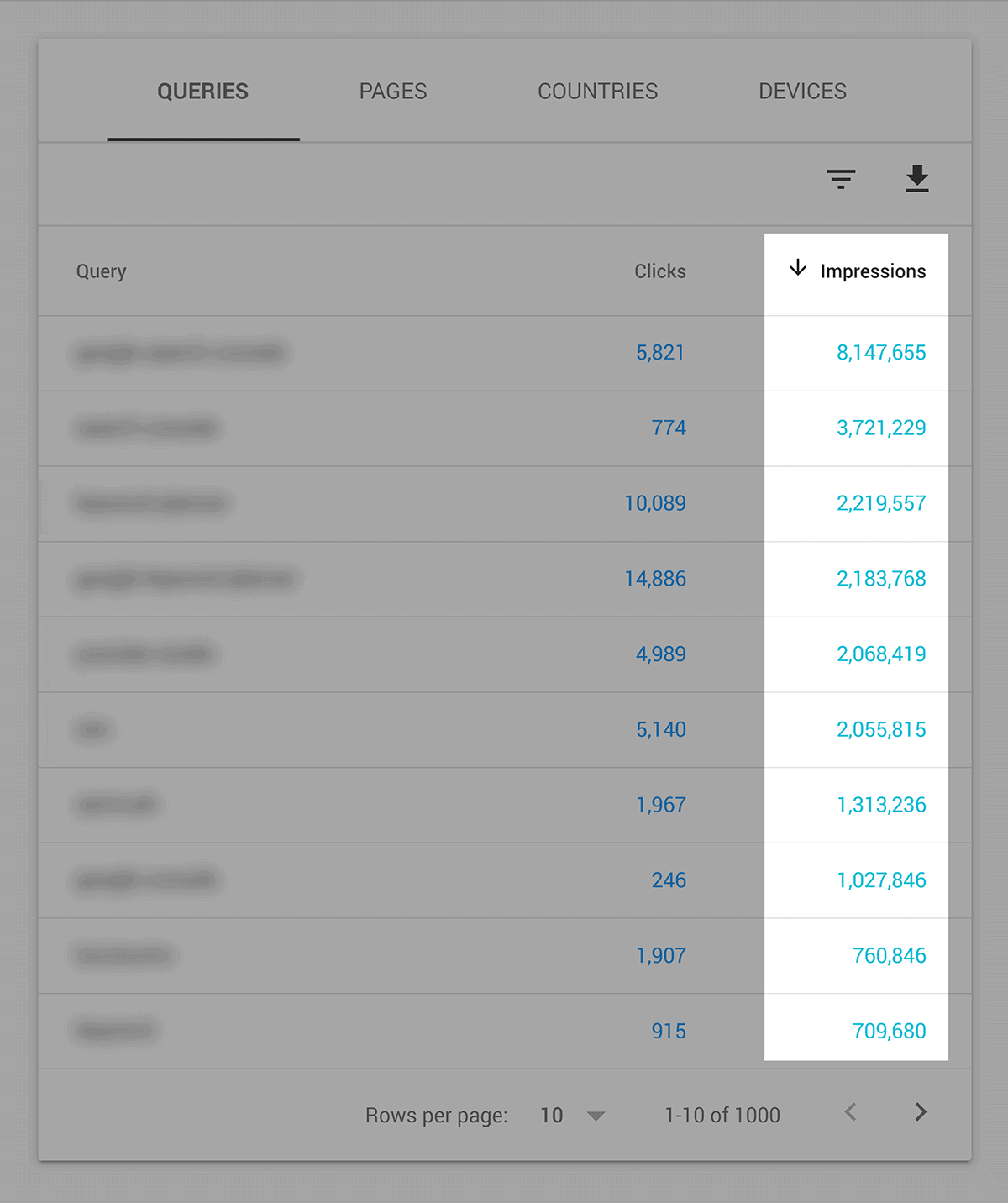
This shows you keywords that get lots of impressions… but not necessarily clicks.
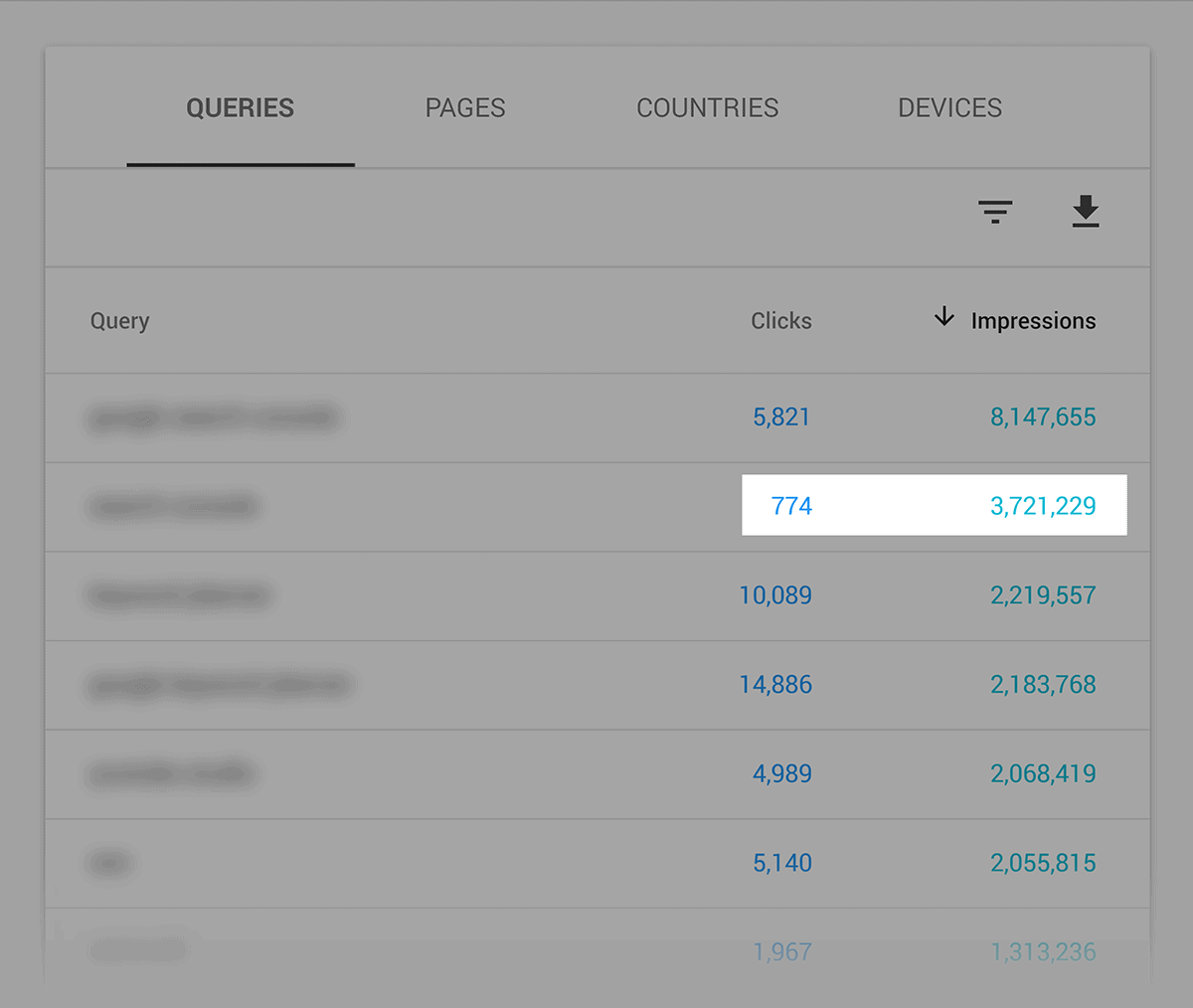
Finally, create a piece of content optimized around that same keyword.
Why is this a powerful strategy?
These are keywords that you KNOW people are searching for. You also know that Google sees your site as a good fit in the search results.
You just need to publish content that’s super focused on that specific keyword (or optimize a piece of existing content around that keyword) and you’re set.
Optimize Content around Synonyms and Related Keywords
Yes, you want to optimize your page around your main keyword.
But don’t stop there.
You can get even more search engine traffic to your page by optimizing it around synonyms and closely related terms.
I’ll show you how this works with a real life example.
Some time ago I published this post on my blog.
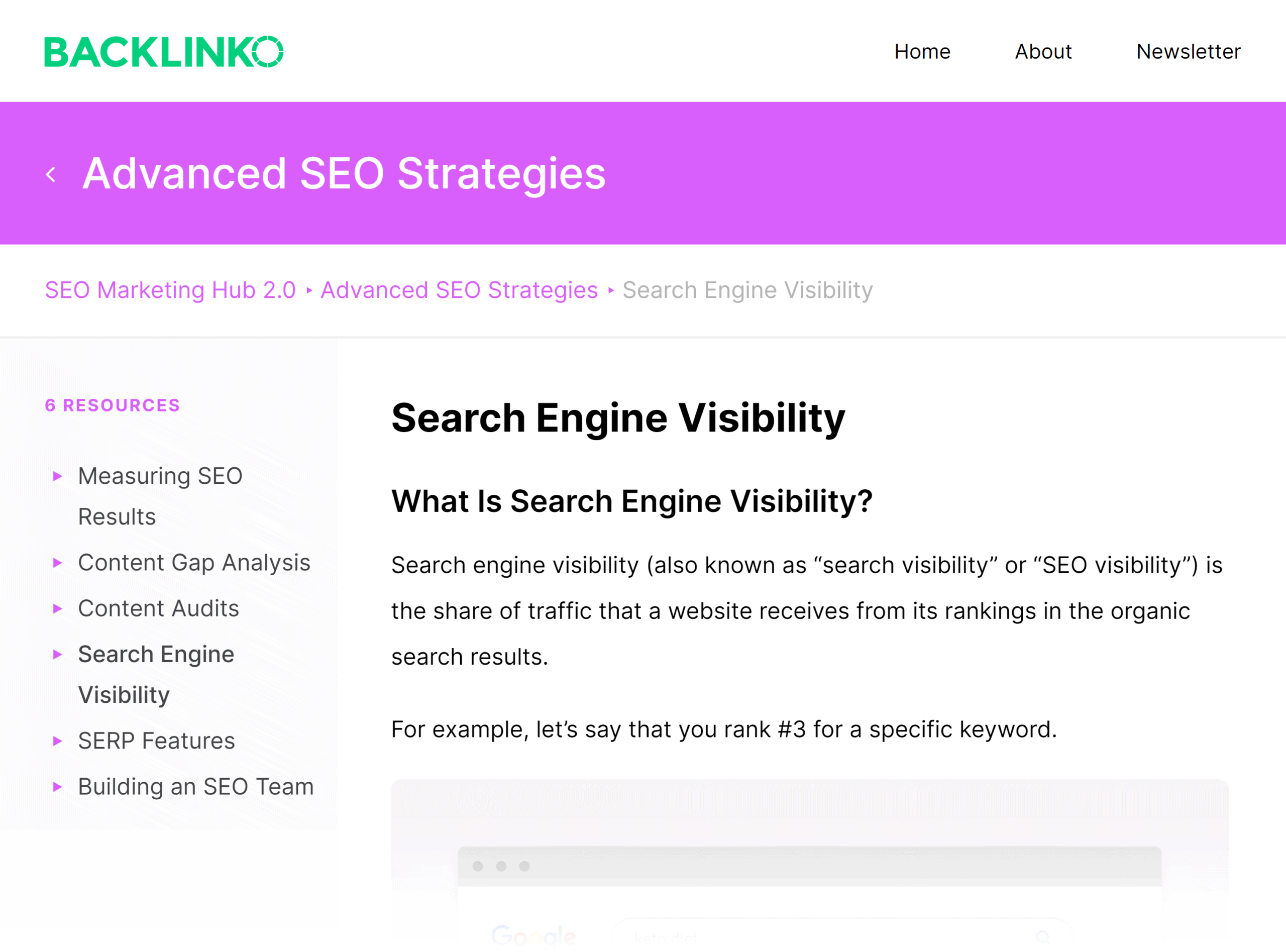
As you can probably guess, my target keyword for that page is: “search engine visibility”.
But I also made sure to sprinkle in variations of that keyword, like: “SEO visibility”.
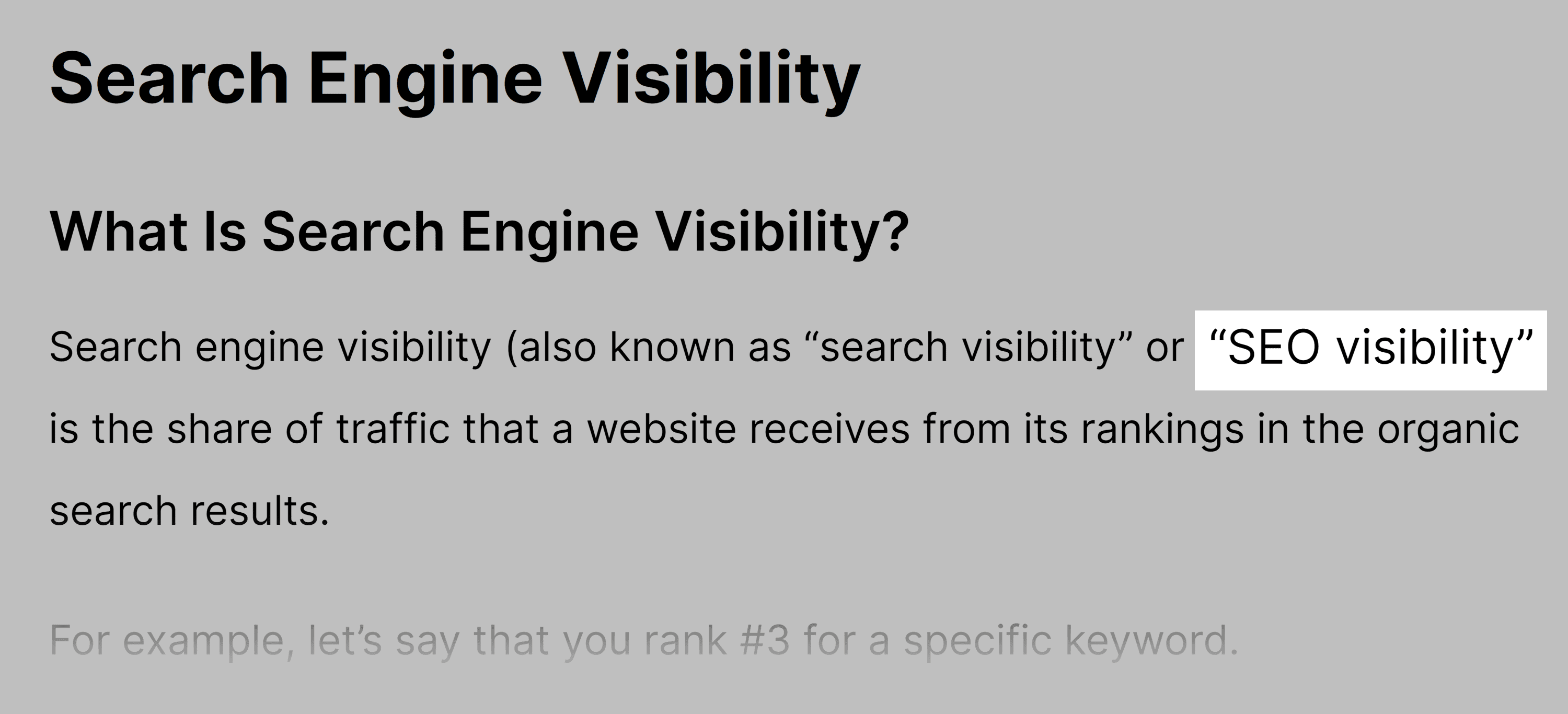
In the end, I was able to rank #1 for my main keyword…
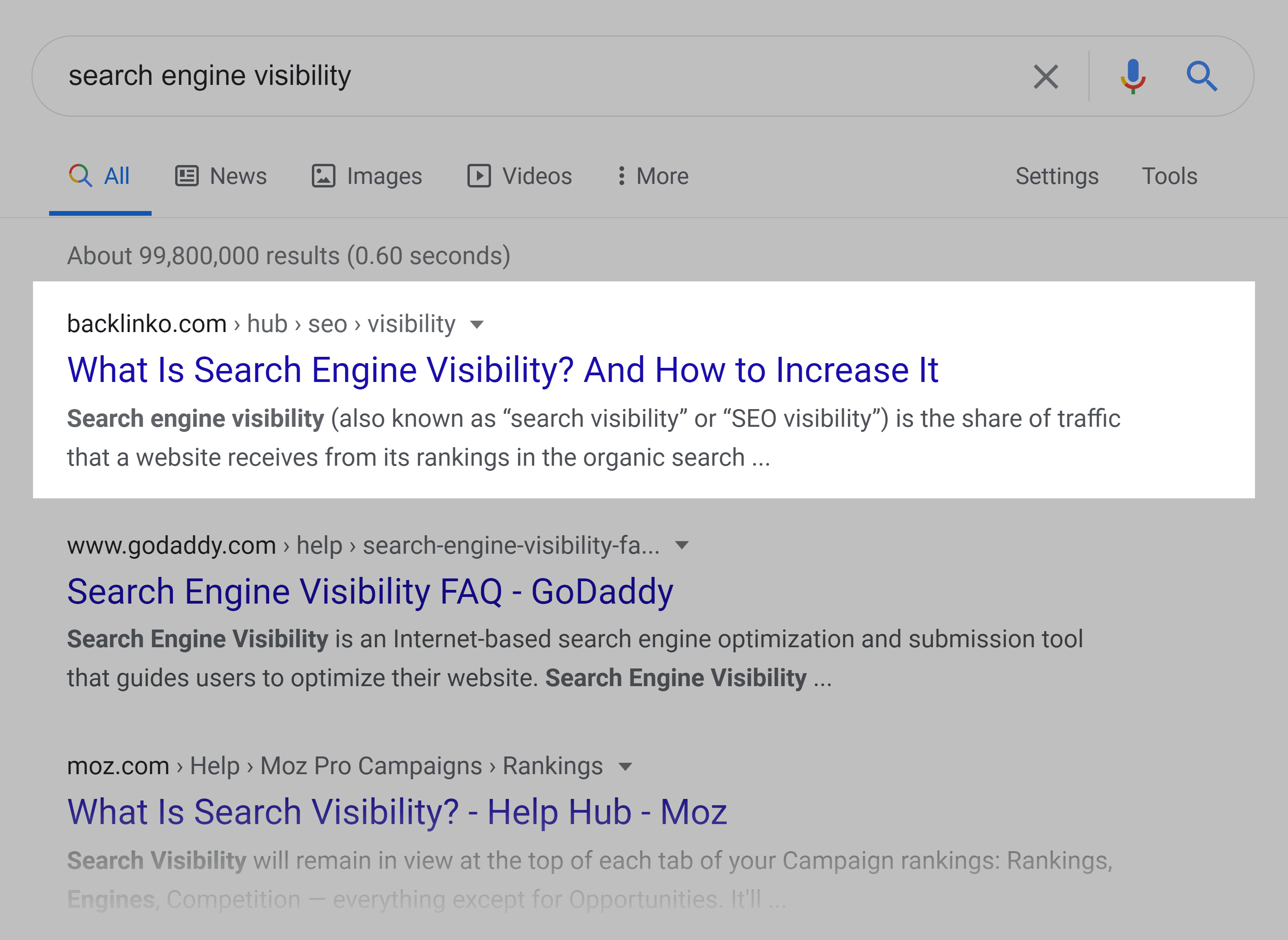
…and lots of keyword variations.
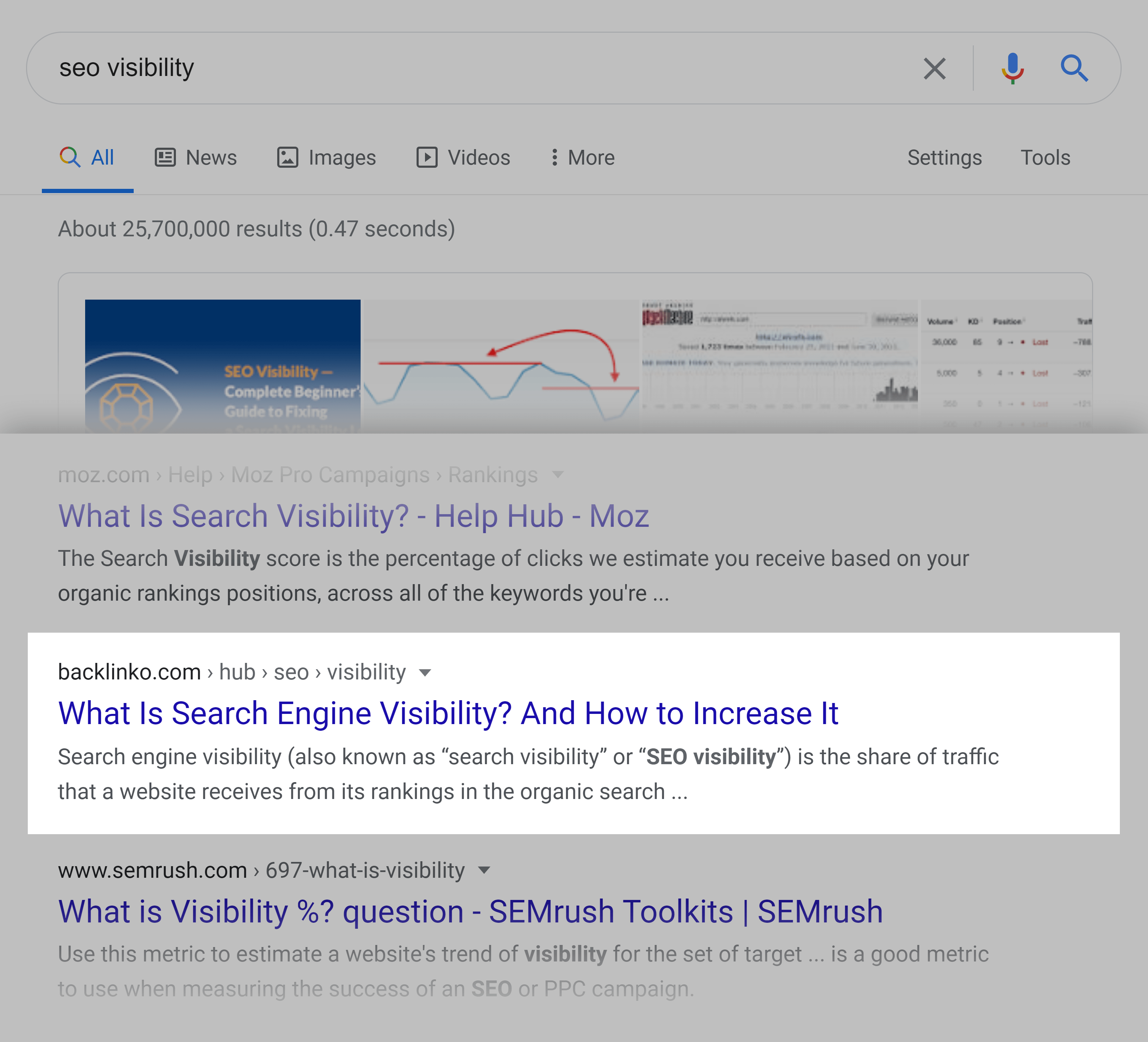
Ahrefs Content Gap
Content Gap has quickly become one of my favorite features in Ahrefs.
Just like with Semrush, you can use Ahrefs to see the exact keywords another site ranks for.
And with Ahrefs Content Gap, you can take this type of competitor keyword analysis to the next level.
Head over to Ahrefs content gap. And put in 2-3 competing sites.
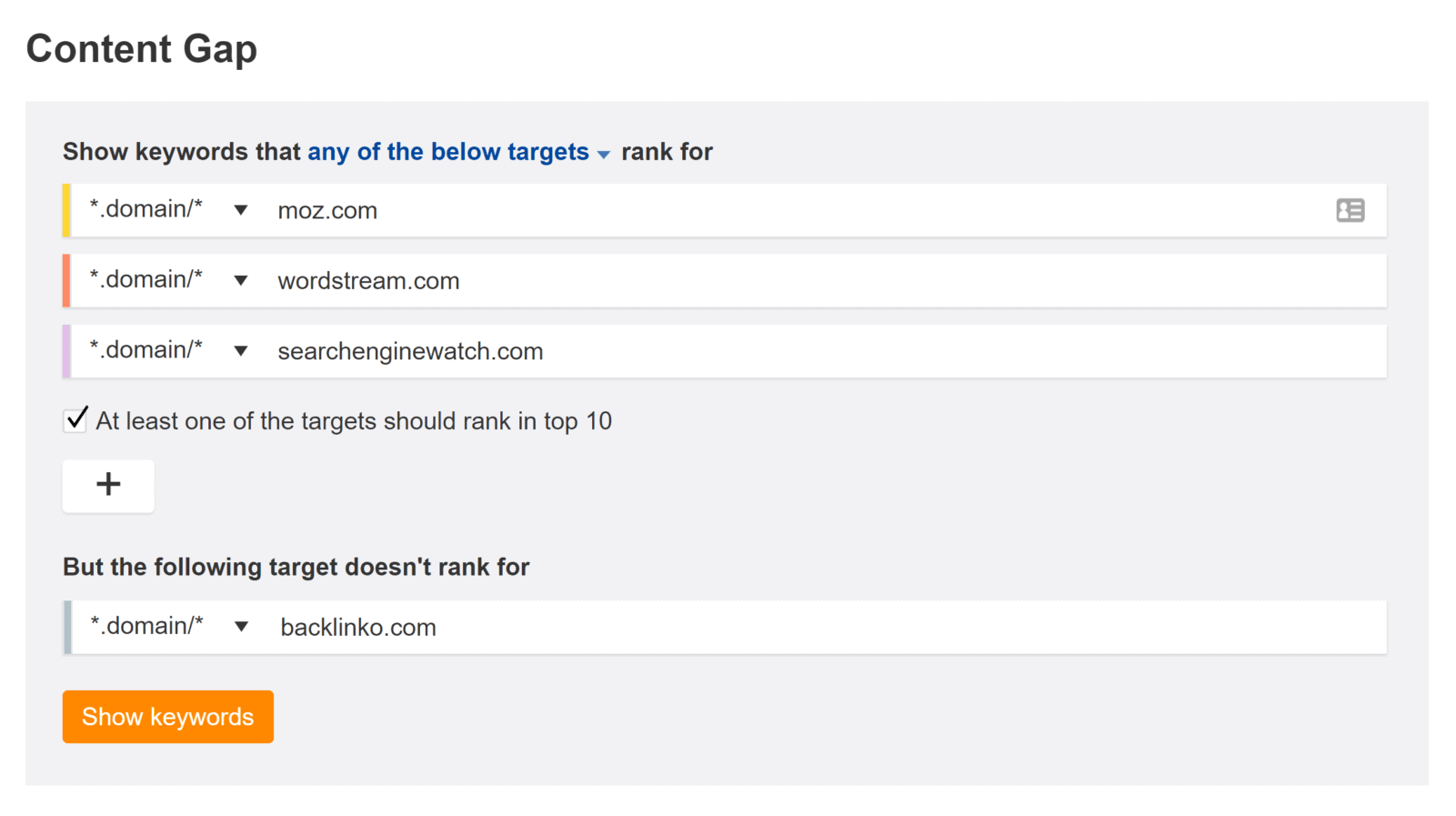
This will show you keywords that at least 2 of your competitors rank for… but you don’t.
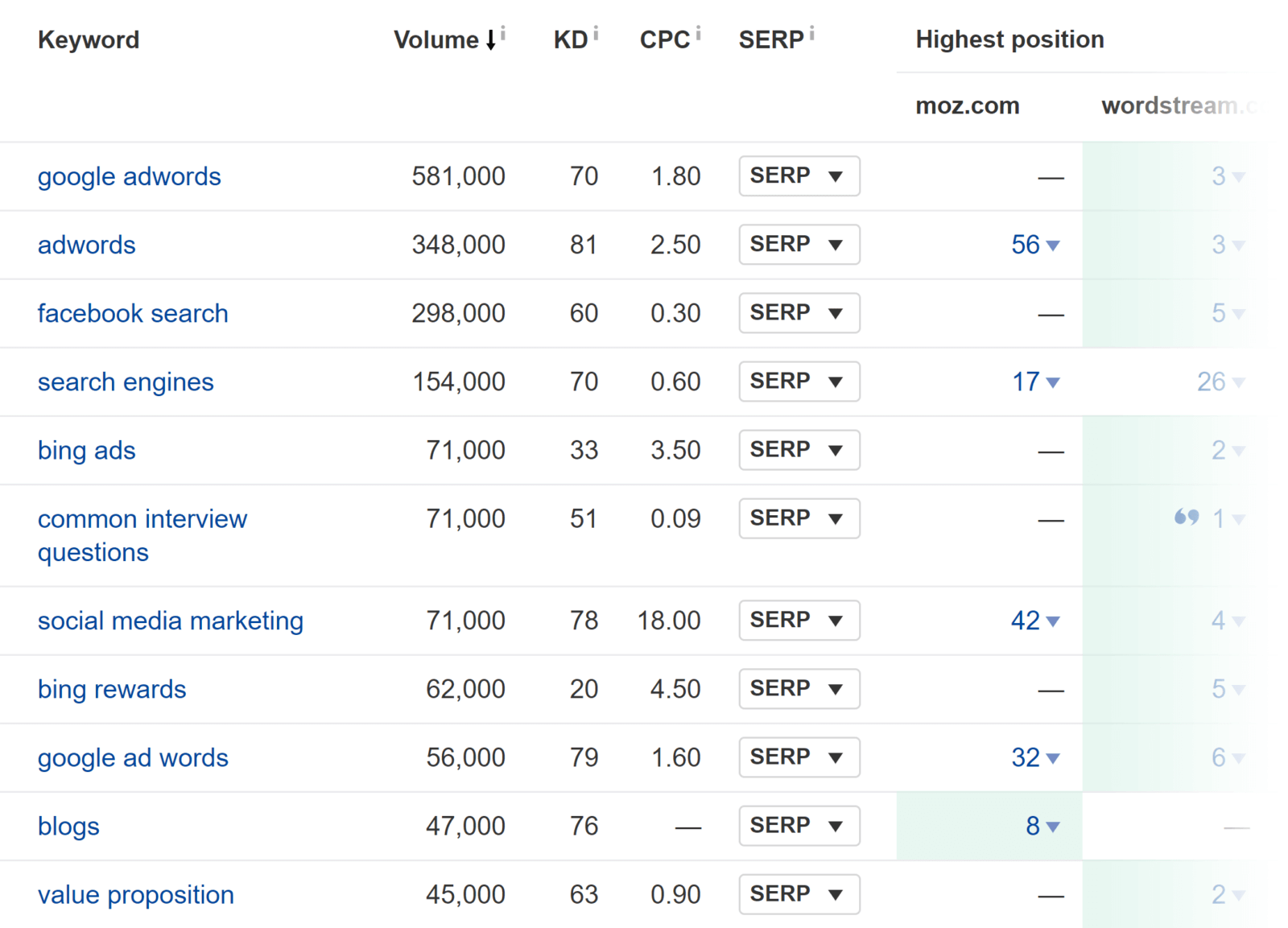
And because multiple competitors rank for these terms, you know that you also have a good chance of cracking the top 10.
Analyze Keywords Based on Searcher Intent
In other words, ask yourself:
What does someone searching for this keyword want to see?
Are they looking to buy? For information? Or are they looking for a specific page (like a login page)?
A while back I created a post that ranks #2 for the keyword “BuzzStream”.
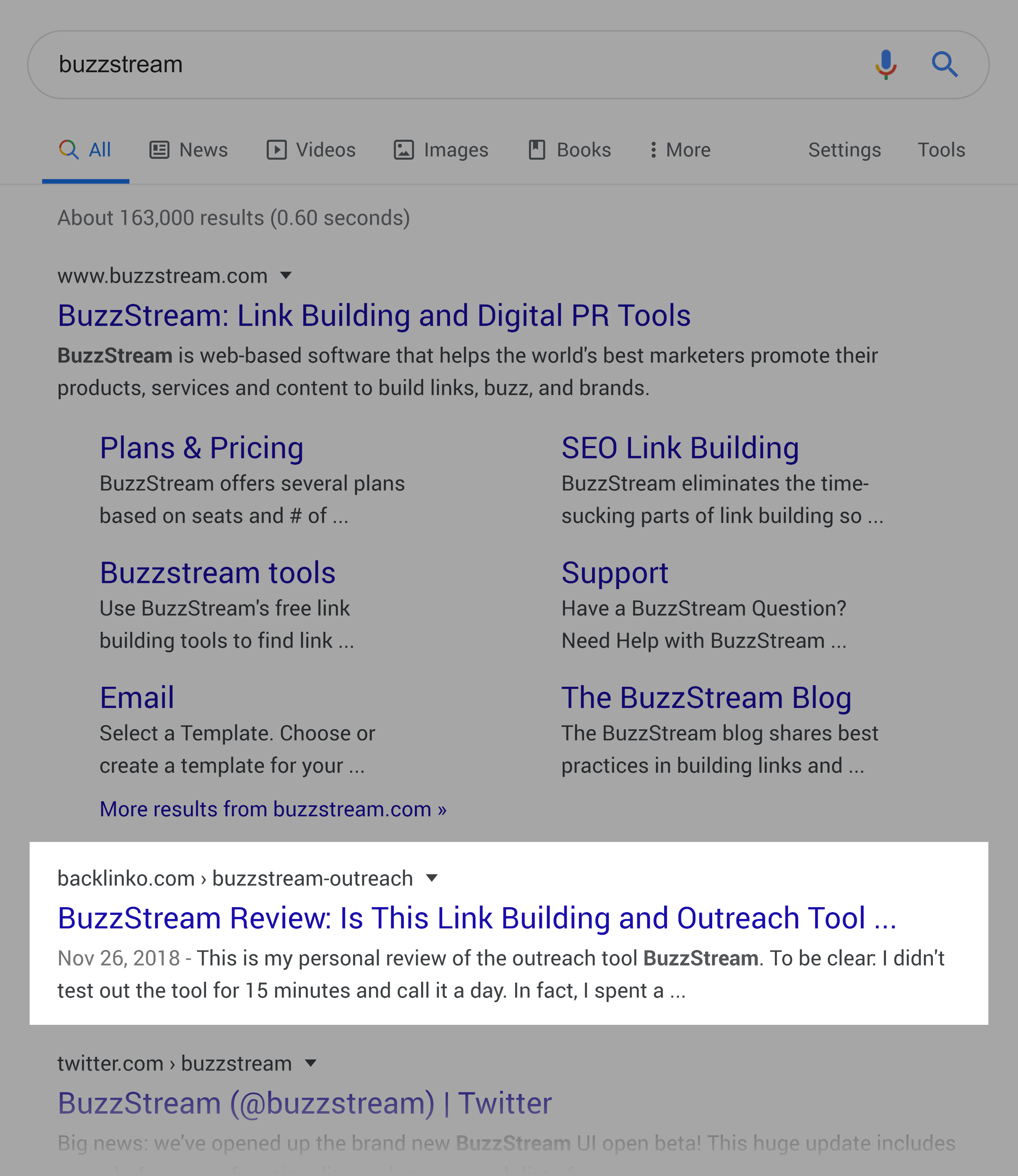
Even though that keyword gets around 2k searches/month, that post only brings in 194 monthly visitors.

What gives?
Well, as it turns out, “BuzzStream” is a navigational keyword.
Which means that most people that search for that keyword are looking for the website… not information about BuzzStream.
So yeah, that keyword looked great at first glance. But because it’s a navigational keyword, VERY few people click on anything but the first result. Which is why that post gets so little traffic.
That’s why I recommend looking at the Search Intent of a keyword.
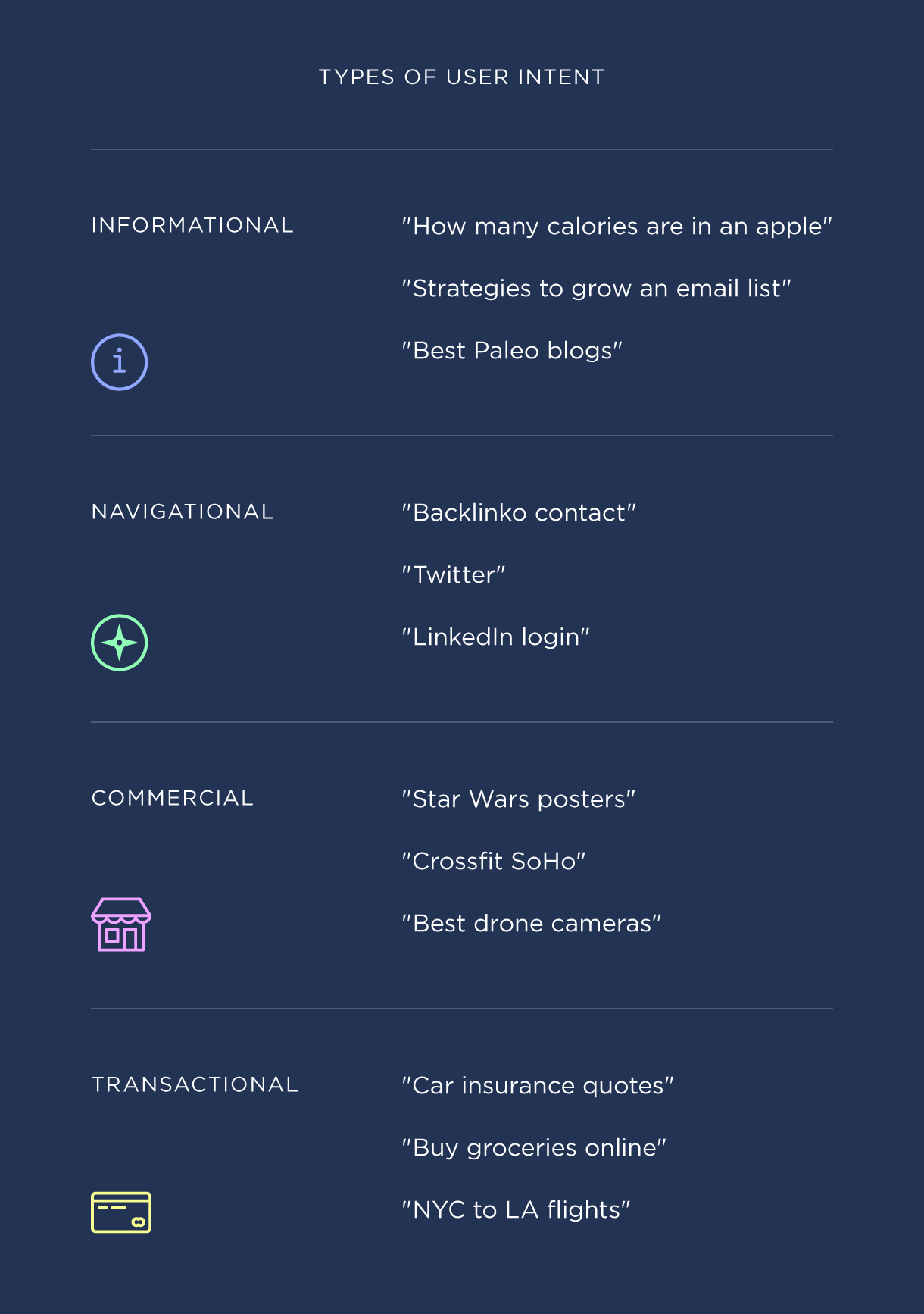
If Search Intent is “Navigational”, then you may want to avoid that term… even if it has great CPC and monthly search volume numbers.
(As you just saw, this is a lesson I had to learn the hard way)
But if Searcher Intent is “Informational”, then a piece of content optimized around that term could do GREAT.
Find “Shoulder Keywords”
Most people ONLY optimize their site around keywords that are very closely related to what they sell.
And it’s a BIG mistake for two main reasons:
1. Product keywords are usually super competitive. 2. There are thousands of keywords that your potential customer searches for when they’re not searching for what you sell.
And if you can get in front of your customer with an awesome piece of content, they’re SUPER likely to buy from you down the road.
For example, like I mentioned earlier, I run an SEO training company.
But I don’t optimize every page on my site around commercial terms.
(Like “SEO training” and “SEO courses”).
Instead, I rank for keywords that my customers search for when they’re not looking for SEO training.
(Keywords like: “link building”, “on-page SEO” and “SEO Tools”).
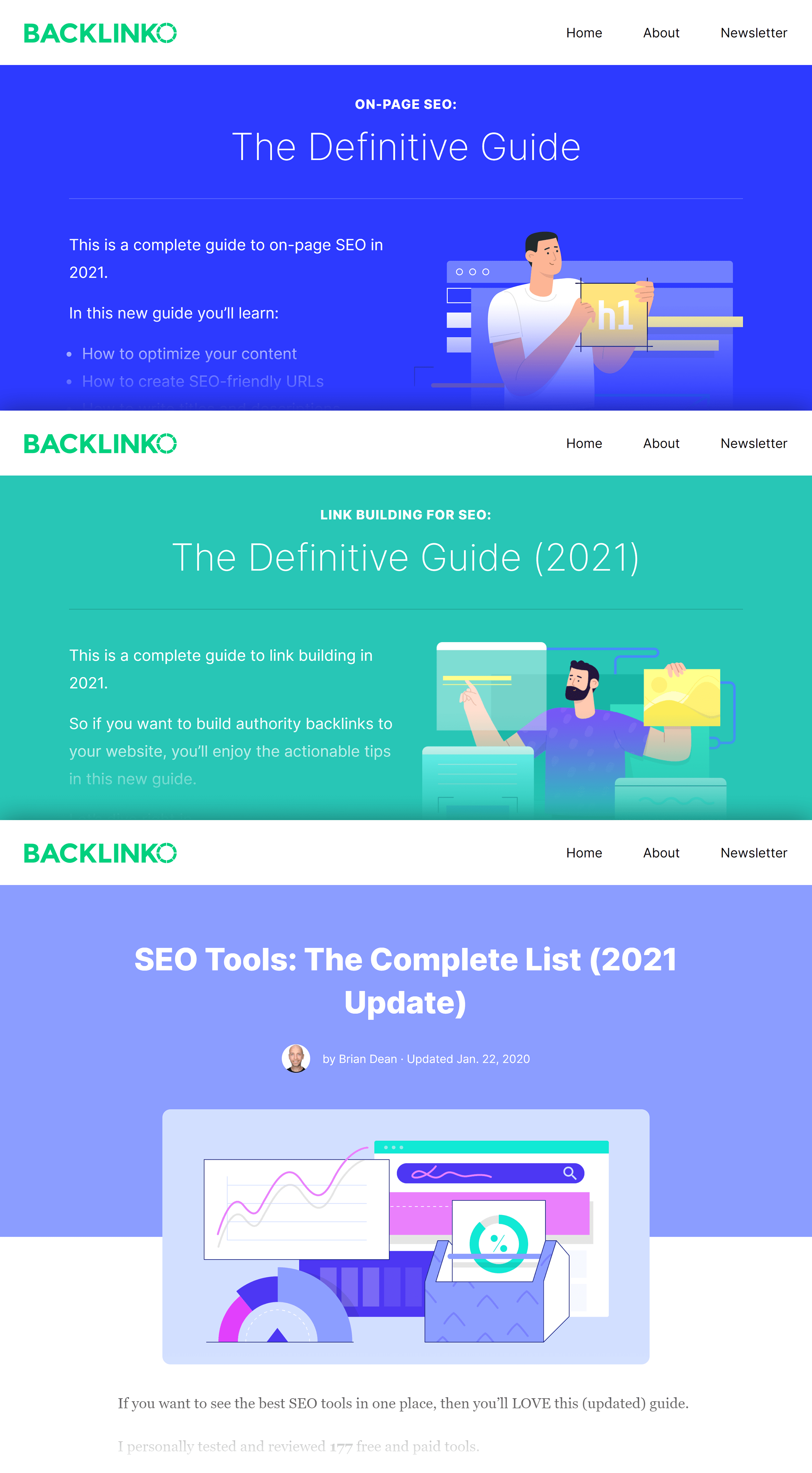
I call these keywords “Shoulder Keywords”.
These keywords aren’t directly related to what you sell. But they’re keywords that your customers search for. Which makes them worth going after.
How about another example?
Let’s say you run an eCommerce site that sells basketball hoops.
Obviously, you’d want to optimize some of your pages around terms like “buy basketball hoops online”.
After all, someone interested in buying a basketball hoop may also search for:
- How to shoot a better free throw
- Slam dunk highlights
- How to get recruited by college scouts
- Nutrition for basketball players
- How to improve a vertical jump
So you’d want to create content around these “Shoulder Keywords” too.
Now It's Your Turn

I really hope you enjoyed my new keyword research guide.
And now I’d like to hear from you.
Which tip from today’s guide are you going to try first?
Are you going to try Shoulder Keywords?
Or maybe you want to optimize around trending keywords.
Either way, let me know by leaving a quick comment below.
WOWZA! Someone was reading my mind. I was just trying to search your site for keyword research and all of a sudden get an email with exactly what I needed.
As usual, thanks Brian!
You’re not alone, Ashley: keyword research is something a lot of my readers ask me about. I hope you enjoy the guide.
Hi Brian, I love these guides. Besides the graphics which I assume are custom built, is there something special you use to create the general layout of these? The change in colors, etc. just make these really clear to read – would love to replicate that kind of flow.
Thanks as always!
Thanks Jake. That’s right: this guide is custom designed and coded. So we built the layout from scratch so that our guides would be super easy to read and skim through.
Thanks a million Brian. I love your guides, they are informative and hilarious too. Great work.
Brian this is great advice and content. Usually I un-subscribe from some of those ‘other’ email lists – but after visiting your site I can’t wait for the next update! Thanks for your help and advice.
Thanks Mike. Happy to have you as a subscriber.
Great and informative content. Brian, thanks for your excellent keyword research guide.
You’re welcome, Idris.
Absolutely love this guide, it will be something that I can use as a constant reference in the future if I ever need to double check on something, and that convenience is much appreciated 🙂
No worries, Daniel. Happy to help.
And the reason you gave this away for free is…jk. Kick ass guide Brian. Much more valuable than some of the paid guides. Would be sweet if you could package this up into a printable PDF.
Thank you, Matt. I’ll look into getting the new guide put into a PDF.
Looking good – love the design and everything! You’ve done it again, Brian Dean!
Brian, thanks for that. I agree: I’m really happy with how the design turned out.
The word is often overused – but not in this case – this is ‘awesome’ Brian!
Ha! I’m actually laughing out loud right now at just how good this content is.
Folks – this is why Brian is the best in the business when it comes to SEO.
Great stuff man!
Thanks Loz!
Brian, I say this without any bias – every bit of content you provide is Gold. Have been hooked on Backlinko ever since I stumbled here not so long ago 🙂
Great Work!
Hey Zak, thank you. I appreciate that 👍👍👍
Argh the sharing toolbar is destroying the article on my iPad. Can’t read anything on the left.
Thanks for the heads up, Steve. Fixed.
Would you consider offering your guides as single pages or pdfs? I prefer reading longer form content like this when offline/on the road. If on a single page, I can easily Pocket them to read offline. Thanks for considering!
Hey Daniel, we usually add PDF versions to each guide eventually. But it can take some time.
If you are reading on your laptop then simply press the ctrl+s button you have to see the save option to save this. And if you using your phone then open the Chrome browser and you have to see three-dot at the top-right corner, click on that and you see the download button and click on that and download the amazing article.
Awesome write up Brian. Thanks a lot for taking the time to write this and share it with us.
You’re welcome, Mark. I’m glad you enjoyed it.
Brian, you killed it (again) with this article. I have to admit, I opt out of almost all newsletters but from the ones I keep, yours is the only one with a CTR of 100% for me. Keep up the awesome work and thank you so much!
Thanks Volker 👍 👍 👍
Great guide. Sharing with my colleagues in the department now.
Thanks James.
Hi Brian, I think is going be very difficult to make a better content than you period… You are Rock 🙂 Thanks Claude
Thanks Claude. I appreciate that.
This is the best email in my inbox this morning! Great surprise. Wow you’ve been busy crafting another SEO goodie. Shoulder keywords make for easy blog post ideas. I like this guide. Great job Brian.
Hi Jennifer, happy to hear that. For sure: Shoulder keywords are kind of an underrated approach. Of course we all want to rank for keywords that are about our products (“Buy X”). But the fact is, most of the traffic out there is for informational keywords (like “how to X”). And if your content impresses the pants off of people, you can turn that traffic into leads and sales.
I am pretty certain I will be feasting on this article for days if not weeks to come! I can’t thank you and your team enough for the incredible knowledge and insight.
Hey Eric, you’re welcome. This is basically everything I’ve learned about keyword research over the last few years.
Another awesome content. Thank you, Mr. Brian, to share with us. Cheers!
Definitely something I was looking into. Thanks for another great, lengthy, informative and useful post Brian!
You’re welcome, Darshana.
Awesome stuff as usual Brian!
Thanks Davis. Like all of our guides, a ton of work went into this one.
Somehow you always seem to hit me with the right content at the right time 🙂 Thanks for being an inspiration over the years. /Rued
You’re welcome, Rued. I’ve got more cool stuff on the way.
In-depth guide about keywords research. Specially about the keywords to be chosen for new and old websites
Expanding on your keywords using Google Search Console has led us to driving double the amount of clicks so great info there.
Plus effective frequency in ranking in youtube, linkedin articles and other platforms is key because they drive referral traffic back to your page also and this massively helps ranking.
Great guide Brian!!
Thanks James. Nice. Yeah, that Google Search Console strategy is awesome because it’s Google telling you: “we think your site would be a good fit for that keyword”. No 3rd party tool can do that.
I would like to add a tool for finding keyword difficulty – Kwfinder. I have been using this tool since the start of my career and I can say that it provides the most trustable data.
Best Regards, Himanshu Tyagi Founder, CodeItBro
Thanks Himanshu. I actually have the Mangools suite on my tools that I need to check out. I used KWFinder back in the day but haven’t used it in a year or so.
Get your email in the middle of night on GMT+7
Thanks for your sharing Its helpfull
And my i ask I get nothing in email while im trying to join waiting list SEO Course via seothatworks.com
Im also already cek spam/junk And still get nothing
Thanks again for your sharing.
Sorry for bad english and grammar Im indonesian
You’re welcome, Helmi. Re: the waiting list email. If you email support@backlinko someone will look into that for you.
Your email just hit my inbox Brian, I took a look at the size of your post and thought “how do you do it?” haha. I’ve just skim read it because a full read will mean settling in later this evening when there’s more time. One thing that stood out though was how well you have laid this all out, I’m not a huge fan of ultimate guides because they’re bulky but I can already tell that the way you have broken this down into easy to read chunks coupled with nice graphics and illustrated examples means so much (and I’ve not even got to how well you do your research yet LOL). Cheers Graham
Hey Grahman, thanks man! That’s actually how I write these guides. I don’t set out to make them this long post full of random information. I outline each one into discrete chunks. That way, everything it easy to read and skim. Plus, I don’t go off into tangents about this and that. The outline means that I have to stick to the script 🙂
Absolutely great for beginner and expert. I really like your way of keyword research. Thanks for sharing.
You’re welcome, Jose.
Hello sir, excellent article and it did showed me some new tips because I was struggling to find Keyword for a particular topic.
Nice. Glad to hear that.
Amazing, have you actually ever published something that did not look so wonderful. Really you always make all my stuff look drab and boring. Although I have to do it myself, being small but hope to have good looking content like some day, when I am rich and famous like you. Thanks for all the help you give us
Hey Timothy, Thank you. If I had to do this myself I can’t imagine how bad this would look! Guides like this are a true team effort. Thankfully I’m not in charge of the design, LOL. But seriously, it takes a designer and talented developer to make our guides look as great as they do. I just write up a Google Doc and the team takes care of the rest.
cool, now we know the rest of the story
Wonderful guide put up so nicely!
Thanks for new updated keyword research guide for 2020, and especially thanks for Wikipedia strategy
You’re welcome, Rahul.
Great content as always 😉 Content gap tool in Ahrefs is lately one of my favourite place to find new keywords. I usually find there keyword that I would never think of.
Looking forward to your next guide.
Hey Karol, you’re welcome. Have you tried their “link intersect” feature. It’s similar to that but for backlinks.
if you write like this articles one day Google will kidnap you.
Amazing article Brian thanks for taking keyword research to the next level.
you will be #1 for “keyword research” in Google
I hope so. Moz is currently #1 so it won’t be easy to hit the #1 spot.
Great stuff, Brian, as usual! Very smart nuggets that are both actionable & consumable!
Hi Melissa, thank you! I tried to make this guide super actionable (outside of some of the background info in Chapter 1). Glad to hear that I hit the mark.
I start to read your guide and keep reading word by words, this is an awesome piece of content and very helpful for me. Thank You- “Brain”
You’re welcome, Arif.
Thanks, Brian for such a brief but clear keyword research guide. I have a question regarding keyword research. For some keywords, I find a lot of business directories, review sites ranking, but the intent is clear commercial. Can I rank using those keywords?
You’re welcome, Manoj. If there are some results that aren’t directories and review sites, you might. But if it’s literally 9/10 or 10/10, then I’d go with the flow and try to create a page that’s aligned with what’s already ranking.
Ever since I stumbled on your site while searching for “On-site SEO” I’m glued at the level of content you share for free.
Maybe I should ask, what’s your research strategy? Because I do wonder how on earth you dig up these valuable details.
Great one Brian!
Thanks Montfort. My research strategy is more or less “Document. Don’t create”. I talk more about that here .
Excellent. I’m already digesting it.
Awesome again!
This information is exactly what I am looking for to make my SEO more effective. There is so much information for me to digest. Thanks again.
You’re welcome, Henry. With guides like these, chunking is super important. So I try to make it so it’s not a giant wall of info. But more like an SNES strategy guide.
This is a really solid guide. I already knew a few of these tricks… but sometimes you forget about all the SEO tricks you’ve previously learned, and it’s great to get a refresher or reminder 🙂 For example, the GSC opportunities tactic of looking at impressions and then finding opportunities. I think I’ll use that one shortly! Thanks for the reminder on this one!
You’re welcome, Doug. Nice! Yeah, the GSC has a lot of untapped features. If you haven’t seen it already, I’d check out my giant guide to the Google Search Console here https://backlinko.com/google-search-console .
Great content as usual. While reading this post I came across some new tool like Canirank that I will surely start to use for my next keyword research. Really love this guide Mr. Brian.
Thanks for this article.
Hi Rupam, no problem.
Hi Brian, Thanks again. I’m going to visit Wikipedia right now 😉 I personally find it hard to start with the lower keywords competition. But in the longterm it is the way to go for a new website. (Mental note to myself)
Hi Guido, you’re welcome. For sure. I even think there’s a place for low-competition keywords for older + established websites. I’m finding with Backlinko that it still takes a while to rank for anything competitive (although I do usually rank eventually!). But low competition terms can rank within weeks.
Brian this is massive, very detailed and useful to both newbies and experts. Kudos
You’re welcome, Arnold. I tried to tackle some of the beginner-level stuff in Chapter 1. That way, I could focus on more advanced strategies later on in the guide.
Hi Brian. Great content always.
Brian could you please help me on one issue.
What is the reason of website down in google search now a days?
I mean my website was on 1st page in 6-7 months before, but today it is going back and appears on around page 8-9. I am making quality backlinks and doing proper one-page seo. But still nothing happened.
Could you please tell me what should I do ?
Thanks Hermant. That’s a tough thing to diagnose. It could be an update, penalty, a technical SEO issue. It’s hard to say without really digging into your Google Analytics and GSC. That said, one thing I’d look at is if your entire site dropped or just a few pages. Sometimes focusing on pages that did and didn’t get hit can help you figure things out.
My First main competitive keyword was on first page 6-7 months before. which was related to my website home page.
My second Low competitive keyword is coming on 1st rank on first page, which is also related to my Home page.
But I am surprise that my second keyword is on 1st rank but still my website didn’t get even a single click in one month. I checked impression in GSC of that keyword, which is more than 200. And my website not get even single click.
This is horrible thing is happened with me. My all other competitor websites title and description is 90% same.
I am really worried about this type of critical issue in my website ranking. I am sharing my website on social site, building quality backlink, proper on-page SEO, writing content on website, etc. But still not getting any good response.
I also checked Manual Action or penalty by google in GSC. Fortunately my website not penalize.
Could you please give me some steps which I should check according to your experience ?
And could you please make any blog or video related to Google Analytics – Complete Guide 🙂
A super helpful guide, Brian. I’m using CanIRank for a few weeks and found it amazing in keyword research (suggestions and ideas).
Nice! Yeah, it’s a cool little tool. I like that it has a standard keyword difficulty score. But also takes your own site’s authority into account.
Thanks so much for this!
Search results question:
If I see a competitive search term that does NOT have any videos ranking on the first page…is that an opportunity to make a video and get it to rank there? As in, there just AREN’T any videos for the term to rank
Seeing no video results means that Google is just not going to show videos for that particular search term?
You’re welcome, Amanda. It’s definitely “Seeing no video results means that Google is just not going to show videos for that particular search term?”. In my experience, if there’s no video, Google doesn’t see video as a good fit for that keyword. Of course, that can change over time. But I try to focus on keywords that already have videos in the search results.
Great help – thanks!
Brain, I am blown away with the expert detail you put into your articles and the amount of quality content you give away for free. I have learned so much from your work, please keep it up!
Hey Rick, thanks man! I appreciate that. I’ll definitely keep it up. We have some cool stuff on the way.
Thank you for such a lovely post brian dean. I must follow your tips
You’re welcome, Ankush.
Do you have an SEO agency? If not, can you recommend a couple?
Hi Michael, I don’t have an agency. Backlinko is an online training company that sells online courses.
Definitely useful information which I will use developing my new website.
Hi Sergy, great. Let me know if you have any questions.
Great read Brian, surely helps when you’re working for an SEO agency doing keyword research for pitches day in and day out.
HA! AS someone that used to run an agency, I can 100% relate to that.
I am almost following you since you were explained a Skyscraper Technique & learned from you that no one is perfect to initiate, experience makes us perfect.
I keep my close view on your strategy from video, text content to graphics & keep on following them for my clients as & when needed.
Thank you for supporting & sharing your experiences to improve my experience. Just by following you I am motivated & left the JOB to started my own business & initiated everything last month.
Although, this is just a beginning a day will come with the help of mentors like you & Neil.
Keep it up & help us to share your knowledge
You’re welcome, Ahmed. Congrats on the new business!
Leave a Comment
- Do Not Sell My Personal Info
- ⋅
- On-Page SEO
How To Find Competitors’ Keywords: Tips & Tools
Discover how to find competitor keywords & gain a competitive edge in SEO. Outperform your competitors in SERPs with effective targeting.

This post was sponsored by SE Ranking. The opinions expressed in this article are the sponsor’s own.
Wondering why your competitors rank higher than you?
The secret to your competitors’ SEO success might be as simple as targeting the appropriate keywords .
Since these keywords are successful for your competitors, there’s a good chance they could be valuable for you as well.
In this article, we’ll explore the most effective yet simple ways to find competitors’ keywords so that you can guide your own SEO strategy and potentially outperform your competitors in SERPs.
Benefits Of Competitor Keyword Analysis
Competitor keywords are the search terms your competitors target within their content to rank high in SERPs, either organically or through paid ads.
Collecting search terms that your competitors rely on can help you:
1. Identify & Close Keyword Gaps.
The list of high-ranking keywords driving traffic to your competitors may include valuable search terms you’re currently missing out on.
To close these keyword gaps, you can either optimize your existing content with these keywords or use them as inspiration for creating new content with high traffic potential.
2. Adapt To Market Trends & Customer Needs.
You may notice a shift in the keywords your competitors optimize content for. This could be a sign that market trends or customer expectations are changing.
Keep track of these keywords to jump on emerging trends and align your content strategy accordingly.
3. Enhance Visibility & Rankings.
Analyzing your competitors’ high-ranking keywords and pages can help you identify their winning patterns (e.g., content format, user intent focus, update frequency, etc).
Study what works for your rivals (and why) to learn how to adapt these tactics to your website and achieve higher SERP positions.
How To Identify Your Competitors’ Keywords
There are many ways to find keywords used by competitors within their content. Let’s weigh the pros and cons of the most popular options.
Use SE Ranking
SE Ranking is a complete toolkit that delivers unique data insights. These insights help SEO pros build and maintain successful SEO campaigns.
Here’s the list of pros that the platform offers for agency and in-house SEO professionals:
- Huge databases. SE Ranking has one of the web’s largest keyword databases. It features over 5 billion keywords across 188 regions. Also, the number of keywords in their database is constantly growing, with a 30% increase in 2024 compared to the previous year.
- Reliable data. SE Ranking collects keyword data, analyzes it, and computes core SEO metrics directly from its proprietary algorithm. The platform also relies on AI-powered traffic estimations that have up to a 100% match with GSC data.
Thanks to SE Ranking’s recent major data quality update , the platform boasts even fresher and more accurate information on backlinks and referring domains (both new and lost).
As a result, by considering the website’s backlink profile, authority, and SERP competitiveness, SE Ranking now makes highly accurate calculations of keyword difficulty. This makes it easy to see how likely your own website or page is to rank at the top of the SERPs for a particular query.
- Broad feature set. Beyond conducting competitive (& keyword) research, you can also use this tool to track keyword rankings, perform website audits, handle all aspects of on-page optimization, manage local SEO campaigns, optimize your content for search, and much more.
- Great value for money. The tool offers premium features with generous data limits at a fair price. This eliminates the need to choose between functionality and affordability.
Let’s now review how to use SE Ranking to discover the keywords your competitors are targeting for both organic search and paid advertising.
First, open the Competitive Research Tool and input your competitor’s domain name into the search bar. Select a region and click Analyze to initiate analysis of this website.
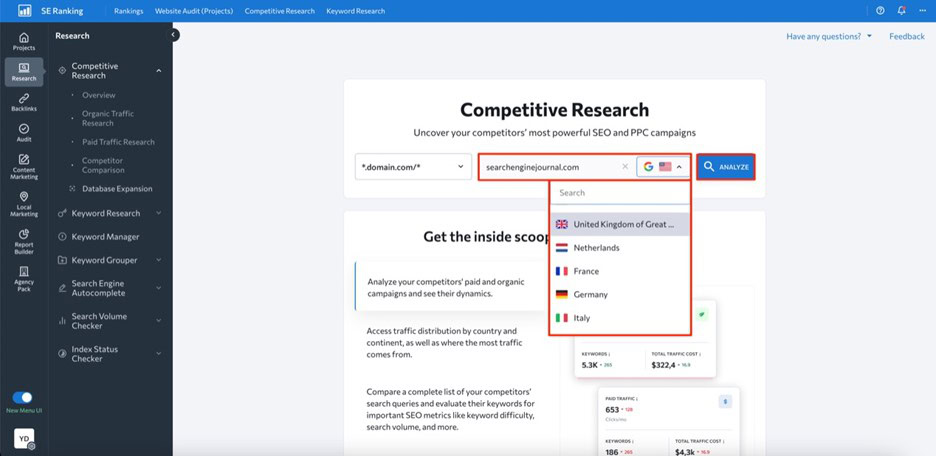
Depending on your goal, go either to the Organic Traffic Research or Paid Traffic Research tab on the left-hand navigation menu.
Here, you’ll be able to see data on estimated organic clicks, total number of keywords, traffic cost, and backlinks.
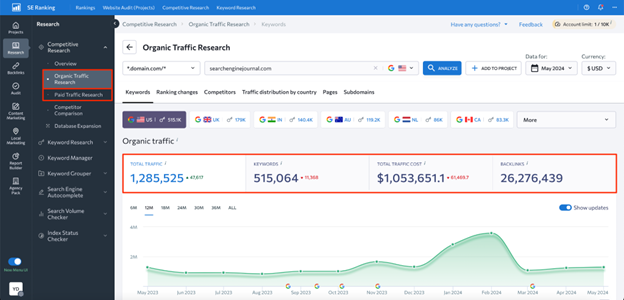
Upon scrolling this page down, you’ll see a table with all the keywords the website ranks for, along with data on search volume, keyword difficulty, user intent, SERP features triggered by keywords, ranking position, URLs ranking for the analyzed keyword, and more.
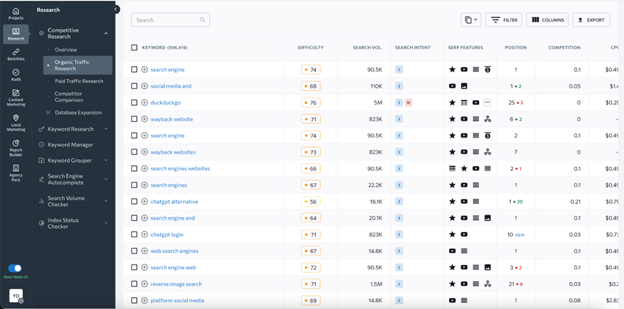
What’s more, the tool allows you to find keywords your competitors rank for but you don’t.
To do this, head to the Competitor Comparison tab and add up to two websites for comparison.
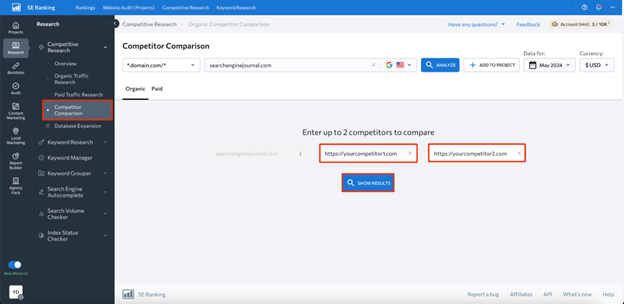
Within the Missing tab, you’ll be able to see existing keyword gaps.
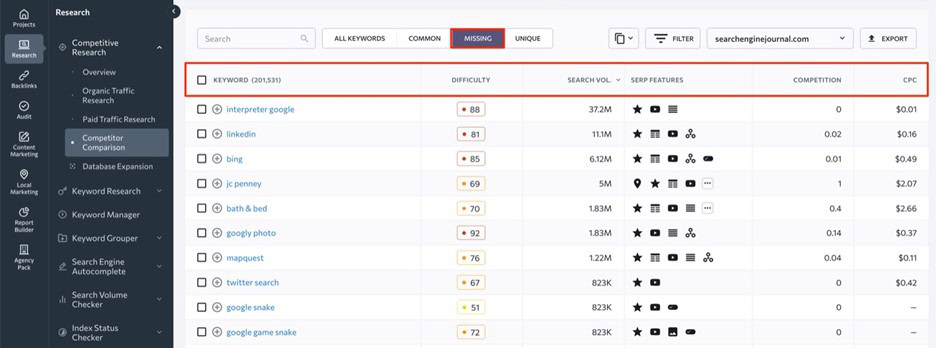
While the platform offers many benefits, there are also some downsides to be aware of, such as:
- Higher-priced plans are required for some features. For instance, historical data on keywords is only available to Pro and Business plan users.
- Data is limited to Google only. SE Ranking’s Competitor Research Tool only provides data for Google.
Use Google Keyword Planner
Google Keyword Planner is a free Google service, which you can use to find competitors’ paid keywords.
Here’s the list of benefits this tool offers in terms of competitive keyword analysis:
- Free access. Keyword Planner is completely free to use, which makes it a great option for SEO newbies and businesses with limited budgets.
- Core keyword data. The tool shows core SEO metrics like search volume, competition, and suggested bid prices for each identified keyword.
- Keyword categorization. Keyword Planner allows you to organize keywords into different groups, which may be helpful for creating targeted ad campaigns.
- Historical data. The tool has four years of historical data available.
Once you log into your Google Ads account , navigate to the Tools section and select Keyword Planner .
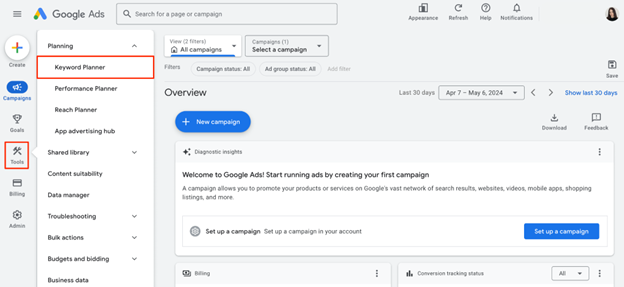
Now, click on the Discover new keywords option.
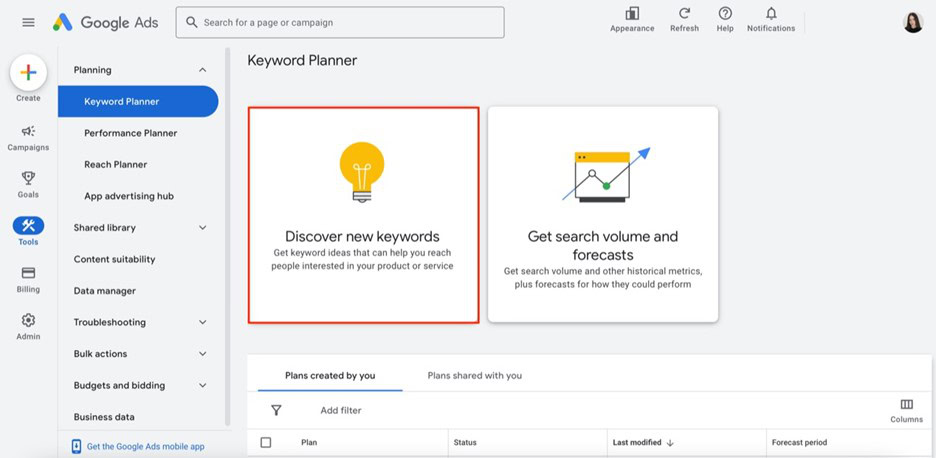
Choose Start with a website option, enter your competitor’s website domain, region, and language, then choose to analyze the whole site (recommended for deeper insights) or a specific URL.
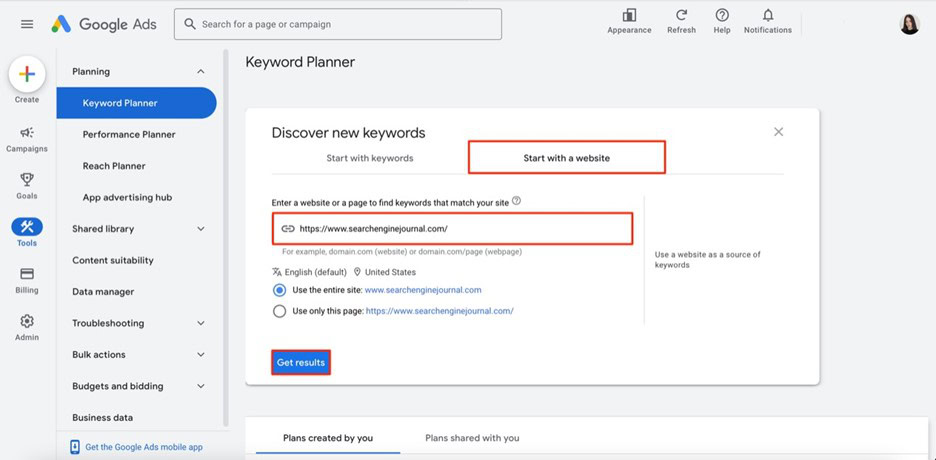
And there you have it — a table with all keywords that your analyzed website uses in its Google Ads campaigns.
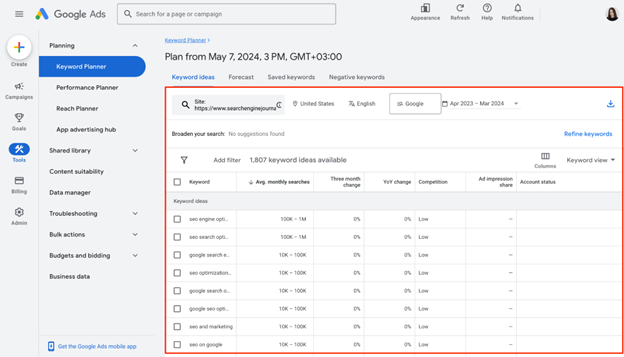
Although Keyword Planner can be helpful, it’s not the most effective and data-rich tool for finding competitors’ keywords. Its main drawbacks are the following:
- No organic data. The tool offers data on paid keywords, which is mainly suitable for advertising campaigns.
- Broad search volume data. Since it’s displayed in ranges rather than exact numbers, it might be difficult to precisely assess the demand for identified keywords.
- No keyword gap feature. Using this tool, you cannot compare your and your competitors’ keywords side-by-side and, therefore, find missing keyword options.
So, if you want to access more reliable and in-depth data on competitors’ keywords, you’ll most likely need to consider other dedicated SEO tools.
SpyFu is a comprehensive SEO and PPC analysis tool created with the idea of “spying” on competitors.
Its main pros in terms of competitor keyword analysis are the following:
- Database with 10+ years of historical data. Although available only in a Professional plan, SpyFu offers long-term insights to monitor industry trends and adapt accordingly.
- Keyword gap analysis. Using this tool, you can easily compare your keywords to those of your competitors using metrics like search volume, keyword difficulty, organic clicks, etc.
- Affordability. It’s suitable for businesses on a tight budget.
To explore competitor data, simply visit their website and enter your competitor’s domain in the search bar.
You’ll be presented with valuable insights into their SEO performance, from estimated traffic to the list of their top-performing pages and keywords. Navigate to the Top Keywords section and click the View All Organic Keywords button to see the search terms they rank for.
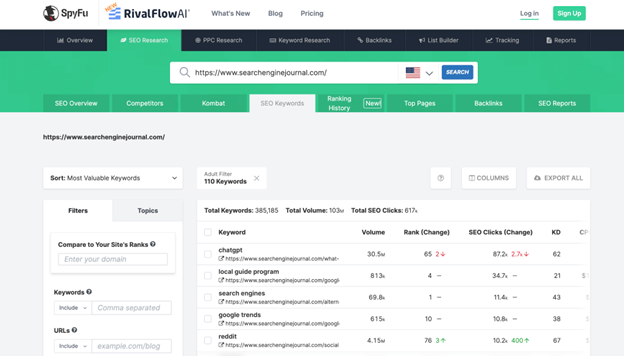
Yet, this free version provides an overview of just the top 5 keywords for a domain along with metrics like search volume, rank change, SEO clicks, and so on. To perform a more comprehensive analysis, you’ll need to upgrade to a paid plan.
When it comes to the tool’s cons, it would be worth mentioning:
- Keyword data may be outdated. On average, SpyFu updates data on keyword rankings once a month.
- Limited number of target regions. Keyword data is available for just 14 countries.
Wrapping Up
There’s no doubt that finding competitors’ keywords is a great way to optimize your own content strategy and outperform your rivals in SERPs.
By following the step-by-step instructions described in this article, we’re sure you’ll be able to find high-value keywords you haven’t considered before.
Ready to start optimizing your website? Sign up for SE Ranking and get the data you need to deliver great user experiences.
Image Credits
Featured Image: Image by SE Ranking. Used with permission.
SE Ranking is a powerful SEO platform for agencies and in-house teams with more than a million users worldwide. It ...
Subscribe To Our Newsletter.
Conquer your day with daily search marketing news.

IMAGES
VIDEO
COMMENTS
Without quality keywords, your research will end up in the academic abyss. In short, keywords: Produce precise search results. Save researchers time and effort as they search for material. Enhance discoverability (i.e., help others find your research fast). Ensure that your paper is properly categorized in databases.
🗝️ What Are Keywords in a Research Paper? Keywords are phrases and words that reflect a research papers' main ideas and topics. They help search engines and readers alike to quickly understand what the work is about. Such terms and phrases also allow researchers interested in your subject to promptly find your paper, share it, and cite it.
Keywords, also commonly called search terms, are the words that you enter into the database search boxes. They represent the main concepts of your research topic and are the words used in everyday life to describe the topic. Without the right keywords, you may have difficulty finding the articles that you need.
If your research involves a key method or technique, put the term either in your title or your keywords. On that note, be careful with spelling/capitalization. While search engines, by default, ignore capitalization rules, hyphenation could be an issue. Make sure you are using the officially recognized written form of each key term.
2. Keywords should ideally be phrases of 2-4 words; single word keywords are acceptable, but they may lead to many false matches. 3. Keywords should contain words and phrases that suggest what the topic is about. Also include words and phrases that are closely related to your topic. (For example, if the paper is about heart diseases, use words ...
Finding recent papers. Your search results are normally sorted by relevance, not by date. To find newer articles, try the following options in the left sidebar: ... Select the "Case law" option and do a keyword search over all jurisdictions. ... research groups, proteins, seminal breakthroughs, and other dimensions that are of interest to users ...
The best method is to create a search strategy using keywords. Begin by examining your research question to determine the major concepts or words with a specific meaning. These terms will form the basis of your search. When picking keywords avoid all minor words ("a," "an," or "the"), and prepositions or verb phrases ("on," "in," or "going to ...
Keyword Explorer is part of the entire Moz Pro SEO analytics platform. Improve the ROI of your content strategy with competitive intelligence and actionable recommendations. The World's most accurate SEO keyword research tool with over 1.25 billion traffic-driving keywords. Full keyword analysis with Ranking Keywords, Keyword Difficulty, Search ...
How to choose keywords in research papers. Choosing the right keywords in research papers is critical because the quality of online search results is directly related to the quality of the keywords used. A well-chosen keyword can help your paper get discovered, while a poorly chosen keyword can lead to your paper being overlooked.
General Insights Regarding Keywords in Research Papers. Number of keywords: Research papers typically include a list of 3-6 keywords, although some papers may have more or fewer. The specific number of keywords can vary based on the guidelines provided by the target journal or conference. Keyword density: There is no set rule for keyword ...
Keywords are a tool to help indexers and search engines find relevant papers. If database search engines can find your journal manuscript, readers will be able to find it too. This will increase the number of people reading your manuscript, and likely lead to more citations. However, to be effective, Keywords must be chosen carefully. They should:
Create a Research Topic. Enter your research topic below. Try to limit the topic to one sentence that fully describes your research. Here are a few examples: Effects of media on women's body image. Trends in information technology in the workplace. Fast food causes health risks for children. Your topic:
For example, suppose you use bitcoin.org as the seed site. In that case, you get some hyper-specific keyword ideas that you might easily overlook in "conventional" keyword research tools. 6. Google Search Console. Google Search Console (GSC) shows how your website performs for its top 1,000 keywords in organic search.
Keyword Research: An In-Depth Beginner's Guide. Keyword research is the foundation of search engine optimization. This guide covers what it is and how you should do keyword research. SEJ STAFF ...
There are several tools available for generating keywords for your research paper. These include: Google Keyword Planner - a free tool from Google that helps you find relevant keywords and phrases for your research paper. Keyword Tool - another free tool that generates keywords based on search queries from various search engines.
Discover keyword ideas, all day long. Find relevant keywords from our database of over 8 billion queries. Just enter up to ten words or phrases and choose from one of six keyword ideas reports. Fill your content calendar for weeks, months, or even years in minutes. Keywords that contain your seed in the order it's written.
Good For: Analyzing both Google and Amazon keywords. Best Feature: Ability to bulk upload up to 10,000 keywords. Free Plan: Free 7-day trial of any of the paid plans. The Sistrix "Toolbox" contains a simple keyword research tool. It enables you to retrieve volume data for keywords across search engines and Amazon.
1. Brainstorm "seed" keywords. Seed keywords are the starting point of your keyword research process. They define your niche and help you identify your competitors. Every keyword research tool asks for a seed keyword, which it then uses to generate a huge list of keyword ideas (more on that shortly).
Keywords are important words/concepts found in your research question or thesis. A quick and dirty way to pull keywords from a research question/thesis is to choose the most important nouns; all other words are irrelevant. Using keywords to search will always retrieve more results than phrases or sentences. Image source: Producer.
The best free keyword research tools at a glance. Best for. Standout feature. Free plan. Moz Keyword Explorer. An all-around solution. Keyword prioritization metrics. 10 queries per tool per month, with 1,000 keyword suggestions and 10 SERP analyses per query. Google Keyword Planner.
1. Informational queries: The searcher needs information, such as the name of a band or the height of the Empire State Building. If you're enjoying this chapter so far, be sure to check out the keyword research episode of our One-Hour Guide to SEO video series! Watch the video. 2.
Chapter 1: Keyword Research Basics. In this chapter, I'll cover the fundamentals of keyword research. First, you'll practically learn what keyword research is (and why it's important for SEO ). I'll also show you how keyword research helped grow my site's search engine traffic to 360k+ unique visitors per month.
WordStream's free keyword research tool is intended as a complementary tool to Google's keyword planner. Both tools allow you to search for keywords to add directly to your account. One advantage WordStream's keyword search tool has over Keyword Planner is the inclusion of concrete search volumes, rather than search volume ranges.
Definitions of Measures Associated with References, Cites, and Citations. Total References: Total number of references to other papers that have been resolved to date, for papers in the SSRN eLibrary. Total Citations: Total number of cites to papers in the SSRN eLibrary whose links have been resolved to date. Note: The links for the two pages containing a paper's References and Citation links ...
2. Adapt To Market Trends & Customer Needs. You may notice a shift in the keywords your competitors optimize content for. This could be a sign that market trends or customer expectations are ...